
Title: A Yankee in the Far East
Author: George Hoyt Allen
Illustrator: H. S. Weller
Release date: August 23, 2012 [eBook #40565]
Most recently updated: October 23, 2024
Language: English
Credits: Produced by Melissa McDaniel and the Online Distributed
Proofreading Team at http://www.pgdp.net
Transcriber's Note:
Obvious typographical errors have been corrected. Inconsistent spelling and hyphenation in the original document have been preserved.
On page 128, the sentence starting "I did not," may be missing words.

A YANKEE
IN
THE FAR EAST
BY
GEORGE HOYT ALLEN
Author of "It Tickled Him"
WITH ILLUSTRATIONS BY
H. S. WELLER

CLINTON, N. Y.
TRAVELOGUE-ART ASSOCIATION
INCORPORATED
1916
Copyright, 1914
By Travelogue-Art Association, Inc.
Copyright, 1915
By Travelogue-Art Association, Inc.
All rights reserved
Second Edition
To my Friend
J. Whitfield Hirst
| PAGE | ||
| Author's Preface | 1 | |
| I. | War Hell and Bull Fights | 7 |
| II. | "Missouri" and His False Teeth | 17 |
| III. | Wong Lee—The Human Bellows | 28 |
| IV. | Hawaii—and the Fisherman Who'd Sign the Pledge | 33 |
| V. | The Umpire Who Got a Job | 44 |
| VI. | The Japs' Five-Story Skyscraper and a Basement | 53 |
| VII. | Japanese Girls in American Clothes—They Mar the Landscape | 59 |
| VIII. | Ceremonious Grandmother—"Missouri" a "Heavenly Twin" | 64 |
| IX. | Ushi the Rikisha Man | 79 |
| X. | Missionaries, Tracts, and a Job Worth While | 91 |
| XI. | Yamamoto and High Cost of Living | 99 |
| XII. | The Soldier Said Something in Chinese | 103 |
| XIII. | Ten Thousand Tons on a Wheelbarrow and the Ananias Club | 114 |
| XIV. | "Missouri" Meets a Missionary | 120 |
| XV. | A Sto-o-rm at Sea | 133 |
| XVI. | The Islands "Discovered" by Dewey | 138 |
| XVII. | White Filipinos, Aguinaldo, and the Busy Moth | 147 |
| XVIII. | Singapore—The Humorist's Close Call | 156 |
| XIX. | The Hindu Guide a Saint Would Be | 168 |
| XX. | Penang—A Bird, the Female of Its Species, and the Mangosteen | 172 |
| XXI. | Burma and Buddha | 176 |
| XXII. | Baptists and Buddhism | 181 |
| XXIII. | The Rangoon Business Man Who Drove His Sermon Home | 185 |
| XXIV. | The Glass of Ice-Water That Jarred Rangoon | 188 |
| XXV. | The Calcutta Sacred Bull and His Twisted Tail | 194 |
| XXVI. | The Guide Who Wouldn't Sit in "Master's" Presence | 201 |
| XXVII. | Royalty vs. "Two Clucks and a Grunt" | 206 |
| XXVIII. | One Wink, Sixteen Cents, and Royalty | 210 |
| XXIX. | The Englishman and Mark Twain's Joke, "That's How They Wash in India" | 215 |
| XXX. | English as "She Is Spoke" in India | 223 |
| XXXI. | Five Days' Sail and a Measly Poem | 225 |
| XXXII. | Beating the Game With One Shirt | 240 |
| XXXIII. | Through Hell Gate Steerage | 257 |
| PAGE | |
I found myself jammed in with the cruelest, most blood-thirsty, cut-throat gang I've ever seen |
11 |
They tortured three yesterday, but I was more than satisfied with one, when I left them to their sport |
15 |
"You see, Mr. Allen, I got those teeth to please my wife" |
20 |
"When I didn't have them in my wife was giving me Hail Columbia" |
24 |
"With a mouthful of victuals I'd find myself chewing those false teeth with my other teeth" |
26 |
"Wong," I said, "how fashion you talkee so? |
29 |
My great fear was that before we landed at Yokohama Wong would surely burst in his efforts to keep the smoke in my state room blown out of the porthole |
31 |
I snitched it from a folder put out by the Hawaiian Promotion Society |
37 |
A fellow tied up that way can't come to the Hawaiian Islands to live |
39 |
Just one look at that fish and he'd yell and drop fish, line and pole right back in the pond |
41 |
You wouldn't expect to find any kickers in the Islands |
43 |
But I'll bet it would make it shy |
47 |
I won't say it would scare a locomotive off the tracks |
48 |
Author's illustration |
49 |
Believe me, that umpire could make anyone see |
51 |
They have the taxicab, but someone else had it during my three days' stay |
55 |
While you're working out the problem your car passes |
57 |
She is a part of the landscape that way. She fits in and makes me glad |
62 |
Pained! Grieved! Shocked! were too mild words. I was disappointed in "Missouri" |
65 |
"Lord, Mr. Allen, I'm glad to see you," he said, as the machine stopped |
67 |
We S.O.S.'d Yokohama for four hours with that saki house telephone |
73 |
That surely was some bow |
76 |
But Ushi's card had pulled a customer |
81 |
"Ushi, what for you mope? Didn't I make a deal with you last night to be my rikisha boy today? Hitch on behind and push, Ushi" |
87 |
With reckless abandon I had decided to blow myself for a whole dollar, and twenty-five cents for ten hours' horse and carriage hire |
88 |
That missionary seemed to exude tracts—I didn't know one missionary could hold so many |
93 |
Except potato bugs, I always want to poison them |
97 |
He said to have a foreigner as a guest at his humble home would bring around his house such a crowd of curious neighbors |
100 |
I felt a good deal better after what I'd said, and I think what the soldier said made a hit with him |
110 |
With a mighty bound I landed in that man's arms |
112 |
"Dr. 'Blank'," I said, "you're the one man in China I'm looking for. I have a warrant for your arrest" |
113 |
The chance acquaintances would cast significant glances and cough |
115 |
There are some Americans whom even a Shanghai wheelbarrow don't particularly interest |
121 |
"Women who are interested in foreign missions and preachers in our town set quite a store by me" |
123 |
"For about a minute, as I looked at what was in front of me, I couldn't think of anything but the two of diamonds" |
126 |
"Humph!" snorted "Missouri," "he said, 'You've probably gathered your information of the missionary work in the Far East from your bar-room associates'" |
129 |
As we jounced along over the bridge in front of our hotel on a Shanghai wheelbarrow |
131 |
Word has come to me that some of my readers are disappointed that I shied at a description of seasickness, but instead went off on a tangent about false teeth |
134 |
Astride the bowsprit, pen in hand, writing a sto-o-rm at sea |
137 |
Admiral George Dewey of the American Navy discovered these islands May 1st, 1898 |
140 |
I hit a prominent official in Washington for a free pass on a transport to the Philippines |
144 |
You cannot starve these people; they live in a land of perpetual summer |
148 |
There is not another city in Japan, China, or India that can equal it in cleanliness |
150 |
The chief industry of the owners of the shacks is to roost in them out of the sun and rain |
152 |
Ye gods! Tell a Singapore official to his face that you are going to shake the town! |
159 |
I swelled out my chest and swaggered away and thought I was funny |
161 |
The "funny man" gently lifted the derby from the dozing passenger's head and set his own sombrero in its place |
163 |
"And dommed if I didn't thank him twice when I should 'ave punched his 'ead" |
166 |
No matter what the hole you're in, there is a deeper one |
167 |
And now there is something to write about—the mangosteen |
174 |
Would be like going to Venice and not having your picture taken with the doves roosting all over you |
189 |
The only thing of note in the whole transaction is the boy's self-satisfied air of having done his whole duty |
192 |
She said: "I wish I were a flying fish, o'er ocean's sparkling waves to sail" |
195 |
"Twist his tail," I said, "that will start him" |
197 |
"You stay where you belong. I'll do the sacred bull business around this neck of the woods" |
199 |
Get that? Royalty, don't you know |
203 |
It's hard lines to pour out money in this way on Lal—but Royalty is expensive anyway |
205 |
"Of course I don't," I came back at him. "You stung me the last trip across India" |
208 |
Lal tells the string of porters to put "Master's" baggage into the compartment—no matter how much, put it all in, boxes, bags, bedding, and trunks |
212 |
The town turned out en masse to hear me talk |
216 |
The coffee began to boil in the church kitchen, the aroma floated through the auditorium |
218 |
That old joke about the English being slow is no joke—it's a sad fact |
220 |
And every time the Englishman has explained to me that he wasn't trying to break the stone |
221 |
Home loomed large in my mind—I wanted to go home |
226 |
Just like committing suicide |
229 |
He had been filled as full, if not fuller, than myself |
230 |
To write that invoice all over again * * * to get out of that was the determining factor |
233 |
With my teeth chattering with valor |
235 |
Anxiously watching specks in the horizon |
238 |
We do, on occasions, don it |
241 |
I've attended twenty-two "he" tea parties on this voyage |
245 |
No hope of being sunk before dinner |
247 |
I turned that shirt around |
248 |
I felt like a thief in that shirt |
251 |
With my jack-knife to rip and some puckering strings I went at it |
253 |
I turned that shirt upside down |
254 |
Also, I finally accepted his apology |
255 |
"You're a third-class passenger on this ship"—and further conversation with me seemed to give him a pain |
264 |
He swore like a pirate |
271 |
"It is hard when they loiter, isn't it?" |
274 |
And "Beef" came in |
279 |
And those pants did look bad. There was no doubt about that |
281 |
"If Mr. Allen says I have insulted women, he's a liar" |
284 |
There are so many ways suggested these days by the various periodicals on how to make money at home, it would seem that all ingenuity in that direction must be exhausted; but how to make money abroad seems to me to be almost a virgin field.
New pastures have always interested me, and if I can add to the sum of human happiness by a wise suggestion, and point the way to satisfy an almost universal longing to see the world,—for instance, if I can show how one can make a luxurious world tour and come out ahead of the game while doing it,—I shall be only too glad.
It's no new trick to beat one's way around the world with the hardships attending such an enterprise, but to tell how to do it in ease and luxury surely ought to earn me the gratitude of my fellow-men.
Get a bunch of pencils and some pads of paper and announce to a waiting editorial world that you are about to take a trip around the globe, and that you propose to write some letters of travel and syndicate them. That, for a consideration, you'll let some good papers print 'em. 2
Don't be modest about naming a good round price for the consideration of letting your papers in. Because you'll need the money.
All editors you'll find are hankering for letters of travel.
Letters of travel are a novelty. The first editor you call on early in the morning, say about ten o'clock (that's early enough to get to work in this new enterprise I'm tipping you off to—gone is grinding toil and worry—let others moil), this first editor of some big daily (big dailies are the easiest)—don't be timid—brace right up to him, and give him your proposition in a nutshell—easy-like—right off the bat.
It will be a pleasure to you to watch him brighten up at your offer.
Managing editors of big dailies are hard-worked men.
Atlas' job (merely physical) is easy compared with the mental strain and worry the managing editor of a big daily paper is subjected to these days.
You'll find him feeling the need of something—it's travel dope.
Don't be too arbitrary with him when he inquires in a tentative, anxious way, as he is about to affix his signature on the dotted line in your contract: 3 "Of course no other paper in our town gets these letters?"
Assure him he will have exclusive use in his town. One paper in a town is enough, if you select the biggest and best one.
If (an almost impossible contingency) there should be any hesitancy on the part of the editor in grabbing your offer, if it seems to you that the price may be giving him pause, don't make the mistake of cutting the price. Tell him you may (don't promise for sure,—it won't be necessary,—a hint will be enough), tell him you may run a little poetry into your letters—that poetry comes easy for you to write—a sort of a fambly gift.
Don't stall, for fear you can't write poetry. You can do it if you think you can. It's dead easy.
Newspapers are just crazy for poetry—so crazy for it that lots of them will buy it when every line don't begin with a capital—where the poet ends a sentence right in the middle of a line, puts a period there, and just to beat the compositor out of a little fat starts a new verse after that period.
Why, they will buy poetry where the reader will get half through the piece before he discovers that it is poetry, and after he has caught the swing he will start at the top and begin over, and go clear to the end every time, and feel good over it. 4
This is where this kind of poetry differs from patent medicine advertisements.
In the latter, when the poet begins to advise the use of a new brand of pills, when the poet's ulterior motive begins to crop out, you stop reading, get mad, and want to swat the poet.
The paper gets paid for printing the pill poem. It is in cahoots with the poet to put one over on the public, but it pays money for the kind of poetry I have described.
I'm glad I thought to post you about the poetry, because it's just barely possible that the editor may be contemplating a trip himself, in which case his paper won't want your stuff,—he will send in some articles; or that his brother, or his sister, or his cousin, or his aunt, all of them gifted writers, are now on the bounding billows, en route for foreign parts, armed with pencils and pads; or that even now one of the paper's big advertisers is in Europe, and some travel stuff he is writing is just beginning to arrive and space must be found for it somewhere (it's just barely possible, I say barely, that that is one of the editor's problems as you drop in on him at 10 A. M.), so don't forget about the poetry.
This is important, because if you do, in all probability the next issue of that paper will have a scoop in a news story headed:—"Mysterious and Brutal 5 Murder! Unknown Man Found Mutilated Beyond All Possibility of Identification! No Clue to the Perpetrators!"
So, after you've made your offer, and before the editor has time to draw his gun or grab an axe, tell him you can write poetry, which, when set in his paper, will at first sight look just like Johnnie's composition on Spring.
In addition to saving your local paper from publishing a harrowing tale of a mysterious disappearance, you'll land your contract with that hint of some possible poetry. When, I started out to do what I am advising you to do, I made nine towns before I signed up a paper.
There was considerable iron in my soul when I tackled the tenth town, and I had to do something,—so I dropped a hint that I might possibly run in a little poetry. After that it came easy.
With this kindly hint on "How to Make Money Abroad," herein is presented the letters I wrote on my 1914 world tour for a syndicate of papers.
With the kindly aid of the artist to help you over the hard places, "A Yankee in the Far East" for a title (a book must have a title), and good, plain print, the publishers launch this little book. 6 7
A YANKEE
IN
THE FAR EAST
I
WAR HELL AND BULL FIGHTS
Up in the interior of our country we don't look upon the Mexican situation with the same passionate interest that they do down here on the border—in El Paso, for instance.
Here is a town of sixty thousand. A magnificent city, with everything that goes to make our modern civilization desirable. A city of sky-scrapers, a million-dollar hotel (the one I'm stopping at), with still others that would do credit to a city twice its size. Splendid stores, residences, and railway station, and forty-five miles of fine macadam streets—a city of gimp, go, and bang—a city to make an American citizen proud of his country.
It costs five cents and ten minutes' time to go from the center of El Paso over to Mexico across 8 the Rio Grande—a muddy, dirty stream that one could wade across—into the city of Juarez—a town of about ten thousand—the quickest change from everything desirable to everything undesirable that I have ever experienced. A fit title to the story would be "From Heaven to Hell." I went to see a bull fight in Juarez, the first and last bull fight I shall ever witness.
I wonder if Sherman ever saw a bull fight; I don't believe he did, or he would have said, "War is the vestibule—the real thing is what is called a bull fight." In my humble opinion the Almighty allowed the devil to institute war among men to give us a warning foretaste of hell. The devil, ambitious to outdo himself, made one more try and invented the bull fight (which is a misnomer—it is not a "fight"), and then the devil said: "I'm through, beat it if you can."
War is a fight—men against men, intellect against intellect. A cock fight is a fight—cock against cock. A dog fight is a fight—dog against dog. A prize fight is a fight—bruiser against bruiser, go to it, and may the best side win.
The devil invented all these, but there was an element of fairness in them. The devil looked upon them and saw the element of fairness. It girded him. He tried once more, invented bull torturing, 9 baited his hook by naming it bull "fighting," and fished for a nation to adopt it. Spain bit, and she and her offspring deserve all they've reaped in consequence—and then some.
For a hellish, damnable, brutalizing institution, I place the torturing of bulls for amusement at the head of the class for the double-distilled quintessence of his Satanic Majesty's final and last effort to put one over on the Angel of Light. The horrors and cruelties practiced since time began have back of them ambition, hate, bigotry, ignorance, or supposed justice; but the bull fight has none of these back of it for an excuse. It's done in the name of sport! for pastime!
Ambition?—"It's a glorious cheat," but posterity may reap the benefit. Hate?—It burns itself out. Bigotry?—Darkness, preceding dawn. Ignorance?—It can be cured. Justice?—Blind but sometimes hits the mark. But the bull fight! Invented for sport, pastime—that which is as necessary to man's development as food. A country that lets its children have the bull fight to play with is on the toboggan slide.
I've seen them chop off human being's heads in China, in the name of justice. It jarred me some. I've seen the awful condition of human life in India. That jarred me more. But yesterday I saw five 10 thousand men, women and children gathered to witness bulls tortured for "fun"!
I found myself jammed in with the cruelest, most blood-thirsty, cut-throat gang I've ever seen—and the fact that human beings could be brought to look upon that thing as "sport," "pastime," "pleasure," jarred me most of all—and Juarez is only a little more than a stone's throw from El Paso! El Paso has poignant feelings on the Mexican situation—the nuisance is at her door.
Twenty-five years ago El Paso was a cluster of mud huts. Juarez was a town five hundred years ago, and it's little more than a cluster of mud huts now. Some fair-size two-story brick buildings, but a sorry makeshift of a city, the chief thing in evidence being poverty, vice, and dirt. Its chief pride, and by all odds largest building, is its bull ring—an amphitheater that will seat 10,000, built around an arena. This arena, about 100 feet in diameter, is fenced in with a high-board fence. A gate opens out of the arena, through which first come six gaily-dressed bull baiters on foot, followed by three more riding blindfolded, scarecrow horses, sorry, poor, limping old beasts, which, in man's service have earned a merciful death—their value in the open market would not exceed $2.00 each. Their riders are armed with long-handled spears. They 12 all, on foot and horseback, have official names. I don't know, nor want to know, what their titles are. They are men!—not brutes. It would be an insult to the brutes that go to make up the sketch to call them that. They doff their hats and salaam to the throng, who answer back with lusty cheers.
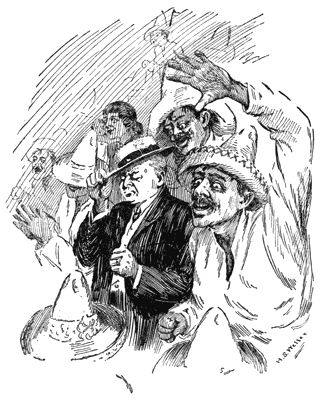
I found myself jammed in with the cruelest, most blood-thirsty, cut-throat gang I've ever seen
And now the bull comes from the darkened pen, where he has been kept for twenty-four hours,—a walk of thirty feet through a fenced-in lane. His bovine majesty, a splendid bull, comes walking leisurely along, rejoicing to get into God's sunlight, no thought of malice in his heart. He seems to nod a kindly good-afternoon to the attendants, who drive him towards the gate that opens into the arena. As he is passing through the gate a man perched up out of harm's way jabs a cruel harpoon on the end of a handle decked with gaily colored ribbons between the bull's shoulders.
There is no maddened rush of an angry bull. He stops for an instant with a startled look—surprise, and hurt wonderment, and "what for?" written on his face as plain as man can talk. A baiter inside the ring with a blanket shook out at his side stands just ahead of him. The bull charges the blanket—no danger to the man—the gate is shut, and the baiters with their blankets held out at their sides get the bull more and more into fighting trim. 13
But the crowd wants blood. So a baiter on a horse, rides up and jabs the bull's shoulder with his spear, and another rider jabs him on the other side. The bull wheels to catch his tormentor, who is out of harm's way on his horse. The bull charges back and forth, from rider to rider, until one of them deliberately reins his blinded horse directly in range of the bull, who rips its entrails out. The rider deftly and easily dismounts; the blinded horse is down, and the bull finishes him with a thrust or two, and the crowd goes mad with "delight." The remaining two riders have played their part, and withdrawn from the ring, and six baiters on foot take up the "sport," and with their blankets draw the bull from the now dead horse. He charges from one to the other, with no more danger to the trained athletes on foot than there would be to a hound after a rabbit.
But the rabbit has a chance for its life—the bull none.
And now another baiter comes with two harpoon spears on handles two feet long decked with ribbons, and tempts the bull to charge him. The bull accepts the challenge, and as he charges the trained baiter side-steps, and, as the bull passes, plants his harpoons in the bull's sides. 14
Good act! The crowd goes wild again. This sport is kept up for half an hour, till the poor beast's sides are full of barbed spears, and the crowd cries out for blood, more blood, when the lord high executioner steps up with a long, murderous, stiff-bladed sword, about four feet long, and with his blanket tempts the tired bull to lower his head, then he drives the sword to its hilt between the bull's shoulders.
The bull does not drop dead. The matador missed his heart; but with that blade thrust through his body, the bull staggers—braces himself on his four feet. The matador vainly tempts the bull to charge the blanket. The look in the dying bull's eyes would move a heart of stone to pity—he trembles, falls to his knees, drops in a convulsive heap, and dies.
The matador salaams low as he receives the plaudits of the crowd. A team of fine horses, decked in red blankets, is driven on a gallop to the dead bull, a rope is attached to his legs, and the horses gallop out of the arena, snaking the bull in their wake.
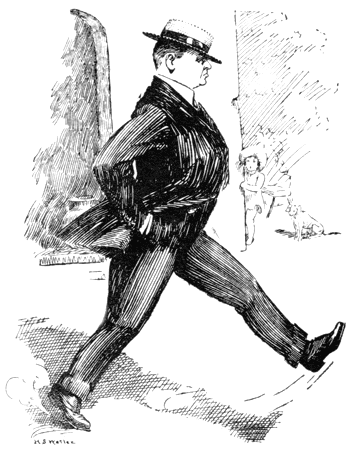
They tortured three yesterday, but I was more than satisfied with one, when I left them to their sport
The team comes back, and in like theatrical manner the dead horse is snaked off, and the crowd sets up a howl to bring on another bull. Three to five bulls are tortured for an afternoon's "entertainment." 16 They tortured three yesterday, but I was more than satisfied with one, when I left them to their "sport." Carranza's headquarters are at Juarez. He "graced" the bull fight with his presence, and if Huerta had been in Juarez he would probably have been there too.
I labor under a great disadvantage in writing this ship-board letter, en route from San Francisco to Yokohama.
My contract reads that these letters shall tell of personal experiences, and when I discover a new, fresh theme that I am not qualified to tackle, I naturally feel that fate has been unkind to me.
There has recently been discovered a strange malady which attacks travelers at sea. I find competitors in writing travel stuff have me on the hip in this regard. This new malady, in which I know the public must have a breathless interest, is so replete with possibilities from a pencil pusher's standpoint, I more than half suspect that some writers aren't playing fair.
I fear some of them are no more qualified from personal experience to write about it than I am, but they are banging ahead and writing about it anyway, just because it is a new, fresh subject, full of thrilling possibilities for the pen artist, and as for the artist who can draw pictures to illustrate 18 it—honest you'd die laughing, there's so many funny things about it.
The ship's doctor, whom I've interviewed for data, advised me to cut it out; that, like everything new, the writers have already overworked it.
He told me they called it seasickness in the steerage, and mal de mer in first cabin, and that it hits first cabin harder than it does steerage.
I never was strong on fads. The beaten path for me!
I am also under contract to write about the folks I meet. Now there's a subject worth while,—folks. You'll strike them on shipboard. I'm pretty close to one chap so soon. He is on a business trip to China. He is from some place in Missouri—he's from Missouri all right.
I understand he has dealt largely in horses. It's his first trip to Japan and China, and he seems to cling to me, and I have much of his life's history. The first thing I noticed about him was his beautiful teeth—as fine a set of teeth as I ever saw in a man's mouth. The first meal after sailing he got up and left the table abruptly, and I missed him till the next meal, when again he left the table—seemed to be in trouble.
The next time I saw him was at dinner, and I was shocked! He had lost two teeth on one side 19 and three on the other—upper teeth. It made a great difference in his personal appearance—but he seemed to enjoy that meal without any break.
After dinner, on deck, away from anyone else, I commiserated him on the loss of those teeth—felt well enough acquainted—you can make better time getting acquainted on shipboard than anywhere else.
I asked him why he had to sacrifice those teeth; that they looked like fine teeth. Was it really necessary to have them out? Hadn't he taken a chance in having the ship's doctor play dentist? And then he poured out his whole soul to me about those teeth.
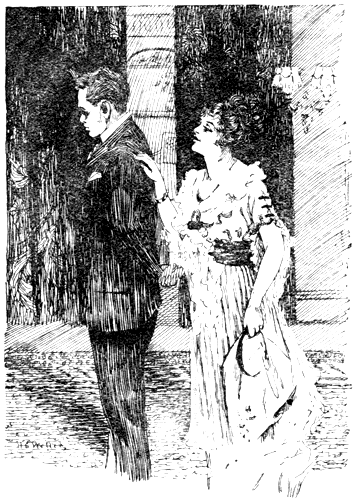
"You see, Mr. Allen, I got those teeth to please my wife"
"Mr. Allen," he said, "the ship's doctor didn't take them out. I haven't lost them. I'm wearing them in my coat pocket. Those teeth were artificial, Mr. Allen."
"You see," he continued,—it seemed as if he just wanted to talk about those teeth, now that he was started,—"You see, Mr. Allen, I got those teeth to please my wife. I didn't really need them, only for looks. I've got all the rest of my teeth, except those side ones.
"Wife said it was all right while I was home where my friends all knew me—were used to me; but in taking this trip among strangers, I really 21 ought to have those gaps filled in. So I went to a toothsmith, and he shod me up with some new teeth. He talked about bridges, and scaffolding, and roofing, and one thing and another, and owing to the situation he found in his explorations, 'a partial plate,' as he called it, he thought was the best way out.
"When he connected me with those teeth, it felt just like it looks to nail a shoe on a horse. I felt as a colt must feel when it's first hitched up with bit and bridle.
"'Do you mean to tell me,' I asked that dentist, 'that I've got to go through life with that in my mouth?'
"'Oh, no,' he said, 'this is only a partial plate. Some day you'll lose all your teeth and will have to have a double set, upper and lower. Then you will feel as if you were somebody else—this is only a little trouble. You'll get used to this partial plate and not mind it a bit. They look dandy. Just take a peek at yourself. You look ten years younger. You just stick to them for a couple of days and you'll be all right.'
"I went home feeling that the bloom of youth was all rubbed off—felt as if I had a billiard ball in my mouth. 22
"My wife was delighted, and gave me that same josh the dentist handed me—said I looked ten years younger.
"I felt forty years older, and told her so—and when it came to eating, everything tasted just alike—and all bad.
"I stood it for six hours, and gave up. I went to take them out and got scared. I couldn't get them out. Then I was sure the dentist had nailed them in.
"I called him up and asked him would he go to his office? Told him I was in trouble. When I got there I found him waiting for me.
"He wanted to know where they hurt.
"I told him, 'All over.' That the joy and jounce and bounce of life had all left me. He had filled me full of woe and sadness. That my shoes pinched, my hair pulled, and my collar choked me.
"'Take 'em out, doctor, take 'em out,' I sobbed. 'I don't believe they were made for me. I think you've made a mistake and got some other fellow's teeth in my mouth. I think these teeth were made for a very large man with a very large mouth,' I said.
"He pried me loose from the work of his hands, and took the artificial part of me into his den, put it on his anvil, and ran it over his buzz saw and through his planer, and brought it back to me, and 23 said, 'Open up,' just as if I were a horse; and he bitted and bridled me for another race.
"I wrestled with those teeth for a week before I left for this trip. I kept them in different places—in the bathroom, on top of my chiffonier, and in my pocket. Not all the while, you understand. I got so I could take them out myself, and I alternated them between the place where they made me look ten years younger, and those places I've mentioned; and when I didn't have them in, my wife was giving me Hail Columbia. Said I didn't have as much sand as a Chippy bird; acted as if I were the only person who had ever had to learn to wear false teeth.
"I made a few more trips to the dentist, to ask him if he was dead sure he hadn't got me breaking in some other fellow's teeth; and if he would plane them down a little here and there.
"He growled considerable. Said he'd get them too loose, and then I'd be having trouble the other way.
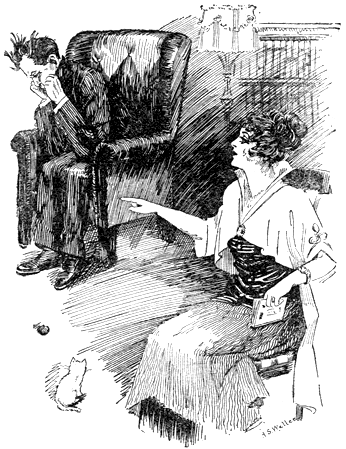
When I didn't have them in my wife was giving me Hail Columbia"
"Well, I got so I could wear those teeth and think of something else at the same time; and then I started for San Francisco to catch this ship. I can't understand it at all; but somehow or other, those teeth have shrunk. They began to shrink as soon as I struck the Pullman, and when I got aboard this 25 ship the blamed things had shrunk some more. They got so they would drop on me while eating. I'd be going along all right, when all of a sudden, with a mouth-full of victuals, I'd find myself chewing those false teeth with my other teeth. I felt like a cannibal chewing a corpse. I felt like a ghoul robbing a graveyard. It was worse than the neck of a chicken, that any man who has kept house for twenty years or so, knows all about. After you've helped all the rest, all that's left for you is the neck, don't you know?"
"Missouri" had me crying; but I gave three emphatic and sympathetic nods. I've kept house for more than twenty years, and I'm a connoisseur myself on that part of the fowl—and the gizzard.
"Well," "Missouri" continued, "I felt like a Fiji Islander before the missionaries taught them to love their enemies, but not to eat them. So I'm wearing those teeth in my coat pocket.
"I may not look so young, but I don't feel so like a blithering savage. I hate to go home without a full set of teeth, though.
"How are the Japanese on dentistry, Mr. Allen? Do you suppose I could get fixed up over there?" 26
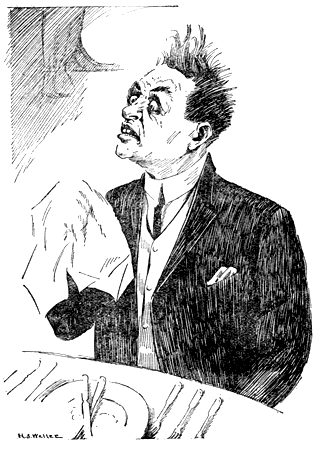
"With a mouthful of victuals, I'd find myself chewing those false teeth with my other teeth"
I told him I didn't know about their dentistry, but that they were clever little beggars. That they were strong on tea and tooth brushes. 27
"Tea, teeth, and tooth brushes," "Missouri" said, in a speculative and hopeful tone. "Now maybe so, maybe so," and we parted for the night.
"Missouri" is not a half bad sort, and, anyway, his teeth story is different than a yarn on seasickness.
This is a fine, large ship—Japanese line.
I don't call to mind any line of ships I have not sailed on prior to this voyage in my chasing up and down the world in search of a "meal ticket," and pleasure; but this is my first voyage on a Japanese liner, and I'm simply delighted with it.
It contrasts delightfully with a ship I sailed on, on one of my former trips across the Pacific.
That boat was all right, too. Good ship, good service—particularly good service—Chinese help; and anyone who has ever sailed with Chinese crews, waiters and room boys, knows what that means—nothing better in that line. I had a fine stateroom and a good room boy—that boy was a treasure.
I cottoned to that boy the minute he grabbed my baggage at the wharf, and blandly said, "You blong my," as he led me to my stateroom.
There was an obnoxious sign in that stateroom which read: "No Smoking in Staterooms." I settled for the long voyage, hung a coat over that sign, and lit up.
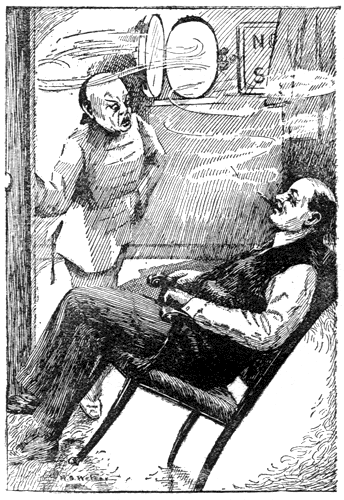
"Wong," I said, "how fashion you talkee so?
"No can slmoke stlate loom!
"No tlouble slmoke stlate loom. Can slmoke stlate
loom easy, see?"
Wong Lee flagged me with a word of warning: "No can slmoke stlate room. Slmoke loom, can do."
"Wong," I said, "how fashion you talkee so? 'No can slmoke stlate loom!' No tlouble slmoke stlate loom. Can slmoke stlate loom easy, see?"
If anyone tells you the Chinese can't see a joke, tell them to guess again. Wong saw that little one—saw it through a cloud of smoke, at that. Wong shut my stateroom door, like a boy in the buttery stealing jam, and said: "Lofficers findee out. They flobid."
"All right, Wong, I won't tell them if you don't," I said. And Wong didn't—Wong certainly didn't betray me.
The further we sailed the more I became attached to the boy—he took such excellent care of me—I got so I really loved that boy.
All Wong's other duties seemed easy compared to his efforts, in my behalf, to see that my slight and harmless infraction of the ship's rules should not be discovered. If I dropped a little ash, Wong was on hand to brush it up. A tell-tale cigar stub, carelessly left—Wong was there to whisk it out of sight with: "Lofficers may come insplection any time. No can tell when."
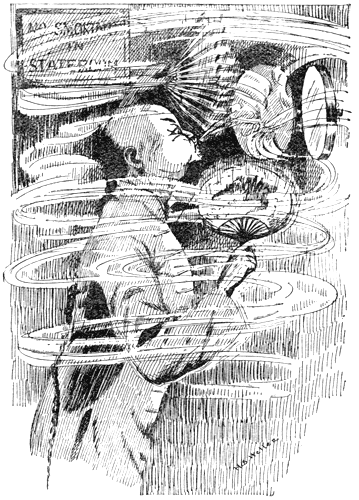
My great fear was that before we landed at Yokohama Wong would surely burst in his efforts to keep the smoke in my stateroom blown out of the porthole
It wasn't my uneasiness at fear of being found out that robbed me of some of the pleasures of the 32 trip, but an anxious fear that Wong, 'round whom the tendrils of my heart's affections were gaining strength each day as we neared the mystic land of the rising sun—my great fear was that before we landed at Yokohama, Wong would surely burst in his efforts to keep the smoke in my stateroom blown out of the port-hole.
Now this ship is different. No silly rules that drive a man out of his room onto the deck, or the smoking room, when he feels like drawing a little inspiration from the weed that cheers but don't inebriate—I like this ship.
"Land ho!" Hawaii in the distance.
"Under the setting sun, in the Mid-Pacific, lie the Islands of the Hawaiian group, which present to the traveler or home-seeker more alluring features than are combined in any other country in the world. Nowhere else are such pictures of sea and sky and plain and mountain, such magnificence of landscape, such bright sunshine and tempering breeze, such fragrant foliage, such brilliant colorings in bush and tree, such dazzling moonlight.
"With a climate world-excelling for its equableness, these happy islands afford a refuge for those who would escape the rigors of cold or heat encountered in the temperate zones; an entertaining resort for the pleasure-seeker, an almost virgin field of research for the scientist, a sanitarium for the ill, weary or overwrought. For the man who would build a home where conditions of life are most nearly ideal, and where nature works with man and not against him, Hawaii smiles a radiant welcome.
"It is withal an entrancing land, these mid-sea dots, for the combination of tropical sunshine and 34 sea breeze produces a climate which can be compared to nothing on any mainland, and by reason of peculiar situation, to that of no other island group. Hawaii has a temperature which varies not more than 10 degrees through the day, and which has an utmost range during the year from 85 degrees to 55 degrees. Sweltering heat or biting cold are unknown, sunstroke is a mythical name for an unthought thing, a frost-bite is heard of no more than a polar bear.
"Conjure up a memory of the most perfect May day, when sunshine, soft airs and fragrance of buds and smiling Nature combine to make the heart glad, multiply it by 365, and the result is the climate of Hawaii. The sky, with the blue of the Riviera and the brilliance of a sea-shell, is seldom perfectly clear. Ever the fleecy white clouds blowing over the sea form masses of lace-like broidery across the blue vault, adding to the natural beauty, and when gilded or rouged by sunrise or sunset make the heavens a miracle of color.
"And, as in Nature's bounty the climate was made close to perfection, so the good dame continued her work and gave to the land such features as would make not alone a happy home for man, but as well a pleasure ground: for there are mountains and valleys, bays and cataracts, cliffs and beaches in 35 varied form and peculiar beauty, foliage rich in color and rare in fragrance, flowers of unusual form and hue, and all without a poisonous herb or vine, or a dangerous reptile or animal. To fit the paradise was sent a race of people stalwart in size, hospitable, merry, and music-loving. The door is always open and over its lintel is 'Aloha,' which means 'Welcome.' All are given cordial greeting on the summer shores of the Evening Isles, and nowhere else may be found so many joys and such new lease of life as under Hawaii's smiling skies.
"More prominent than any other cause for this condition of affairs is the fact that Hawaii is windswept throughout the year. The northeast trades bring with them new vitality, and make of Hawaii a paradise where life is pleasure all the year round. From out of the frozen north, picking from the blossoming whitecaps the fragrant and sustaining ozone, sweeping across the breakers to caress the land, comes the constant northeast trade-wind. It is not a strong, harsh blow at all, rather a fanning breeze—Nature's punkah. The average velocity for the year is but eight miles per hour. The mission of the trade-wind is a beneficent one always. Cyclones or hurricanes in Hawaii are unknown."
I didn't write the above. That is a piece of pure plagiarism on my part. I snitched it from a folder put out by the Hawaiian Promotion Society.
The first time I saw that folder I got hold of it on shipboard a few hours before reaching Honolulu the first time I came here, years ago. I read it through and smiled like Noah's neighbors when he allowed there was going to be a wet spell—and got off the ship and "did" Honolulu.
I kept on smiling, albeit not cynically.
No living man can adequately describe the beauties of these islands. I just wandered around in a daze until I found myself on top of one of their mountains, and when I took it all in I felt as if I'd burst if I didn't say something, and I began apostrophizing Hawaii in a rapturous rhapsody.
I felt a good deal better after that, but as I was pressed for time I had to leave the islands and hike along; or I thought I had to. I did, at least.
But that rhapsody stands. The islands are still here, and as lovely as ever.
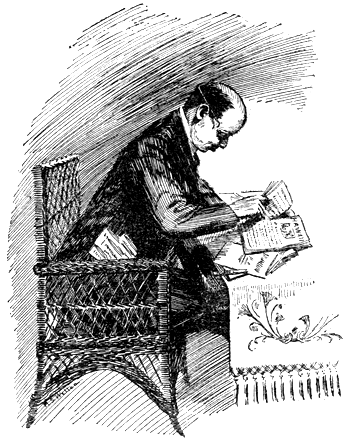
I snitched it from a folder put out by the Hawaiian Promotion Society
What I can't understand is, that there are only 191,000 inhabitants on these islands, with room for several times that many; and something over a billion in the rest of the world. I don't know why I'm not living here myself, and for the life of me 38 I don't know why I leave them—my ultimate aim has been to get to Heaven.
I can only account for it on one theory: I own a house and lot and some land in Central New York, and I'm so busy shoveling snow outdoors and coal indoors from some time in November to some time in April, and during May and June getting some stuff started, hoping it won't get nipped by the late frosts, and working it along before September frost gets it—in the meantime saving it from more bugs than a fellow, if he saves his crop, can take time to learn the names of—what with hustling that stuff through between frosts and saving it from pests, and planning the while to be in shape to get some coal to keep from freezing to death the coming winter—a fellow tied up like that can't come to Hawaii to live. I suppose that billion or so who are not living in the Hawaiian Islands are all fixed in some such a way.
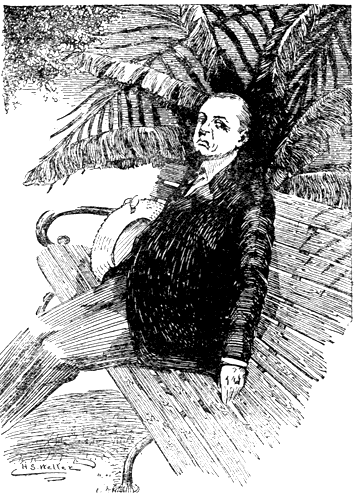
A fellow tied up that way can't come to the Hawaiian Islands to live
But I feel a little sore at that Hawaiian booster. He didn't tell about the fish they have here. There is an aquarium in Naples, Italy, said to be the finest in the world. I've been through that Naples aquarium several times, and it is a drab affair compared with the aquarium here at Honolulu. In the Honolulu aquarium may be seen fish of odd shapes and so brilliantly and beautifully colored that no 40 artist could show these colors with paint and brush. There is the Humuhumu for instance. A fish six or seven inches long. It has bright green fins, and a stripe of jet black starting in a narrow band at the top of its back, broadening out diagonally around its body. On its side, set in the band of black, is a bright red spot. Rearwards of the black band its body is a bright red, and forward of the band the body is bright red shading off to white. Its tail is striped, red, yellow and black. Somewhat bass-shaped, its eyes are not in its head, but set on top of its back.
A man not knowing such a fish existed, if he were fishing in one of our ponds in New York State, if he should pull up a Humuhumu, he would stop fishing. He certainly would. And he wouldn't stop to land it, either. Just one look at that fish and he'd yell and drop fish, line and pole right back in the pond, and hunt up the chairman of the temperance movement in his town and sign the pledge.
Then there is the Lae-Nihi. A fish about eight inches long, all blue. You can't know how bright and beautiful blue can be until you see a Lae-Nihi swimming in the water. Dozens of other odd-shaped fish, wonderfully marked in brilliant variegated patterns, are in the aquarium. 41
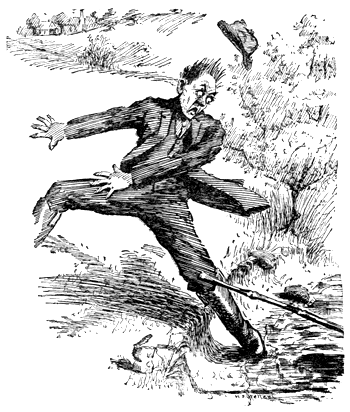
Just one look at that fish and he'd yell and drop fish, line and pole right back in the pond
The government at Washington has made colored plates showing the shapes, markings, and giving the names of these fish, and attempting to show the colorings. Anyone looking at the colored prints and not knowing of these wonderful fish would say, "Preposterous! No such colored fish exist!" But the cold fact is, those colored prints but faintly portray the brilliant colors of the fish as they are seen in life.
With all this, you'd think they ought not to be anything but happy in Hawaii. You wouldn't expect to find kickers on the islands.
But the truth is, they are in a blue funk. They think that the islands are going to the bow-wows financially, because of the tariff legislation on sugar. I tell them to brace up and advertise the islands as more than the biggest show on earth; and, in place of begging for settlers, to pass out the word that the truly good may come, for a satisfactory consideration; and that the chances are they will have standing room only, and won't know what to do with their money. 43
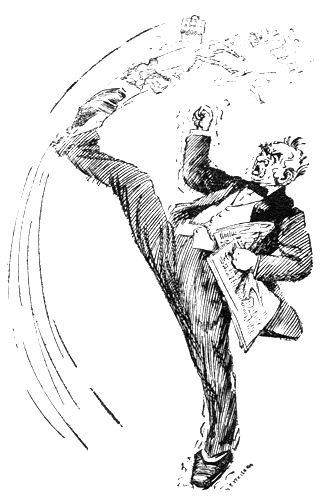
You wouldn't expect to find any kickers in the islands
More and more I am convinced of the cleverness of the Japanese after a voyage across the Pacific in one of their magnificent ocean liners—a 22,000-ton ship, built at their yards at Nagasaki, Japan—built, owned, and operated by the Japanese. The officers are Americans, with the exception of the chief engineer, who is Japanese. The crew is Japanese. Dining room waiters, Chinese and Japanese; and room boys are Japanese.
The cuisine more thoroughly conforms to American tastes than that found on any other ocean liners I am acquainted with, and nothing left to be desired in quality, variety, and way of serving. All the appointments of the ship for luxurious and comfortable travel are as nearly perfect as anything can be, with absolute cleanliness emphasized at every point—a trip through the culinary department prior to sitting down to a meal adding zest to one's appetite—and that's some test. The management does everything possible for the passenger's enjoyment. Nearly every evening a moving picture entertainment 45 is given on one of the spacious decks. The ship carries films to the Orient as an item of freight, and has the use of them en route.
A seventeen days' voyage from San Francisco to Yokohama is not long enough to exhaust the supply if an hour's exhibition were to be given every evening. The event of the voyage is the theatricals given by the ship's crew, the common sailors, who do the work of running the ship. I was not surprised to see Japanese sailors in an exhibition of ship games for the passengers' entertainment one forenoon, carrying them off creditably—games indulged in by sailors the world around: the tug-of-war, chair race, potato race, cock-fighting, etc.; but to see them put on an elaborate theatrical for an evening's entertainment filled me with wonder and admiration.
The first act on the program was a "Union Dance." In this all leading nations were represented. And next was "The Lion Dance." They say the Japanese are imitative. I would like to know which nation they imitated in producing that beast! It was an animal about fifteen feet long. It had a bushy tail that stood in the air three feet and waved continuously. Along its back was a series of short, stubby wings; and its head! Fearfully and wonderfully made was that head, which 46 was mounted on a serpentine neck. The genius who created that head must have searched the earth, sea, and air for inspiration in his work.
And it danced!
Oh, that beast danced!
The power that moved the thing was two sailors inside, but how under the heavens they kept that tail waving, those wings working, and the eyes, ears, and tremendous jaws of that combination of earth, air, and sea monster all going at one and the same time, the while it danced, and reared, and crawled, and writhed, and gamboled, and all but flew—I would like to know how they did it. If anyone will tell me which nation they imitated to put that number on, I'll make a trip to that country—I want to see those folks. I've seen something on this order, large animals, elephants, bears, cows, etc., impersonated with man power inside, in New York, London, and Paris. They were good, too. A lot of fun. Amuse the children. But here was something good enough to—to—well, I won't say to scare a locomotive off the track, but I'll bet it would make it shy.
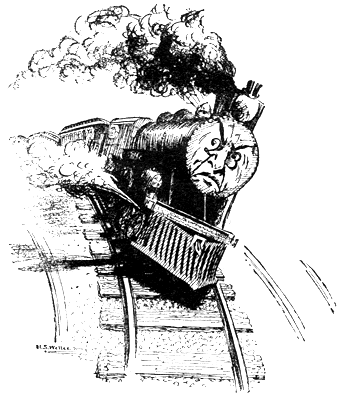
But I'll bet it would make it shy
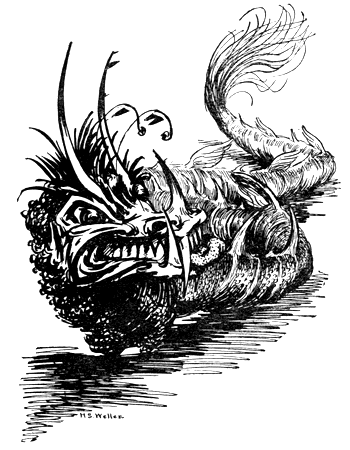
I won't say it would scare a locomotive off the track
The next number was "Wrestling and Fencing." A half dozen pairs of contestants. Japanese wrestling is always good and needs no comment, but the actor who announced the bouts, and the umpire 50 who started them and announced decisions, would have made a whole evening's entertainment in themselves. Adverse comments on some of that umpire's decisions, by certain Japanese passengers, brought him to the front of the stage with a little preachment. It all being in Japanese, of course I couldn't understand what he said, but there seemed to be fire and tow and ginger in that umpire's words; indeed, everything that he did savored of fire and tow and ginger.
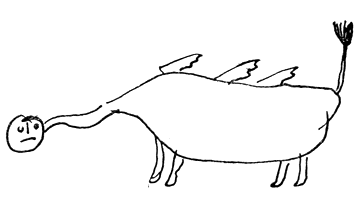
The artist hasn't quite the right idea of that beast, so
I'll draw a picture of it myself, and then you can see just
how it looked, only it was fiercer, you understand.
—The Author.
I asked a Japanese passenger who sat next to me and who was not one of the dissenters: "What did the umpire say?" Turned into English the umpire said: "Go chase yourselves, you lobsters who are finding fault with my decisions. I'm umpiring these bouts, and my decisions go, see?" And they saw. Believe me, that umpire could make anyone see.
The commander of the ship told me that that umpire finally made him "see."
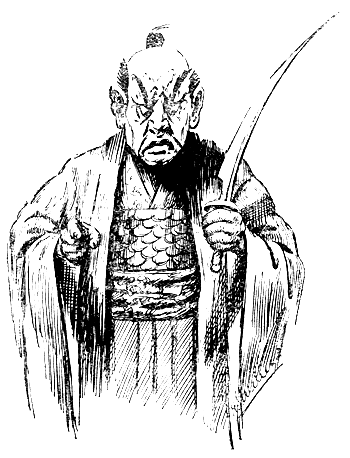
Believe me, that umpire could make anyone see
He (the umpire) is 62 years old. He asked the commander for a job, and failing to get it, he rode as a stowaway on the ship across the Pacific. He made the trip three times in that way, until finally he wore the commander out, and got his job. He is a good sailor, a star actor, and somewhat of a privileged character. I could see from the way the commander 52 told me the story of how he got his job that he considered the umpire a good sort.
But the climax of surprises—of common sailors holding for over two hours a most critical audience, and delighting them to the last drop of the curtain—was "Cushingura," one of Japan's classical dramas. It took a dozen or so actors to produce it. The crew, from money raised by delighted auditors, had provided splendid and appropriate costumes to dress the parts.
That play was presented magnificently.
It smacked nowhere of amateur theatricals. It moved off from the opening to the closing act without a hitch. So vivid and admirable was the acting, although spoken in Japanese, even those of us who could not understand the words were charmed, delighted.
Last night a royal shogun, dressed in regal robes, treading the boards with tremendously dramatic effect; today, washing down the decks or polishing up the brass trimmings of the ship, that Japanese sailor man is an object for contemplation.
But again: "Land ho." Japan is sighted, and all interest centers at the ship's rail as we steam towards Yokohama.
I believe I ended my last letter by ho-ing the land, and hanging a shipload of passengers over the rail, sailing into Yokohama harbor.
When a shipload of passengers get off at Yokohama, there is joy among the rikisha boys, and the passengers who are getting their first ride in a rikisha have an experience they will never forget. The first ride in a jinrikisha in Japan is an experience to lay away among one's choice collection of experiences.
A first ride in a rikisha has been fully described by myself and published, and to go into it in these letters would be to plagiarize myself: so, on to Tokio, the capital and largest city in Japan—the same old tremendous town, only more so—Greater Tokio has three million souls today. Compared to one of our great cities Tokio has the appearance of an overgrown village.
Many wide thoroughfares and narrow streets lined with low one- and two-story buildings—a clean city, covering a tremendous area. 54
You occasionally see a three-story building and they have one "skyscraper" that towers up into the air five stories—a landmark.
The Mitsukoshi, Japan's one great department store, is now housed in a modest three-story building, but they are building a new store.
The general factotum of the store who can speak English showed me a drawing of the new store. I exclaimed with admiration: "And she is going to be five stories high, isn't she?" "Yes," he said, proudly, "and a basement."
The government buildings are not so imposing as in many other of the world's capitals, and there is no single business center. The business of the city is widely scattered. Rapid transit in Tokio is in a state of transition. The trolley has come, but not sufficiently strong to be adequate for the traffic, but enough to discourage the rikisha boys—the rikisha boy has run his legs off in Tokio. He is still here, but in decreasing numbers, and what there is left of him is the beginning of the end, so far as Tokio is concerned.
He is an expensive proposition. He wants ten cents to take one any distance at all, and that is equivalent to a ten-cent car ride at home; and to take one any considerable distance is twenty-five cents.
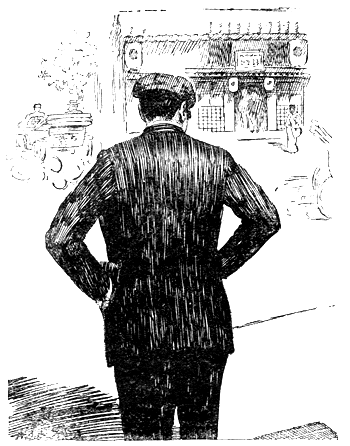
They have the taxicab, but someone else had it during my three days' stay
They have the taxicab, but someone else had it during my three days' stay. They have automobiles, but not to such an extent that one has to do much dodging. In an hour's ride across the city I counted six—and it was a fine day for automobile riding, too.
To get around in Tokio is a problem. Like Washington, it is a city of magnificent distances. The street cars go where you want to go, but they don't come where you are. The charge is only two and one-half cents for a ride, but it costs ten cents for a rikisha boy to take you to the car. The boy will land you where you want to go for twenty-five cents, but there is a two and one-half cent street car fare against a twenty-five cent rikisha ride; so you tell your boy to take you to the car. Then it percolates into your mind that you have ten cents invested in that ride. But there is still a fifteen cent salvage if you take the car, less the two and one-half cents the car will cost—twelve and one-half cents net. While you are working out the problem your car passes, and you tell your boy to go on and take you there—you'd only save twelve and one-half cents anyway.
But that's another ride—twenty-five cents—new deal—and you sigh for the days of your old Tokio, before the street cars came to fuss you up.
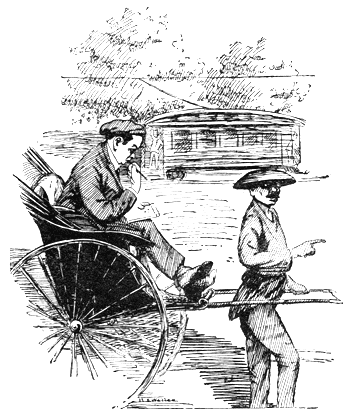
While you are working out the problem your car passes
Also, they have raised the price of laundry in Tokio—yes, sir, the price of laundry has gone up. They now have the effrontery to charge you two and one-half cents to wash a handkerchief or a pair of socks. Of course it's two and one-half cents for a shirt, a white coat, or a pair of pants—flat rate, two and one-half cents, "Big or little piecee all samee." But it used to be one and one-half cents.
Those were the days when you didn't have to hold a shirt in one hand while you speculated with the other as to whether it would go one more time—under that old scale you just put it in the wash.
I noticed the following account of the death of the Empress Dowager in the Japan, a magazine printed in English in Tokio:
"Whilst as yet the earth mound set up over the august remains of the late lamented Emperor Meiji at Momoyama, Fushimi, is fresh and damp, the Japanese have been stricken with a renewed sorrow and bereavement, none the less profound, at the demise of their cherished, beloved Empress Dowager, the First Lady of the Land, who graciously shared the glorious throne of Japan with her lord and sovereign, the late illustrious Emperor Meiji, for forty-five long years of brilliant progress, splendid achievement, and the 'Reign of Enlightened Government.' As the beautiful, fragrant blooms of the cherry fall, ere the dawn comes when the stern, pitiless tempest ravages the tree in the evening, so the exalted person has sunk to rise no more at the inevitable, nay, unexpected, touch of the death's cold fingers. 60
"Although her recovery from the illness had been ardently prayed and hoped for by all her devout subjects, and although the medical attentions, the best the modern sciences can procure, having been concentrated upon the noble patient, the rays of hope for her recovery seemed to beam, the fatal crisis came suddenly and unexpectedly.
"Her Majesty had been suffering from chronic bronchial catarrh and nephritis, which became complicated by angina pectris on March 29, followed by a urine poisoning toward the end of that month. She seemed to be recovering from the urine-poisoning and the heart trouble due to angina pectris, until April 9, when at about 1:30 A. M. the second attack of angina pectris came, followed by the failure of the heart. The latter proved fatal; and the exalted patient in this critical condition returned to the capital from the imperial villa at Numazu, where she had been laying ill. The sad event was officially announced two hours after Her Majesty's arrival at the imperial detached palace at Aoyama, Tokio, the demise having been recorded as taking place April 11 at two A. M."
I was moved over that account more than I was over the fact that the Empress Dowager had passed 61 away. I was not acquainted with the Empress Dowager, and therefore only felt that general interest one naturally feels in an event of the kind; but over that account I had emotions.
I had still more acute emotions when I saw a Japanese girl dressed in American girls' clothes. The Japanese girl in her own clothes is an old friend of mine.
I have known her for forty years—in her clothes—on lacquer boxes, screens, and fans; and for fifteen of those forty years, on periodical visits to Japan, she has danced and sung for me, and bowed and smiled to me, most bewitchingly—"belitchingly" in her native garb. But to see her tog herself out in high-heeled shoes, a basque, and a polonaise, and a hat with heaven knows what and then some on it! The editor of the Japan in his account moved me some, but that girl gets me going good.
I hope she will get well, and go back to her kimono, with her cute little feet encased in white mittens, pigeon-toeing along on her wooden sandals, held on with thongs between her toes, and her bustle on outside of her dress. She is part of the landscape that way. She fits in, and makes me glad.
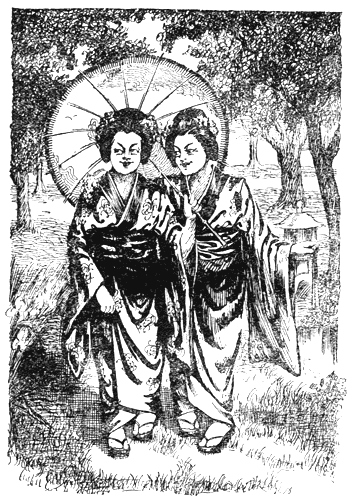
She is a part of the landscape that way. She fits in and makes me glad
There is only now and then one of her stricken, but if it spreads, becomes universal in Japan, that 63 editor will be called upon to tell us: "The Japanese girl has had a fatal attack of heart failure—and from this she did not recover."
Returning from a trip to Tokio on a Monday forenoon I found at my hotel in Yokohama the following letter from my shipboard friend "Missouri":
Dear Mr. Allen:
You'll be surprised to learn that I am in jail. I started out this morning at 8 o'clock to go to church. At 8:30 I stopped at a saloon and met a delightful bunch and didn't get away from that saloon till 5 o'clock this evening. At 5:30 I was pinched and put in jail on a charge of assault with attempt to kill.
If the victim dies, please find out for me whether they behead, hang, or electrocute in Japan for capital punishment.
I've learned the Japanese language today, but don't want to talk to the jailer, as it might prejudice my case. For heaven's sake come and see me and I'll explain it all.
Hastily yours,
"Missouri".
On his own statement it looked bad for "Missouri." I had left him at Yokohama, where he had some business to look up, while I went to Tokio.
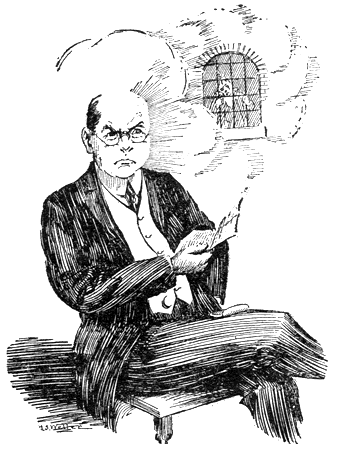
Pained! Grieved! Shocked! were too mild words. I was disappointed in "Missouri"
I had expected to find "Missouri" on my return to Yokohama that Monday forenoon, and instead of him I found his letter.
Pained! Grieved! Shocked! were too mild words. I was disappointed in "Missouri." A countryman in trouble under circumstances like these, however, called for prompt action, and I started off post-haste in a rikisha to see what could be done about it.
I conjured up a picture of "Missouri," the erstwhile prepossessing chap (even minus those side teeth "Missouri" was a fine-looking man), now battered, bruised and blear-eyed, disheveled and disreputable; probably he had been on a long toot—a relapse from rectitude, I surmised.
He had been entirely abstemious on the voyage, but there may have been chapters in his past life o'er which he'd drawn a veil in our shipboard confidences—anyway, it looked bad for "Missouri." His reference to starting out to church was probably only a vagary of a befogged brain.
These thoughts were mine as I was being rikishaed along to "Missouri's" rescue, when, whom should I see coming toward me in an automobile but "Missouri," the same "Missouri," in company with another just as smooth-looking individual, who was driving the machine.
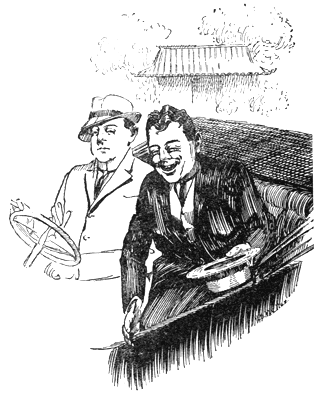
"Lord, Mr. Allen, I'm glad to see you" he said, as the machine stopped
"Missouri's" mouth was stretched from ear to ear in a joyous greeting as he caught sight of me. Those "gaps" showed tremendously—one couldn't blame his wife for wanting them "filled in."
"Lord! Mr. Allen, I'm glad to see you," he said, as the machine stopped. "Meet my friend here, 'Pennsylvania.' 'Pennsylvania' and I have had an experience. Too long a story to tell you here. Come on back to the hotel and I'll tell you all about it."
"That's all right, 'Missouri'," I said, "but," waving his letter at him, "what the devil do you mean by handing me such a story as this?"
"That letter is all right, Mr. Allen; come on back to the hotel and I'll give you the details."
The man "Missouri" had introduced to me as "Pennsylvania," who was apparently owner of the machine, advised me to let my rikisha boy go and come back to the hotel in the car with them; and in a couple of minutes we drew up to the hotel entrance and I invited them to my room, where I asked "Missouri" to square himself.
"Missouri" did the talking while "Pennsylvania" nodded assent at points where the story would seem to need a girder under it.
"This is how it happened, Mr. Allen," "Missouri" started in. "There's a missionary over in Tokio in whom the folks back in my town are interested, 69 and they wanted me to look him up if I had time when I got to Japan. I dropped him a line upon my arrival, and told him where I was from, and that I was stopping in Yokohama at this hotel, and that I proposed to call on him the following Sunday. You know we landed on Monday. Wednesday of last week my missionary dropped over from Tokio and called on me and told me he'd be glad to see me in Tokio on the coming Sunday, to see the missionary work in that particular corner of the Lord's vineyard. We parted, and I assured him I would look him up in Tokio on Sunday—and that was yesterday.
"I met 'Pennsylvania' here the latter part of the week and we got acquainted. 'Pennsylvania' doesn't look like a disreputable character, and he isn't—ordinarily. Fact is, he's a most reputable manufacturer from Pennsylvania, doing Japan with his touring car.
"Saturday evening I told him of my program for Sunday, and he suggested we do the missionary field in Tokio the next day in his car.
"He told me Tokio was sprawled out over a good part of Japan, that rapid transit was in a chaotic state over there, and his car would be convenient. Furthermore, he said he had been chipping pennies, dimes and dollars into Foreign Missions ever since 70 he could remember, and that he'd like to look into the missionary's game on his own account.
"I told him the plan looked seraphic to me; we'd be just like a pair of 'Heavenly Twins' the next day. I knew that you were stopping at the Imperial over there, and I suggested we look in at the hotel and take you along if you were loose for the day and wanted to go.
"I told 'Pennsylvania' you were sort of a solemn cuss and that I thought the day's program would appeal to you, and 'Pennsylvania' said, 'Certainly, heavenly triplets.'
"We got started at eight yesterday morning. Figured on reaching Tokio by nine, easy enough, but the machine went dead at eight-thirty, nine miles out of Yokohama, square in front of a saki house—steering gear busted.
"'Pennsylvania' investigated, and said, 'Bad break, got to get help from Yokohama.'
"Now that Japanese saloon was the missing link—it was a good place—for us. Not that either of us are patrons of saloons.
"Why, I learn that 'Pennsylvania' is one of the great exponents of temperance in his State, the deadly foe of the American saloon—since yesterday morning 'Pennsylvania' and I have formed a David and Jonathan Club—we are like brothers—our 71 souls are knit together since what we have gone through in the past twenty four hours—and as for me, you never saw me touch a drop.
"I tell you I'm a disciple of Sam Blythe's in beating the old game with water. Sam says you couldn't get a drink into him without an anæsthetic and a funnel, and I'm just as pronounced against the drink habit as that. Furthermore," "Missouri" continued plaintively, "if you want to get further lines on me, Mr. Allen, just write the Epworth League or the Young People's Society of Christian Endeavor or the Y. M. C. A., Bradstreet or Dun's, or the Horse and Mule Traders' Union, of my home town.
"I tell you, Mr. Allen, I'm counted quite a desirable citizen back home in Missouri, where they know me, but we were 'two orphans' with a stranded automobile in Japan, and we needed friends.
"All the Japanese we knew between us was 'dozo,' 'aringetta,' 'soduska,' and 'ohio' and none of these words fitted the case.
"'Pennsylvania' went at his auto with all the tools he carried. We were blocking trade for the saki house, but they didn't kick. While 'Pennsylvania' was monkeying with the machine, I took a Japanese-English dictionary we had with us, and found out that they had a telephone in the house, 72 and they invited me in to use it. Sounds easy, and as if we ought to have gotten a relief corps out from Yokohama and be on our way in an hour.
"We S.O.S.'d Yokohama for four hours with that saki house telephone, that dictionary, and with the help of the proprietor's son, and it was noon before we got a message through.
"In the meantime the saki house people were making us at home. We pulled off our shoes and lived in the house while working their 'phone, and they treated us as honored guests. We thought a saki house ought to be a legitimate place to get a meal of victuals, so, pending the arrival of the mechanics from the Yokohama garage, who, after getting our message might be along in an hour, or a day, being mighty hungry about noon, we worked with our dictionary and the proprietor's son (a young fellow twenty-six years old) to order a meal of victuals. At the end of half an hour we got the request home, and understood, and the answer back that that was a private home and that they didn't sell food, only sold saki.
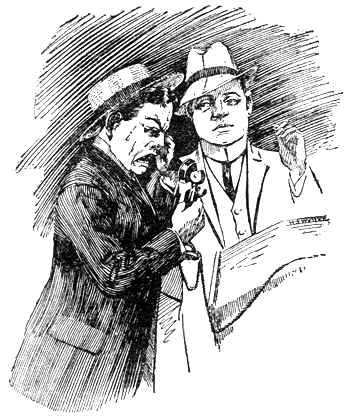
We S.O.S.'d Yokohama for four hours with that saki house telephone
"But the son's wife, a most comely little woman, caught the drift of our request, and by one o'clock had prepared us a dainty Japanese lunch, and invited us to it. We both agreed that we'd never had a better time in our lives, getting away with 74 a meal and affording amusement to our hosts as we labored, first with chop-sticks and finally fell back to fingers. We knew we'd be in bad if we offered to pay for that meal, and still we had ordered it. We'd be cheap skates not to offer to pay for what we had ordered, and we'd be barbarians if we offered to pay. We compromised by asking how much we owed, and got the answer we expected, 'No charge.'
"By two o'clock an automobile from Yokohama garage hove in sight with a load of mechanics, and by five o'clock our machine was in commission.
"After we had finished that meal, about two o'clock, the proprietor of the establishment showed up. He had been absent from home up to that time. He was a high-class individual. He added his welcome to that of the rest of the family's to the foreigners within his gates—he also made us feel as if the home was ours. While the work of repair to the damaged car was progressing we worked that dictionary to the limit. We learned the Japanese language and got the household proficient in English.
"During the afternoon the proprietor's mother came in for a call, and it was worth a trip across the Pacific to watch the greeting between the grandmother and her grandson, the twenty-six-year-old 75 chap. The old lady was beautifully dressed. She got down on her hands and knees, her palms flat on the matted floor. Grandson did the same. For about a minute they posed like two fighting cocks ready for a bout.
"Then grandma's forehead went down on the matting, so did grandson's.
"They stayed in that position so long I was afraid the old lady had fainted and was for picking her up, but just then she raised her head, peeked out of the tail of her eye at grandson, whose head raised a little, then down to the matting went her head again, followed by grandson. Up with their heads and down to the matting again, playing peek-a-boo to catch each other at it; several times they went through those motions, until justice, or something else, was satisfied; then the old lady got up and shuffled away, and grandson got up and told us that she was his grandmother, and eighty-two years old.
"That surely was some bow.
"The house was as clean as a hound's tooth, and they showed us through kitchen, bedrooms, and living rooms, and the little garden in the rear.
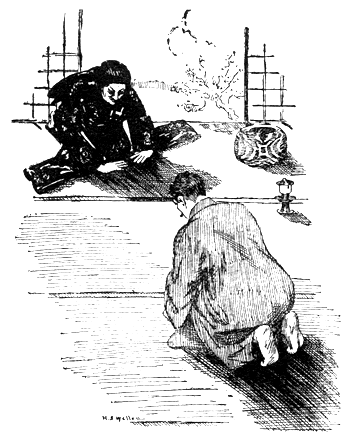
That surely was some bow
"There were no screens up before the doors of that Japanese saloon. The saloon, the front room 77 of the house, was fifteen feet wide, so was the door—that was an open-faced saloon, opening onto the street the width of the room.
"And customers came and went, working in around the automobile. A husband and wife came in and sat down on a matted platform. Hubby ordered one big tumbler of saki—the kind they had the biggest run on was as thick as buttermilk, looked just like buttermilk, and was ladled out of a big crock by a little Japanese barmaid.
"She'd fill the glasses so full that they would heap up at the brim—hubby carried the glass carefully to his mouth so's not to spill any, drank off a swallow, and handed it to his wife, who hit it for another swallow, and back and forth they passed that glass, taking a swallow a trip until they had finished it, and they walked away, to make an afternoon call, perhaps.
"Everyone paid for his own drink—there was no treating and no drunkenness.
"Everything that went on in that saloon was as open to the public gaze as the sun, and 'Pennsylvania' and I decided that the saloon business in the United States was one thing, and the way we were seeing it conducted in Japan an entirely different thing. 78
"At five o'clock our machine was ready for us and we left our saki house friends.
"We invited them to come to America. There are two front yards in America in which those folks are welcome to camp, if they ever come. One in Missouri and one in Pennsylvania. We both told them so, and that the freedom of two homes and the best those homes afforded would be theirs."
"Missouri" paused in his story, and "Pennsylvania" nodded twice and said, "You bet."
"Well," "Missouri" continued, "it was too late to take in Tokio, so we headed back for Yokohama.
"At five-thirty we were bowling along at a pretty good clip—we didn't kill that Jap, we only wrecked his cart and jounced him up a bit—we were going less than forty miles an hour, but a scrappy little cuss in brass buttons pinched us for exceeding the speed limit, and locked us up on a charge of assault with attempt to kill, pending the outcome of our victim's injuries.
"He came to, all right, this A. M. Ten yen and a new cart fixed the Jap—he needed a new cart, all right—and you met us on our way from jail. We may do the missionary stunt some other day," "Missouri" said, but I didn't notice "Pennsylvania" nod.
I started out of a Saturday evening in Kioto, which is one of the best cities in Japan—the best, I think—the old capital of the Empire, to take a walk on Theater Street, which is the Great White Way of Kioto, and one of the best spots in Japan to study Japanese life and character.
I hadn't more than stepped outside the walled-in yard of my hotel, having declined the offers of the favored rikisha men within the enclosure to take me for a ride, than a rikisha man outside the gate accosted me and pressed the card shown below into my hand.
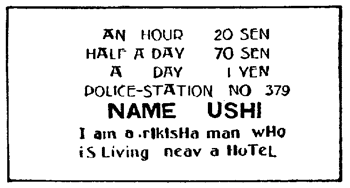
AN HOUR 20 SEN
HALF A DAY 70 SEN
A DAY 1 YEN
POLICE-STATION NO 379
NAME USHI
I am a rIkIsHa man wHo
iS Living near a HoTeL
At the same time he assured me that to ride was far better for a foreign gentleman than to walk. As I perused the card by a street light I probably detected more than you will, kind reader, for whom these lines are written on the other side of the world, as you hastily skim it and only catch its grotesque, misspelled and labored English. Its humble effort at enterprise impressed me.
Ushi mistook my mental attitude for one of indecision, and supplemented the appeal on the card with the added information that he was considerable of a linguist—that he spoke English pretty well. Also that he knew all the points of interest in Kioto, and that not to engage him for the evening was to miss a great opportunity—but Ushi's card had pulled a customer.
I stepped into his little carriage and said: "Ged app, Ushi, show me Kioto. For the evening you may be my horse and guide."
No need to crack a whip to start your Oriental human horse. Up one street and down another Ushi whirled me and drew up in a narrow alley leading into Theater Street, and invited me to alight. "We will have to walk through Theater Street. All must walk, no can ride in Theater Street," Ushi announced.
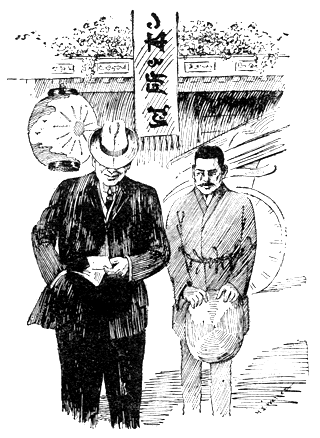
But Ushi's card had pulled a customer
He took from under the seat of his rikisha a green bag, such as lawyers in the United States used to carry.
No, he didn't have his jewels in that bag.
Through Theater Street, we walked, Ushi at my side, with his bag, the street brilliantly lighted and seething with Japanese life.
Both sides were lined with theaters big and little, shooting galleries, sideshows, fakirs' stands—a bit of Coney Island life with Japanese coloring and settings. High and low of Kioto's populace, a city of half a million, surged through Theater Street. A mother with a baby on her back; couples and trios of little girls with their arms around each other's waists; and girls in bevies. Swains and sweethearts. Big boys and little ones. Kids just able to walk, all sorts, all conditions. Theater Street in Kioto of an evening is worth seeing.
Ushi took me to the leading theater, up to the ticket window, and told me it was on the evening's program to go to that show.
Ushi was boss.
I bought a ticket for ten cents and Ushi led me to the entrance and bade me halt and hoist. At the side of the entrance was a great stack of Japanese wooden street shoes, the owners of which were in the theater. 83
I would not be allowed in that theater without removing my shoes if it were not for Ushi with his bag. Hence Ushi's command to halt and hoist.
Down on his knees at my feet went Ushi, opened his bag, and selected from it a pair of cloth footgear to slip on over my shoes. An assortment of these things he carried, small, medium and large. Fortunate for me, he had an assortment—he found some big enough to go over my shoes, tied them around my ankles, and I was shod with the preparation necessary to take in a Japanese theater.
Twenty minutes of the show sufficed, and I came out and found Ushi waiting for me. He took off those cloth over-shoes, put them in his bag, and led me to his rikisha.
For two hours Ushi showed me Kioto by electric light, taking me rapidly through thoroughfare after thoroughfare, pointing out and explaining points of interest as we passed, always on a rapid trot. Now a leading business house, here a temple, there a leading Japanese hotel—down through the underworld, threading narrow streets and dark alleys, over a famous bridge, across, and through, and back again, always on his rapid trot, an eight or nine miles' run, at last to drop the shafts of his rikisha at the entrance to my hotel. 84
Ushi wiped the sweat from his beetling brow and demanded twenty cents for that evening's service. Yes, sir, Ushi thought he was entitled to twenty cents!
"Ushi," I said, "tomorrow, Sunday, I'll hire you for the day," and Ushi said, "Good-night," well pleased.
I went into my hotel, showed Ushi's card to mine host, the Japanese proprietor, and said: "Ushi is quite a character."
"Beware of him," mine host replied, "he is not reliable. He used to work for us, but we had to dismiss him, and now he has gone and got those cards printed, and has stationed himself just outside our gate. He has cut under the regular prices (a yen and a half a day is our regular rikisha men's charge), and he seeks to capture trade with that card."
"So?" I replied.
I read the card again, and thought, "Ushi, you clever rascal. Somehow my heart warms up to you. Competition's fierce, Ushi, and it's war, alias 'hell,' to make a livin'"—and I went to sleep that night with designs on Ushi's time for the morrow.
Bright and early next morning, after breakfast, I stepped outside the gate, and Ushi, the "rascal," who was doing business "near a HoTeL," greeted 85 me with a smile, briskly arranged the seat to his rikisha and stepped aside for me to take my place.
I didn't get in. I said, "Ushi, you got a family?"
"No," Ushi said.
"What? No wife, no children?"
"No," Ushi said, "my wife, she die. Very sorry."
"Tough luck, Ushi," I said.
"Lost your wife, lost your job. Life's made up of lights and shadows. You don't fit into the color scheme for my day's program, Ushi. I must have a rikisha man with a wife and children," and I walked away, leaving Ushi standing there, sadly watching an all day's job go glimmering.
I stepped back into the yard, looked over the semi-circle of rikisha boys, accredited, guaranteed, within the pale rikisha boys, boys of reputation, standing and character. No "rascals" who had to resort to the "nefarious" expedient of issuing cards like Ushi's, and standing "outside the gate" to secure trade at a cut price.
I stepped up to one who looked the best to me and said: "What is your name?"
"Yamamoto. You want rikisha?"
"Yamamoto, you got wife and children?"
"Yes," wonderingly.
"How many children, Yamamoto?"
"Three, two girls and a boy." 86
"Yamamoto, I'll hire you for the day," and Yamamoto fixed the seat and asked: "Where go?"
"Take me out first to where Ushi stands."
Ushi wasn't standing. He was sitting, dejectedly, on the dashboard of his rikisha, waiting for someone to come along on whom he could spring his card—that "nefarious" card that cut the rates, and as he saw me draw up seated in Yamamoto's rikisha—Yamamoto, favored of fortune, taking off his fare, Ushi cast a reproachful glance on me.
"Ushi, what for you mope? Didn't I make a deal with you last night to be my rikisha boy today? Hitch on behind and push, Ushi—what difference if you pull or push? That yen is yours when night shall come."
Ushi caught on—behind. He left his rikisha standing by the wall. There's some class to serve a man who'll hire a rikisha boy to push as well as one to pull in Kioto, and with reckless abandon I had decided to blow myself for a whole dollar and twenty-five cents for ten hours' horse and carriage hire that day, just because Ushi didn't have a family.
If Ushi hadn't lost his wife, and if he had had a pickaninny or two, I'd got off for fifty cents and could have given my story the twist I'd planned for it.
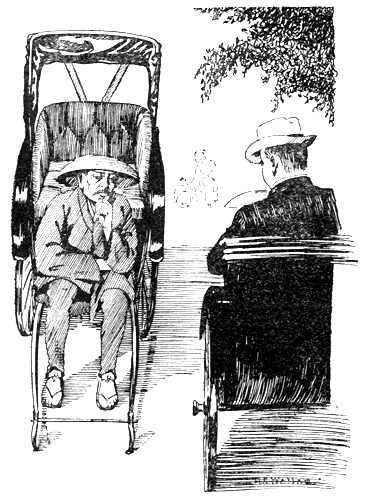
"Ushi, what for you mope? Didn't I make a deal with you last night to be my rikisha boy today? Hitch on behind and push, Ushi"
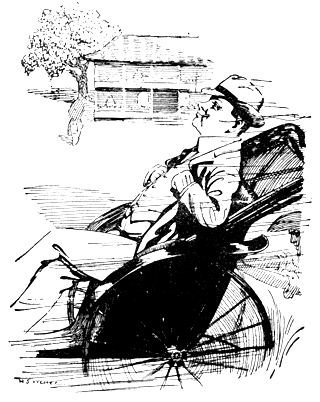
With reckless abandon I had decided to blow myself for a whole dollar and twenty-five cents for ten hours' horse and carriage hire
But East or West or North or South the picking is always good for a story in Japan, and while to tell it as it is may not be so spectacular, at least it's safe.
My old grandfather, who was somewhat of a sage, once said to me (and his words of wisdom have survived the years), "George, a man must have an excellent memory to be a successful liar." I have a wretched memory, so the beaten, conservative, humdrum path of narrative for me.
With Ushi duly coupled on behind—"Where go?" Yamamoto asked. The pride of a double team was noticeable.
Now "Missouri's" hard luck in his missionary hunt with an automobile had inspired me to do a little investigating of this world's work on my own account, but in a more humble way. So I gave Yamamoto the address of a leading missionary, which I had easily secured from mine host, the hotel man.
"I know," Yamamoto said, "other side Emperor's palace, thirty minutes."
With Ushi on behind the ground fairly flew under us and Yamamoto and Ushi vied with each other to tell about the points of interest that we passed.
In less than thirty minutes I was landed at the missionary's gate. 90
"Man, man," I said, waving my hand to my coolies as I alighted. Say "man, man" to your rikisha coolie when you leave him and you'll find him right there waiting for you when you come back. It's an imaginary hitching strap I've never known to break.
The missionary met me at the door and I told him who I was—a wayfaring man in Japan, and would he show me somewhat of his work?
He would, and gladly. If I had been a long lost brother or a wealthy uncle with a will to make, he couldn't have been more cordial—a keen young man of thirty-six or thirty-eight I found this missionary.
"Do you mind walking?" he asked.
"I have a team of rikisha coolies at your gate," I said.
"Well," he replied, "our work is scattered over Kioto. We can reach it by trolleys and walking, with an occasional rikisha ride between trolley lines, better than to try to do it all by rikisha from here. Better pay off your coolies and dismiss them."
"I've chartered them for the day," I said.
We started out to see the missionary work in Kioto, that young missionary and I. 92
At the gate I told my boys to loaf, or play, or fish, or pick up fares which they might pocket for themselves—they were on my payroll for the day—but to report for duty there at the gate at 1 P. M.
The missionary and I walked a mile and passed two of his mission churches on the way, where services were being held, and which through the week were used for schools and meetings; the missionary dispensing tracts as we walked along. That young missionary seemed to exude tracts—I didn't know one missionary could hold so many.
We boarded a trolley, and all the passengers got a tract. We dismounted at a corner to look over another mission church where the natives were holding a meeting; a little walk and we boarded another trolley and the missionary started in to give the passengers tracts.
"Here, dominie," I said, "give me some of those tracts and I'll help you to push God's word along"—I rather surmised by then that he was out of tracts and had a momentary—just a teenty, decent little momentary pang of shame that I hadn't offered sooner.
But the missionary wasn't out of tracts. His clothes were full of pockets and they all held tracts. He dug up a pack and handed them to me.
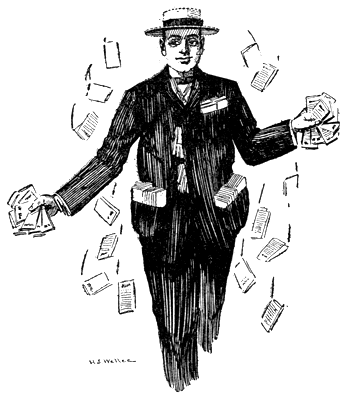
That missionary seemed to exude tracts—I didn't know one missionary could hold so many
I started at one end of the car and he at the other, and every Jap in that car had a tract when we met midway.
We must have boarded six more trolley cars and still the tracts held out, and I had a few left in my pocket after the last car was served.
No tract was thrown away. They were read on the spot and then safely tucked away in the folds of kimonos, or respectfully received and tucked away to be carried home and read.
Every tract would serve five readers, on an average, the missionary told me.
We looked in on little mission churches scattered over Kioto, all under the jurisdiction of that one missionary. He told me how, through himself, his board had bought land and built the little missions, or were renting places for their work.
We worked our way across that tremendous town and at the end of a rikisha ride he showed me his chief pride—a plot of several lots he'd bought, and on them erected a splendid church at the very gates of one of Japan's chief universities of learning.
Ten thousand dollars had been donated toward the work by an American soap manufacturer who had visited Kioto and seen his work, and placed 95 the cash in the young man's hands to build that church.
"Dominie," I asked, as we worked our way back to his home, via rikisha, trolleys and on foot, "what is your yearly budget for all this work you are carrying on here in Kioto?"
"Twenty-five hundred gold dollars," he told me. His and his wife's salary (he married a missionary) was $750.00 each.
Only one thousand dollars for the annual expense, outside their salaries, to pay for tracts and current expenses for the work—native preachers and teachers to keep the enterprise going—twenty-five hundred dollars came from the homeland to push the gospel in Kioto under his charge.
I mentally took this missionary's measure as he told me his story. He was more than preacher, as we know the ordinary type at home. Of necessity his was a wider range of activities; a business man, a man of affairs, keen, alert, his eye on the gun.
His heart was in his work, to hold up his end in bringing over to Christianity a constituency of half a million souls—a young man putting in ability which, if as intelligently and earnestly directed in a business career in America, should 96 win him ten, twenty—who knows how many thousand dollars per year reward?
I doubt if a guarantee of that difference in pay would tempt the young man from his chosen work—at least that was the impression I got as he unburdened his heart to me.
The young man had a vision of things worth more to him than money.
We wound up the forenoon tour at one o'clock at a union meeting of missionaries—got in as the meeting was drawing to an end.
He introduced me to these missionaries as they passed out at the close. I told each one whose hand I shook that the meeting gave me pleasure, and handed out a tract.
One or two of the bunch without the saving sense of humor the Lord meant all should have, didn't receive them as gratefully as the Japanese I passed them to—it takes all kinds of folks to make a world, I find, and most all of them are good, I think—but some are better than others.
The best thing in Japan I missed this trip—a kindergarten of Japanese children.
This missionary's wife had, among other things, this work in hand. I saw the room and the little empty chairs where fifty Japanese children, of from 98 three to five years, were taught.
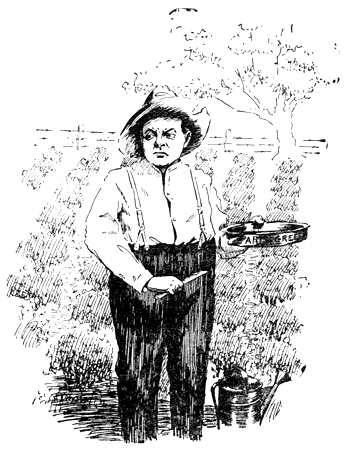
Except potato bugs, I always want to poison them
Babies are always a lot of fun. The young of the animal kingdom are always interesting—a baby colt, a baby calf, or pig, or dog, or cat—I can't think of the young of anything that don't appeal to me (except potato bugs—I always want to poison them), and most of all human babies. I'd turn aside from any task to see a lot of babies in a bunch.
But fifty Japanese babies in their fantastic clothes doing kindergarten stunts—my eye! a show to please the gods!
The obsequies of the Empress Dowager had closed the kindergarten school for days, and I missed the best show in Japan.
The missionary and his wife insisted that I take lunch with them. My team of coolies were champing at their bits—my lunch was ready at my hotel—I told them so. They told me that the hotel would excuse me and they would not.
After lunch at the missionary's I found my team at the gate spoiling for a run.
"Yamamoto, take me to your home," I said; "I want to meet your family. I want to see how a rikisha man lives. And, Yamamoto, I'll give you a yen if you'll invite me to supper at your home tonight."
The yen looked tempting, but Yamamoto wouldn't play the game.
He said to have a foreigner as a guest at his humble home would bring around his house such a crowd of curious neighbors that all pleasure in the repast would be spoiled—or words to that effect; but he would take me to his home. Off we started, a three-mile run; Ushi pushed and Yamamoto pulled, and I was soon a self-invited guest in Yamamoto's home; and, if to break bread or chopstick rice in Yamamoto's home would have brought a greater horde of curious neighbors than gathered to witness a foreigner's call at that home, then 101 Yamamoto's head was level—Yamamoto's head was level anyway.
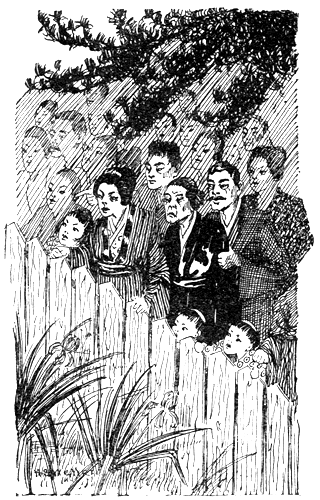
He said to have a foreigner as a guest at his humble home would bring around his house such a crowd of curious neighbors
A little house 8 x 16, two rooms 8 x 8, the front opening on a street about eight feet wide; a yard in the rear 6 x 8, was Yamamoto's home.
It was as neat as wax and furnished with an hibachi on which to cook, a tanstu in which to store their clothes. No chairs—they sit on the floor; no beds, save futons, to lay on the floor; and an okimono dai, a sort of what-not stand, on which a few ornaments and articles of household use were placed.
The wife was gone for the day, but his children were at home, and a more interesting trio of children one wouldn't ask to meet.
My team took me back to the hotel. I dismissed them for the day at five o'clock. I paid off Ushi, and made a deal with Yamamoto to go home and write me the story of his life. I told him I'd pay him a yen to tell me all about himself, his family, how they lived, and what it cost. To bring me the letter written the next morning and get one yen fifty for the day and an extra yen for the letter. Two yen fifty I would hand him in the morning when he handed me the letter; and Yamamoto said he would, and Yamamoto did—I imagine one of his daughters did the writing. 102
Here is an exact translation of Yamamoto's letter as he handed it to me the next morning—and Yamamoto has his stand within the wall, but Ushi does business without the gate:
The present living condition of Tokichi Yamamoto. He was born in the 12st May 2nd year Meiji 1869. I was born and bred in the city of Kioto, and have been engaging in the job of Rikisha for these twenty years, and my family is consisting of my wife and three children. Elder and younger girls who have had finished the whole course of the Primary school (4 years), and they are now working in the factory of the Tobacco Monopoly Buelow, and the young son is attending the Primary school.
I am somewhat puzzling with the expense of living. My estimated income is 30 yen each month in the months of April, May, October and November and the rest of is about 18 yen per month, therefore, I make it average, it becomes about 22 yen per month, and two girls get 16 yen, so all the income of my house is reckoned 38 yen per month.
The elder sister has just abandoned her work in the factory, and she attends a house for learning of sewing. The list of paying out a month:
| House rent | 3.00 | yen |
| City tax and town expense | .50 | |
| The expense of education | 1.10 | |
| The rice charge | 12.00 | |
| Wood, charcoal and oil | 1.30 | |
| Vegetable and fish | 7.00 | |
| Dressing charges | 3.00 | |
| Miscellaneous expense | 5.00 | |
| Total | 32.90 | * |
* $16.45 American money.
Fortunately I am in robust health. Though I am not educated myself, I am thinking that the dutifulness and truthfulness are the most important to intercourse with people, and as I am truthful and dutiful to my friends, I am rather welcomed by them.
Before starting on this around-the-world trip a friend of mine in the United States said to me: "When you get to Shanghai look up my friend, Dr. "John Blank." He has been in China over thirty years. He is the biggest individual intellectual asset in China today—the founder and moving spirit of an International Institute which recognizes the good in all religions and gives them all a hearing.
"He is a graduate of Hamilton College in your town of Clinton. He is a strong, a busy man, and true. Please look him up and arrest his attention long enough to give him my regards"—and I promised this enthusiastic friend of "John Blank's" I would do this thing.
"Missouri" had, by rare good luck, driven his business in Japan ahead of him to such purpose that he was ready to sail on the same ship that brought me from Nagasaki to Shanghai. He had, in his peregrinations through Japan, run his intense Americanism plumb against an English tea. Somehow, 104 when "Missouri" and an English tea collided the tea got spilt—as "Missouri" told me the tale en route from Nagasaki to Shanghai the tea took second honors.
Arriving in Shanghai, "Missouri" went his way on business bent, while I looked up Dr. "John Blank," only to find that this busy man was out of town, and I regretted that I should have to disappoint our mutual friend and not be able to deliver his regards to Dr. "Blank." And I took a railroad trip to Pekin.
While I have come to China several times, until this trip I had never ridden a mile on a railroad in China, nor had I been north of Shanghai, and I was full of curiosity to see what I should see on a thousand-mile ride through China with its teeming millions.
At eleven P. M. of a sweltering night I found myself ensconced in a very comfortable sleeping car, composed of commodious staterooms of four berths each, two upper and two lower, and as the only traveling companion to share my stateroom, a young German of twenty-six years.
He was a keen young chap who had right ideas of life. Dropped in Shanghai four years ago, with an expired term in the German navy and fifty Mexican dollars in his pocket, bare-handed and alone, 105 he had hit the Orient with such sturdy resolution and solid German sense that he had, in four short years, added to the fifty Mex. a young Urasian wife, half German and half Chinese (he assured me she was the dearest, sweetest little thing), a baby, and nine thousand good hard Mexican dollars in the bank.
A feat like that is worth mentioning—when you know the Orient—they don't all do so well, even with pull and influence to help.
It's good to have a chap like that, a right-principled, wholesome chap, who can speak your tongue and Chinese as well, in the berth across from you on a lonesome thousand-mile trip through China. A night's run and Nankin is reached at seven A. M. with a three hours' wait for breakfast, and to ferry across the Yangtze to Pukow to connect, at ten A. M., with the Pukow-Tientsin road—then settling down in a comfortable train, carrying a good restaurant car, for a ride of thirty hours without change of cars until we should reach Tientsin.
For an hour we followed up the delta of the Yangtze, low, level land devoted to rice culture, splendidly tilled. The only remarkable thing about the landscape was dearth of population.
We passed no towns of any size. A lonesome railroad station, now and then some little mud-walled, 106 straw-thatched hamlets. A like ride over such agricultural land in any of our Middle States at home would show much greater evidence of population.
Then for another hour a poor strip of territory, a hilly, semi-barren country, then we rolled out onto level plains which stayed with us until darkness shut out the scene.
From a little after noon till dark on a day in early June we passed through Illinois and Iowa land, prairies bounded by the horizon, with fields of waving wheat and barley just coming into harvest, and fields of corn and beans six inches high. And in all that seven or eight hours of travel, at an average speed of twenty-five miles an hour, we passed no city of any size.
Lonesome, solidly well-built brick railroad stations, at long intervals villages and hamlets, set back from the railroad, of the same one-story, mud-walled, thatched construction.
The wonder to me was: Where did the population live to till the land so thoroughly?—for it was all tilled like a well-kept garden. Where the early wheat and barley was harvested it was threshed on threshing floors, even as Boaz threshed his grain, and all of those millions of acres of grain we passed was cut either with a crude cradle or sickle, or 107 pulled up by the roots; and the farm animals used were the caribou, the ox, and ass.
No fences, no wagon roads. Where one man's land ended and another man's began you'd never guess, viewed from the car windows.
And all that plain defaced with graves! Out in the fields, helter-skelter, here and there. Here a single grave, there two or three, again six in a row. Pa, and ma, and brother John, sister Ann, and Will, and baby Tim, were buried there. Pa had a big grave. Ma's not so large, and tapering down in size to a small one for baby Tim, all of the same pattern; a haycock-shaped mound of earth topped with a wad of mud.
I had it in for the geography I studied as a boy that told me of China's teeming population. That geography told me that China was so full of folks that to support the congested population they loaded dirt onto flat boats and moored those boats in rivers and utilized the ground thus made for gardens—and in that same geography lesson I learned that these boats were called flower boats.
The erudite writer of that geography got mixed in his metaphors. The flower boats of China have been pointed out to me in the rivers of China. They are places where "gilded youth" resort, and it is not 108 garden truck they raise on them, but Sherman's definition of war—but let it pass.
Night shut out the scene, and morning dawned and found us at a city. I was glad to find a city in China, and here I lost my German friend. I regretted the parting, for I could talk to him. We were in a mountainous country now with some vegetation snatched in spots. Not much, but some, and through this strip of meagre land they had good stone houses and wagon roads—and it looked more prosperous and more like folks back home.
For a couple of hours we passed through that kind of country, then came out onto prairies, and as far as the eye could reach the same sparse population, mud huts, and ugly graves, but all tilled like a well-kept garden. I'd lost my German friend for six hours now—and from morning until noon, having had no one to talk to, there had accumulated in me a considerable store of oratory.
We had stopped at a splendid brick station—perhaps some day a town will grow around that spot—and I got out to stretch my legs. A row of Chinese soldiers stood on guard; and in good old United States, the only tongue I speak, I broke loose on one of them: "China is a fine country, sir," I said; "a fine country, sir. The agricultural possibilities of China, sir, are great! Your boundless 109 plains and mighty rivers are grand, sir; grand! Unshackled from your past, you've burst the bands of superstition, lethargy, inertia. You've climbed out of your rut. Unleashed from all your past, you've grasped the pregnant present, and now, with your eyes turned to the mighty achievements yet to come—with this glorious new Republic you've achieved, what the future holds for China is impressive, sir; impressive."
The soldier said something in Chinese.
"This railroad over which I've ridden, sir, is an earnest of greater things in store for China. The rolling stock is fine, the road well built, and wonderfully well ballasted.
"There is little left to be desired in the service on your trains. With the architectural taste displayed in this splendid station house, none but a carping critic could find fault. I'm pleased with what I've seen, sir; pleased—delighted, sir."
The soldier said something in Chinese.
I felt a good deal better after what I'd said, and I think what the soldier said made a hit with him, but we weren't getting anywhere, when, at that moment, there came along a foreigner to board the train. He'd overheard part of my talk. He looked at me and said: "You're from the United States, aren't you?"
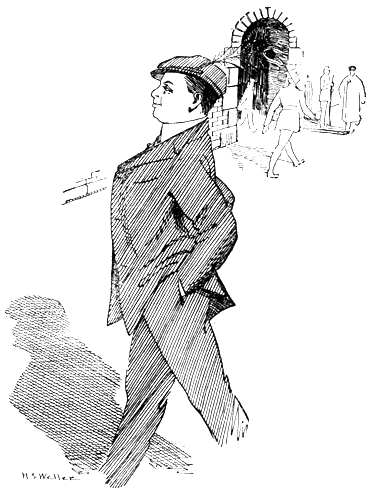
I felt a good deal better after what I'd said, and I think what the soldier said made a hit with him
"Pretty near," I said.
"Oh, from Canada?" he asked.
"No," I said, "I'm from New York State."
"Why," he said, "I was educated in Oneida County, your State."
"Indeed!" I said. "What institution?"
"Hamilton College," he said.
"And your name is?"
"'John Blank'," said he. With a mighty bound I landed in that man's arms. I fell on his neck and wept.
"Dr. 'Blank'," I said, "you're the one man in China I'm looking for. I have a warrant for your arrest."
We got into the dining car, and dined and talked, and talked and dined, and talked, until we reached Tientsin, four hours later.
We changed cars there and rode into Pekin. All the way it was the same level country, well-tilled fields, mud huts, and ugly graves. From Tientsin, a city of 1,000,000, to Pekin, a city of 1,300,000, is ninety miles, and not one-tenth the population in evidence that you'll find on that ninety-mile ride between New York and Philadelphia.
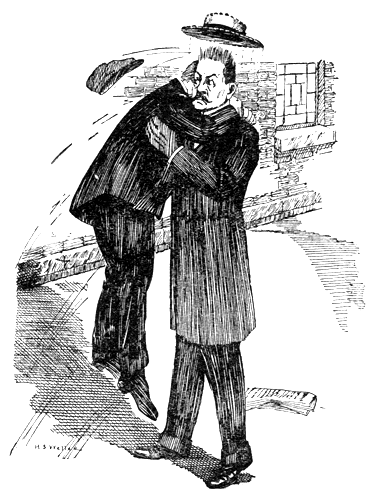
With a mighty bound I landed in that man's arms
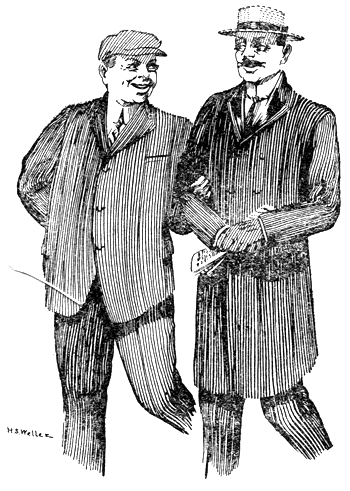
"Dr. 'Blank'," I said, "you're the one man in China I'm looking for. I have a warrant for your arrest"
I was glad of the opportunity to come to Pekin, where I might see with my own eyes a Pekin cart.
Modes of travel and transportation have always had a fascination for me.
For instance, I was so captivated with the Shanghai wheelbarrows, that the first thing I did after arriving in Shanghai on my first trip to China was to tackle the first Chinaman I saw in the street pushing one of those empty barrows, dicker with him, and then and there buy that wheelbarrow.
Three dollars was the consideration, but, with first cost, boxing, freight, and duty it cost me $29.05 landed in Clinton—and I've never regretted the purchase.
When telling circles of chance acquaintances and friends at home that a Chinaman would carry a mixed cargo of from five to ten thousand tons on one of those barrows, the chance acquaintances would cast significant glances and cough, while my dear friends would hand me life membership cards in the Ananias Club.
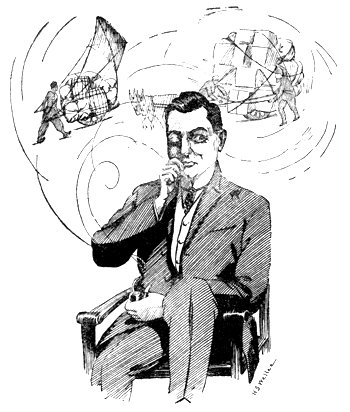
The chance acquaintances would cast significant glances and cough
My only regret in the matter is, that in telling about the Shanghai wheelbarrow I was not acquainted with all its possibilities. When a chance acquaintance doubts my word it's immaterial to me whether he is caught with a nasty little hacking cough, or contracts a violent and fatal congestive chill, and as for those dear doubting Thomas friends of mine who, from me, might have stood for a load of, say from three to five thousand tons—for their benefit I want to chronicle here that as you travel north from Shanghai they put bigger loads on that same pattern of wheelbarrow and rig them up with mules or sails, and I have photographs to prove it; and apologies will be accepted.
Now as to the Pekin cart:
We have all read of it and seen pictures of it, and travelers, irresponsible travelers of no reputation, or travelers without a sensitive and jealous regard for their veracity, have so misled me about that vehicle that what I expected to see was two wheels sawed off the end of a log, set on an axletree, a hood covering, and two stiff saplings for shafts. And, as I shut my eyes to let the picture sink in and tried to recall the motive power, I couldn't recall that there was any motive power. The cart was stuck in an awful rut in the streets of Pekin, and even though motionless, I could hear it squeak. 117 A dead dog was lying to the right of the cart, the carcasses of a couple of cats to the left, and in the cart a load of human corpses—the life having been joggled out of them by being jounced over the awful ruts in the Pekin streets.
But now I find the Pekin cart with a well-tired wheel, having a felloe six inches wide, and for ornamentation studded thickly with wrought-iron headed nails the size of boiler rivets. The wheel is thickly set with spokes centering in a splendid hub set on a well-oiled axletree. The hood, however, is true to the picture, but the whole affair is varnished and shines like an undertaker's cart; and hitched to it is the most splendid mule I have ever seen in all my wanderings.
That mule would redeem any kind of a vehicle he might be hitched to—such a large, fat, well-groomed, glossy mule.
His ears are several sizes shorter than those of the mule of story and of song—an urbane, genial, gentle, loving-looking mule—I don't believe the Pekin mule would kick. Judged from the obvious care that's bestowed on him, the Pekin mule has no kick coming.
And the ruts in the streets of Pekin?—there are no ruts. Wide thoroughfares, well paved. 118
And the rubbish in the streets? Not there. It's a fairly clean city; a city of many modern and splendid buildings. A city of many legations set in ample grounds, with beautiful and imposing entrances bordered with trees, shrubbery and flowers. A city of ancient Chinese temples; a city set in a fertile plain and walled about—Pekin is a different-looking city than I expected to see.
Martial law prevails—the country is under martial law.
China a republic? A joke!
No more absolute monarchy could be imagined than Yuan Shih-Kai's China today.
An upper and lower house of his own choosing, an autocrat, a dictator, wishing for the old order, and himself the emperor. These are pretty generally the opinions you'll hear expressed. He seems to be the one statesman in a country of 400,000,000 whom foreigners and Chinese generally center on as the only man to hold the reins. Hated by many, feared by more, plots and counterplots against his life—all agree that chaos would result were he taken away.
China today, some say, is a smoldering volcano, but more will not venture an opinion as to what the future holds for her. 119
With her centuries of conservatism drilled into a population which has submitted to official greed and graft, and accepted it as a matter of course, China has few statesmen, none on the horizon to contest the supremacy of Yuan Shih-Kai, who has seized the reins of power. That China has not fallen to pieces long before is the wonder of students who have spent their lives in China, and the most profound opinion hazarded is—she has lumbered along because she has; and because she has, the chances are she will continue to lumber along. What seems to be her weakness is her strength—400,000,000 patient endurers, with power to endure and not ask too much for the privilege to exist. There are no other people with their peculiar temperament. With a nervous organization that don't give way to trifles, a people who can grin and bear it—this seems to be the opinion of those who are in best position to render judgment.
Greedy nations have stood by and waited for her to fall to pieces, and are even now waiting. China has fooled them right along, and she may fool them yet a spell—so keep your eye on China, but keep on winking.
I found "Missouri" in Shanghai on my return from Pekin, and he seemed to be in a dejected mood. Something had evidently gone wrong with him.
"How do you like Shanghai, 'Missouri'?" I asked.
"Fine," "Missouri" said. "Good town—lot of go."
"Had any rides on these Shanghai wheelbarrows?"
"Missouri" only grinned and didn't go off into wild, exuberant enthusiasm, by which token I knew there must be something the matter with "Missouri."
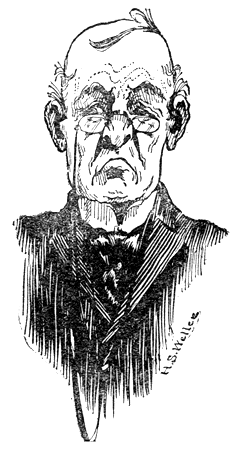
There are some Americans whom even a Shanghai wheelbarrow don't particularly interest
There are some Americans whom even a Shanghai wheelbarrow don't particularly interest. But there are some Americans who can't see anything particularly interesting in lots of things; who go mooning along through life; who, if you told them the moon was made of green cheese, would get into an argument with you on the subject and tell you there must be some mistake about it. But from what I'd seen of "Missouri" I didn't put him down 122 for that kind of an American; and I knew there must have something gone wrong with him or else he'd have warmed up over the wheelbarrows in Shanghai.
"Business bum, 'Missouri'?" I asked.
"Nope," said "Missouri." "Done better than I expected to."
"What's the matter, 'Missouri'?" I asked. "Your false teeth aren't aching are they? You seem to lack enthusiasm. Anything gone wrong since I saw you last? Bad news from home? Long on mules and the bottom dropped out of the market? Has the treasurer of the Epworth League at home run off with the funds, or has your bank cashier run off with your safe?"
"Say, Mr. Allen, the bank's all right. Mules and horses are O. K. Everything is lovely so far as the outcome of my trip is concerned in a business way.
"But that Epworth League is no joke. You see, my town is looking for me to bring home a report on the missionary game out here in the Far East.
"As I've told you, I'm a fairly good proposition where I live—an easy mark when it comes to digging down and boosting anything worth boosting.
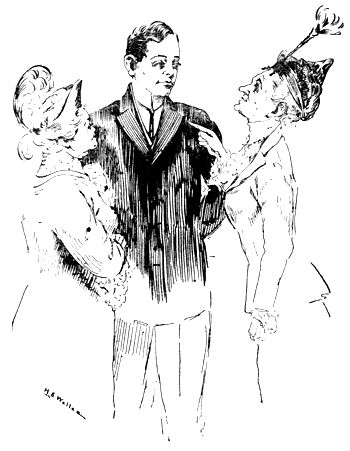
"Women who are interested in foreign missions and preachers in our town set quite a store by me"
"Women who are interested in foreign missions and the preachers in our town set quite a store by 124 me, and I was given that commission to look up the missionary in Tokio and report on his work, and you know all about how I came out on that enterprise.
"I got tied up in Japan, so I didn't go to look his field over—thought I wouldn't have any trouble to get next to missionaries out here, and when you told me how you came out with that missionary in Kioto, I thought it would be a cinch to take back a report from some of these posts.
"Say, Mr. Allen, I'm never going to get funny again as long as I live, if I ever have anything more to do with the 'cloth.'
"After you left me to run up to Pekin I got things shaped around here in Shanghai where I could spare a day, so I looked up the missionaries in the city directory, and by a little inquiry, located one who was said to be a hot tomolie in his line. Didn't have a letter of introduction to him, but banked on my general appearance to carry me through.
"I found my man and told him where I was from. I noticed he was a solemn-looking individual. I lit into him in a more or less free-and-easy way, and that's where I got in bad with that particular dispenser of the gospel to the heathen. 125
"I told him that I was a business man and that I wanted to learn something of the missionary work to tell about it when I got home.
"From what you'd told me of your experience in Kioto, I rather expected he would enthuse somewhat.
"But he didn't enthuse.
"He made a diamond of the index fingers and thumbs of his hands, held them in front of him, and waited for me to proceed. I looked at him—I looked at him twice. And then I told him of my effort in Tokio.
"I said: 'I started out to do this thing in Tokio; started one Sunday morning, but got tied up in a saki house, where I met a delightful bunch, and didn't get away from that saloon till five o'clock in the afternoon, and I have yet to come in personal contact with the missionary work in the Far East.'
"I meant to say something that would jar his hands out of the position they were in, but it didn't work that way.
"He kept them held just so, and his mouth took on something of the same shape. For about a minute as I looked at what was in front of me I couldn't think of anything but the two of diamonds. Between you and me, that missionary is a two-spot, all right.
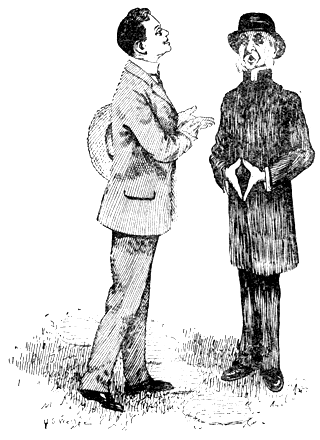
"For about a minute, as I looked at what was in front of me, I couldn't think of anything but the two of diamonds"
"Then I elaborately explained about the automobile breaking down in front of the saki house, and how the keepers of the saki house had befriended us, but the whole story didn't warm him up.
"I discoursed along and tried to overcome the bad impression I had made. I did my level best to make that chap see that while I didn't have any letter of introduction, that it might be well to consider strangers, because we've Holy Writ for it that by so doing a good many have caught angels unawares.
"But that fellow couldn't see any angel in me. He acted as if I had hoofs and horns.
"I was having the time of my life to get through that missionary's crust. I did enough mental and 'charming personality' work to sell a trainload of mules to a business man.
"It was a one-sided confab, but I didn't propose to give it up. I said to myself: 'I've pulled over harder deals in my life than mellowing up and bringing this missionary around.' I went along careful like, discoursing and discussing (if one man doing all the talking could be called discussing)—I'd cash a stranger's check at our bank on half as good a showing as I was making—and I rather thought I was getting by. 128
"He had shut his mouth, and while he held his hands in that same position, with his mouth shut, he didn't remind me so much of a two-spot. He looked more like an ace, and I thought I was winning.
"And then I let go one that gave him the opening he'd evidently been waiting for. I told him that I hadn't found the cordial relations existing between the business men of the Orient and the missionary cause I had expected I would find—and then he said something. What do you think that missionary said to me, Mr. Allen?"
"I haven't an idea, 'Missouri'. What did he say?"
"Humph!" snorted 'Missouri'. "He said: 'You have probably gathered your information of the missionary work in the Far East from your bar-room associates'."
I laughed. "Hard luck, 'Missouri'. Did you tell him about the funnel and anæsthetic?"
"I did not," disgustedly. "I left him encased in his armor plate of self-righteousness." 129
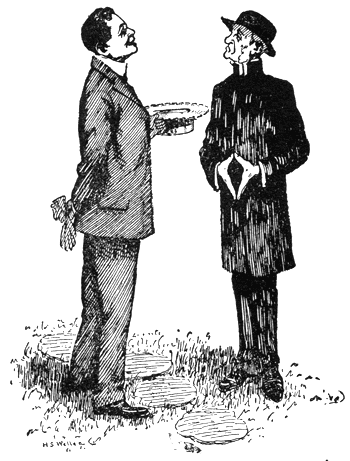
"Humph!" snorted "Missouri," "he said, 'You've probably gathered your information of the missionary work in the Far East from your bar-room associates'"
"Oh, forget it, 'Missouri'," I said. "The missionary work is a tremendous undertaking. There are thousands of missionaries scattered over the world. You can't pick out thousands of men for any great work, in religion, business, politics, or war, without 130 occasionally drafting one whom the French so graphically describe as 'damphol.' That particular missionary has evidently missed his calling."
"Um," "Missouri" pondered meditatively. "Just what sort of a calling would fit that kind of a man? I wouldn't undertake to make a banker of him. I wouldn't trust him with a big mule deal. He'd scare trade away from a country store"—
"Forget it, 'Missouri.' Let's take a wheelbarrow ride and you can use my Kioto experience when you get home—just tell it to your good people as if it had happened to you. Or, if you have time when you get to Canton, go and call on my friend S——.
"He is a missionary. I won't let him know that you are coming to see him, and I won't give you a letter of introduction to him—you won't need a letter.
"Go at him just as you did at your 'two-spot'—you won't fool him—he'll see back of it. You wouldn't have fooled me in Yokohama if you'd declaimed it instead of writing it to me. You're something of a josher, 'Missouri,' but you don't exactly impress even the ordinary run as a gleaner of your views from bar-room associates.
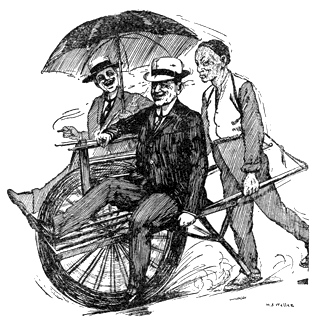
As we jounced along over the bridge in front of our hotel on a Shanghai wheelbarrow
"S—— would have made a whale of a business man if he hadn't given his life to missions. He's 132 a whale of a business man as it is. I misjudge him, and I misjudge you, if he don't work you for a contribution to foreign missions that will make the Board in New York throw up their hats when they hear of it, and show you a story to take back home that will make the tight-wads in your community loosen up when the hat is passed around for foreign missions."
As we jounced along over the bridge in front of our hotel and along the bund on a Shanghai wheelbarrow, passing mixed cargoes of merchandise and passengers on those same homely vehicles, and as I explained to "Missouri" how those were only little loads, how up north they piled on more and more and then rigged them up with sails, the absolute ludicrousness of it all made "Missouri" forget his grouch, and he promised me that he'd try to look up S—— in Canton—and I thought I saw where Missouri mules might be hitched to Foreign Missions—and that's some motive power.
Since starting my series of travel letters, word has come to me that some of my readers are disappointed that I shied at a description of seasickness—an eminently looked-for and expected dissertation—and instead went off on a tangent about false teeth, which was not in the regular line of letters of travel; and I also learn that the hope is entertained that I will not close this series without describing a storm at sea, the which is a regular, fit, and greatly-to-be-desired adjunct to such a series of letters as I am writing.
I have written on former occasions a description of St. Peter's Church at Rome, taken a running jump at the Pyramids, and once, just once, I wrote a rhapsody—about the Hawaiian Islands—most beautiful spot on earth. But I've always promised myself that I'd leave a sto-o-rm at sea alone.
But when an exacting public drives, a hack must needs travel, and if I must come through with a storm at sea, right here and now is the time and place to do it, as we are in the midst of a typhoon.
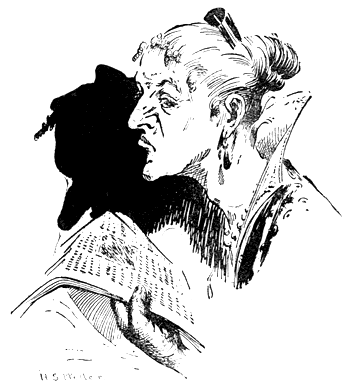
Word has come to me that some of my readers are disappointed that I shied at a description of sea sickness, but instead went off on a tangent about false teeth
Now a typhoon is conceded to be the most colossal kind of a storm, and right here in the China Sea, between Hong Kong and Manila, is the place where they grow the biggest typhoons—this is headquarters for typhoons—and we are now in the midst of the biggest of its kind. So while I have the data right at hand where I can pick it fresh from the hat—get all the local coloring—I'll do the regular and conventional thing, albeit under protest. Ah me! ah my! ah mo! ah me! I say, and then some more. I wish you might be with me now and hear the billows roar. A storm has struck this good old ship, the waves are mountain high, the billows rise, and rise, and rise, and mount up to the sky, while gullies in the vasty deep the valiant ship must try. Down, down she goes, and still down, down, into the depths of hell, and then she strives to rise again on ocean's mighty swell. She climbs, and climbs, and climbs, and climbs—almost she makes the top—the billow breaks—comes crashing down—the ship is in the sop. Ten thousand tons of briny sea come crashing on her deck; another blow like that I fear the gallant ship will wreck. Forked lightning splits the inky sky, with blinding flash on flash, while thunder-bolts shoot up the ship with awful deafening crash. Up through the billows, up she comes, she whoofs, and groans, and creaks—a 136 mightier billow still in store the ship's destruction seeks. She rides the crest, then plunges down to greater depths below; the greedy sea laughs in its glee, then thunderous billows throw o'er bow and poop of fated sloop—they stab her through and through, they wash the captain overboard, likewise his mate and crew. The bos'n and the cook are gone, also the nine-lived cat—on all the ship no soul is spared, no, not one lonesome rat. The ship is lost! Where is the scribe—the boy, oh where is he? Astride the bowsprit, pen in hand, writing a sto-o-rm at sea.
MORAL: Genius should be coaxed, not driven.
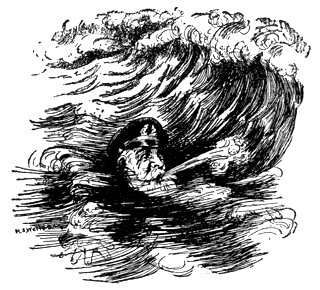
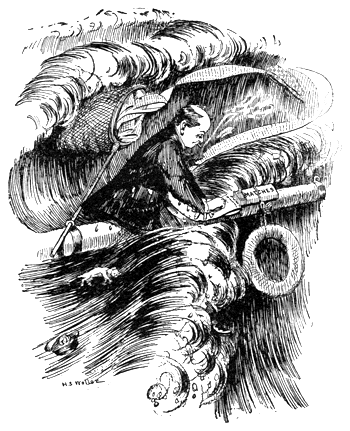
Astride the bowsprit, pen in hand, writing a sto-o-rm at sea
I arrived in Manila—not seasick—I never was seasick in my life (I've mentioned that before, haven't I?)—but anyone who read my last letter with that degree of attention necessary to get the meat out of letters of travel will have gathered that there was a bit of a blow coming over from Hong Kong, and that it was a rough crossing.
Those of my readers who regret that the bowsprit and I reached Manila are no friends of mine, and any invidious remarks they may make about my last letter are of no consequence to me.
The Philippine Islands are a tropical group. There are about 3,000 of them. They lie between five degrees and twenty degrees north latitude, and one hundred and seventeen degrees and one hundred and twenty-seven degrees east longitude, and they contain 120,000 square miles of land.
The Pacific Ocean washes their eastern boundaries and the China sea the western. The largest islands are Luzon and Mindano—Luzon with 139 about 40,000 square miles and Mindano with 36,000. About 400 of the islands are inhabited.
They are quite a big chunk of land, as big as New England, New York, and New Jersey. Winter never comes; three crops of corn can be raised on the same piece of ground in a year, and six crops of corn fodder.
While they are mountainous, they are not so mountainous as Japan, and have broader valleys of rich, fertile land. They are pretty nearly as large as Japan, without its new possessions of Formosa and Korea, the difference in area being about 170,000 square miles in Japan against 120,000 in the Philippines. They are just a little shy of having 9,000,000 inhabitants, who are chocolate brown in color, have straight hair, and in stature are about the size of the Japanese.
Admiral George Dewey of the American navy discovered these islands May 1, 1898. No one except the natives knew anything about them until that momentous date in history.
We were at that time at war with Spain, a decrepit old nation which hadn't progressed beyond torturing bulls for pastime, when Admiral George, walking his fleet out for a constitutional one morning before breakfast, out here in the China Sea, saw something flying the Spanish flag.
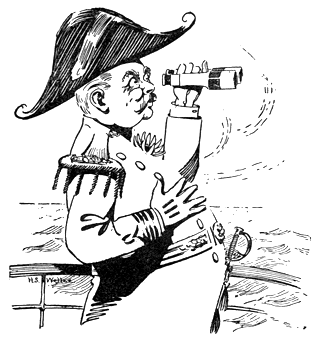
Admiral George Dewey of the American Navy discovered these islands May 1st, 1898
George had got word that we were at war with Spain, and anything flying the Spanish flag was fair game for the doughty George, so he shot it up.
He lowered a boat and rowed off to pick up his game, and found the Philippine Islands.
None of my readers who were old enough at the time to remember anything will fail to recall how the United States went mad with joy over the discovery.
Here this old earth had plugged along until A. D. 1898 and it was supposed that all lands had been discovered except the North and South Poles, and it was pretty well believed if they were ever discovered it wouldn't go very far toward reducing the high cost of living—it was pretty thoroughly believed that it wasn't a good farming country around either of those poles—but to discover, dropped right out of the blue, a veritable Garden of Eden, a land flowing with milk and honey, as big as New England, New York, and New Jersey—our nation went mad, delirious with joy. You all recall it.
When George came sailing home from that wonderful cruise we were for making him President of the United States, and I guess we might have done it if he had known whether he was a Democrat or Republican. 142
As soon as his flagship was seen in the offing on his return, we went off in a small boat to meet him, clambered on deck, and the first question we popped at him was, "George, are you a Democrat or a Republican?"
George said he didn't know—he thought he was a Democrat. Then on second thought he said he was a Democrat.
But things were in such shape at that time that the slightest suspicion of doubt in a candidate's mind as to whether he was a Democrat or Republican spoiled his chances for the Presidency.
Well, I guess!
Why, a fellow out for the Presidency in those times would wear a great big feather plume stuck in his hat and you could hardly see the plume for the prominent words, "I Am a Democrat," displayed on it.
He might buy a new hat, but the same plume would be stuck in it. And vice versa some other chap seeking the Presidency—while he couldn't wear a plume in his hat saying "I Am a Republican" (the fellow with the plume had that device copyrighted), he would have something else just as effective—a newspaper, or a tariff bill, or a sombrero, or something with which he would proclaim from shore to shore, "I Am a Republican." 143
While it was tweedle-dee and tweedle-dum which you were, a term of years of that blatant, persistent advertising declaration was necessary to cop out the Presidency.
George had been so busy discovering new lands that he wasn't hep to this, so when we shot that question at him, he said he didn't know. He knew he was a patriot, and all coons looked alike to George, so that was what he said.
Shucks! With that answer George didn't have any more show for the Presidency than a rabbit.
While we couldn't give him the Presidency, we gave him the most popular outburst of a country's gratitude—the most hilarious, spontaneous, delirious paean of praise ever awarded any discoverer of new lands—Christopher Columbus was a piker.
We bought George a house—he shook the sea, married a wife and settled down and lived happily ever after.
We were so grateful to Spain for locating the islands for George that we paid her $20,000,000, because she needed the money.
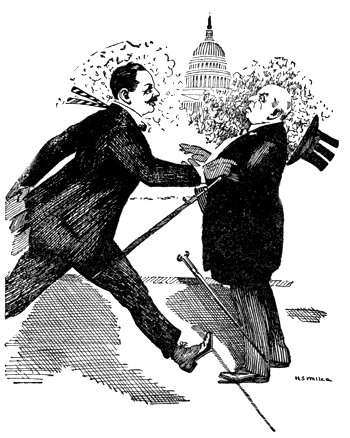
I hit a prominent official in Washington for a free pass on a transport to the Philippines
I got so excited over the new find that I packed my grip, hit a prominent official in Washington for a free pass on a transport to the Philippines—on the grounds of my being an ultra patriotic American—and made a bee line for the Pacific coast. 145 When I got to San Francisco I learned that the next transport for the Philippines wouldn't leave for a week. There was a liner leaving for the Orient that day, so I forfeited my pass and bought a ticket on the liner—I was in a hurry to see these islands. When I got here, shortly after George had discovered them, the Filipinos tried to stuff me with a story about a fellow by the name of Magellan having discovered the islands way back in 1521—blamed if they didn't try to knock out George's patent with a claim of priority.
I looked the islands over from Luzon to Mindano—had a "lovely" time.
I told the Filipinos I didn't take any stock in that alleged Magellan discovery. On their own story about it that discovery was nearly four hundred years old, and, even if it were true, it was moth-eaten, rust-worn, and had no cutting edge.
If they had been discovered nearly four hundred years ago it was high time that there should be some evidence of that discovery to prove it—they hadn't made any use of the discovery.
Manila was the toughest city in the Orient. Dirty, cholera and plague-ridden, out at the elbows and down at the heel, and that general description would apply all over the islands. 146
But the Filipinos set some store by that Magellan myth. The shock of a real discovery set them off and stirred them up, and they set up a republic, alla samee melican man, and proclaimed Aguinaldo President.
Aguinaldo was running around in the woods somewhere, current historians didn't seem to know just where, and wasn't having any marked success with his Presidency; and, after some argument, was persuaded to quit the Presidency and go to farming.
In my last letter I believe I changed my style somewhat and became an historian. I realize I'm serving up several different styles of narrative in these letters, and know it's taking a chance to adopt the historical. History is dry stuff, but another chapter of it seems necessary to clear the situation at this mile-post I'm passing—the Philippine Islands.
You can't get the President of a republic running around in the woods, and as goodly a land as the Philippines in chaos, and then go off and leave it without some further word of explanation than I gave in my last letter, in which I left the President safely anchored on a farm.
The Philippine Islands at this time were in a fearful mess. The natives were half child, half savage. Dirt, vice, degradation, war, pestilence, everything but famine, were the rule—you cannot starve these people; they live in a land of perpetual summer: clothing not a necessity; and they can pick their living off the trees.
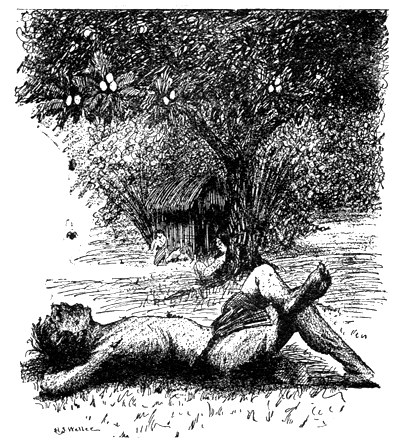
You cannot starve these people; they live in a land of perpetual summer
Under the stimulus of being named "Little Brown Brothers" to the nation which had discovered them, they bucked up and went to it; and they have made the most wonderful progress in the past sixteen years!
From the worst city they have made Manila the best city in the Orient. There is not another city in Japan, China, or India that can equal it in cleanliness and healthfulness, with well-paved roads running through it, and leading out from it in all directions. One of these roads they have made, a hard macadam, none better anywhere, reaches clear across the Island of Luzon, from Manila Bay to the Pacific Ocean, 110 miles. They have actually eclipsed their big white brothers in respect to roads.
We wait until population and improvements in the way of well-tilled farms strike us, and then, after a great while, in rare instances, after enough wagons and horse flesh have been worn out hauling produce over muddy soft dirt roads to build a good road several times, we get wise and build a good road. Not so our progressive Filipinos. They put the road through first. Then, when the country settles up, and the natives decide to come down out of the trees and till the land, there will be a good hard road to haul their produce over.
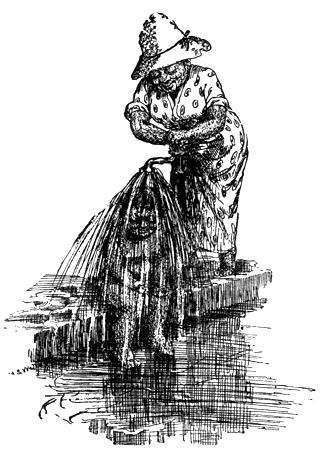
There is not another city in Japan, China, or India that can equal it in cleanliness
We ought to be jarred out of our rut—get discovered.
That 110 miles of road runs largely through rich bottom land, the major part of which is as innocent of cultivation as Adam and Eve were of clothing before the Lord caught them stealing apples.
Occasional villages of nipa palm shacks, stuck up on bamboo poles, are passed, the chief industry of the owners of the shacks being to roost in them out of the sun and rain, when they are not out gathering something to eat that Nature provides without labor. But they have made good roads.
There is not another city in the Orient that equals Manila in hotel accommodations; in an up-to-date telephone system; in electricity and ice; in rapid transit by trolley, carriages, and automobiles; in a fire department, and a live and enterprising press.
These Filipinos are truly a wonderful and progressive people!
I've been so busy stepping over the ground in seven-league boots, jumping from premise to conclusion, that I haven't, perhaps, dwelt enough on details.
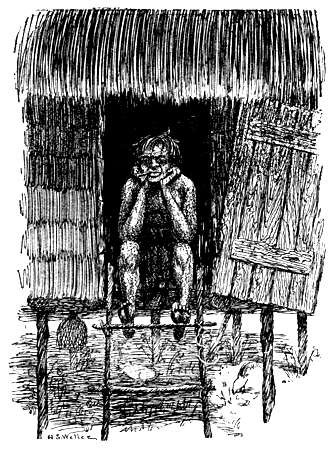
The chief industry of the owners of the shacks is to roost in them out of the sun and rain
The inhabitants of the islands are not all of the same color. There are two colors—white and chocolate brown. The latter is the popular shade—you 153 might say they are the style. The whites are the most dejected, forlorn bunch I've ever seen. They give me the jimjams, the willies, and I want to get away. The Filipinos' wonderful progress dates back sixteen years, from the time the white population began to make its appearance here, and the casual observer might draw conclusions.
But conclusions are the last thing in the world an historian should tamper with. He should confine himself to reciting facts, and let statesmen and politicians draw conclusions—and their pay.
The white population is leaving the islands—those who can get away. Those who can't, whose fortunes are tied up in the islands, put one in mind of a lot of ship-wrecked voyagers, who, with all hope of succor abandoned, are waiting for their ship to sink.
They have expatriated themselves (it amounts to that), and for sixteen years have become acclimated—invested their lives and fortunes in the islands. But they are not the right color—their color is against them.
Back in the old district school days in one of McGuffey's readers (was it the Fifth?) there was a very eloquent speech by some statesman (name has slipped my memory), entitled: "Whither Are the Cherokees to Go?" 154
It was an impassioned appeal. The reading of that speech used to swell my little chest till the buttons on the little bob-tailed jacket we used to wear in those days, called "a round-about," gave way. Won't someone make a speech for these white Filipinos? They ought to have an advocate somewhere, even though they are white. They aren't to blame for that. The Lord made them that way.
I've been to see Aguinaldo at Cavete, about twenty-five miles from Manila, over a good automobile road. I went in company with Dr. Fitzsimmons, of the Manila Municipal Commission, and Mr. Watson, of the Manila Cable News. Mr. Watson acted as interpreter, as Aguinaldo does not speak English.
We found Aguinaldo at a neighboring village, where he had just been initiated into the order of Masons.
He invited us to go to his home, where we paid him a short visit. I found Aguinaldo a very courteous and genial gentleman, and when I told him that he was spoken of as the George Washington of the Philippines, he modestly protested at the honor of such a comparison.
When I reminded him that he, like Washington, had retired to the farm, he reminded me that Washington 155 took up agriculture after his people had secured their independence, while the Filipinos were still looking for theirs.
I asked him if he thought it for the best interests of the Filipinos to have the islands turned over to them at this time, and he thought it was. I told him it was a great object lesson to the Filipinos to see their foremost countryman turning his attention to the soil, the islands' chief source of wealth, and he told me that many of them were doing the same thing.
After some general remarks we left Aguinaldo on the piazza of his home, which, in comparison with the average Filipino's residence, was commodious and palatial.
He is very much in earnest in tilling his 3,000 acres; and we gave hearty assurance of our most earnest wish that he would come out victorious in the battle he was waging against a pest of moth which was disputing with him the title to his crops.
There are more different ways of getting in bad than there are to keep out of trouble—a lot more. Indeed, straight and narrow is the road. But there are lots of by-ways leading off from the safe and beaten path, from which one's feet should never stray. In going around the world one can't keep too sharp a lookout for the prescribed highway.
This homely, safe and sane reasoning comes to me with force as I sadly pen these lines here in Singapore, having turned off on a side street that looked all right when I swerved—i. e., I knew it wasn't exactly the middle of the road, but I took a chance, because it looked inviting and I felt sure I could see my way back to the main line.
Leaving the Philippine Islands for Hong Kong, and taking a ship from there to Singapore is only a detail of my present perturbation.
That Hong Kong was an infected port, Black Plague being prevalent, is largely to blame. 157
I'd be easy in my mind this minute if Hong Kong had not been an infected port. Anyway, if my feet had slipped it would have been on a different orange peel or banana skin.
Singapore has very stringent health regulations against passengers arriving from Hong Kong.
To get into Singapore, to land at the port, one must sign what is called an "Undertaking"; the same being an agreement that if you stay in the town over twenty-four hours you agree to report at the health office in Singapore at 3 P. M. every day. Failing to do this, the penalty is arrest and a fine of $500.00.
The exact minute at which you must report is prescribed—3 P. M. There is no leeway given, as, between the hours of two and three, or three and four.
If you hail from Hong Kong you may land at Singapore, and stay there more than twenty-four hours if you sign an agreement that you will report at the health office at 3 P. M. sharp, daily. Failing this, to the dungeon and $500.00, please.
My only object in coming to Singapore is to tranship for Rangoon; and, as we sailed up to quarantine at 8 this morning, we passed my ship laying at anchor, scheduled to sail for Rangoon at 5 P. M. today. 158
A row of "undesirables" from Hong Kong for Singapore ranged up in the dining saloon before an austere and awful health official, and were put through the thirty-second degree—it was a meek and patient lot of lambs that passed before the throne of his majesty.
When it came my turn, with my eye on the ship that was going to bear me hence from Singapore, as the gruelling questions were put to me, I told the official I was going to shake Singapore at 5 P. M. today.
Now it will be necessary for you to know the English better than perhaps you do, indeed, even with this increased knowledge you'll still be short unless you know the Singapore English, and, even with that knowledge, you won't be fully enlightened unless you've come in contact with the Singapore English official, to realize what a regular Daniel in the lion's den I was to tell that being that I proposed to "shake" Singapore.
Shake Singapore!
Ye gods!
Tell a Singapore official to his face that you are going to shake the town! A Yankee at that, and from Hong Kong to boot!159
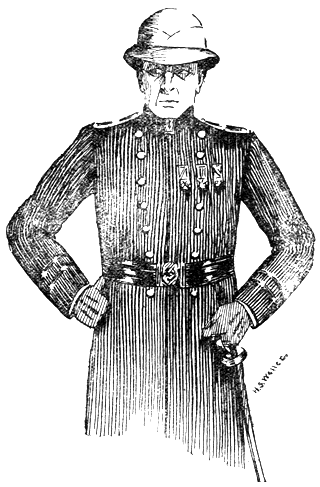
Ye gods! Tell a Singapore official to his face that you are going to shake the town!
A Singapore Englishman feels about Hong Kong, even when not infected, as a St. Paul man used to 160 feel about Minneapolis before Minneapolis put it out of the running.
That Rangoon steamer was due to sail at 5 P. M. this very day, or I wouldn't have dared.
A laugh went down the line of crushed candidates for landing at the heavenly port of Singapore, which helped me to bear the jove-like frown of the official—it helped a lot. It egged me on to further deeds of daring; for when he handed me a duplicate of the undertaking I had signed, to remind me of what I was up against if I didn't report to him at 3 sharp the following day, if I was still in town, with the remark: "Right-o, see that you report at the health office daily at 3 P. M. every day you're in town after today"—with my eye on that ship for Rangoon I came back with: "Right-o, if I don't shake Singapore today you'll find me on the stoop of your office daily at 2:59, so you can feel my pulse and look at my tongue. But, oh man, my only object in coming to Singapore at all is to get out of it. Wouldn't have come to Singapore if there had been a way around it. I don't like Singapore. I think it a measly town. I like Hong Kong. Hong Kong is a nice town. It's got Singapore beaten forty ways"—and it made a hit with the crowd, and I swelled out my chest and swaggered away, and thought I was funny.
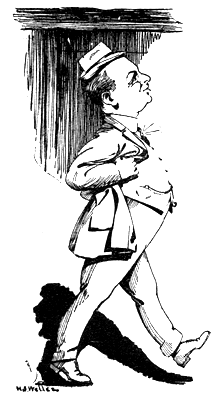
I swelled out my chest and swaggered away and thought I was funny
Now word has just come to me that my ship won't sail today. Owing to unforeseen delays, she won't sail till tomorrow at 5 P. M., and it's the ship's delay, and "the haughtiness of office" for me. I feel just like the melancholy Dane in his famous soliloquy.
I'm in the same fix another fellow was, who thought he would be funny. He was standing on the rear platform of a train that was just pulling out from a town in Illinois, noted for its blood-thirsty, scrappy natives. The train was getting under good headway when this "humorist" thought it would be funny to shake his fist at one of the natives standing along the line, a great big especially vicious-looking citizen, and to promise him one good thrashing the next time he (the humorist) came that way.
Just then the train stopped and backed down to the station onto a siding.
With a blood-curdling whoop that native jumped aboard the train.163
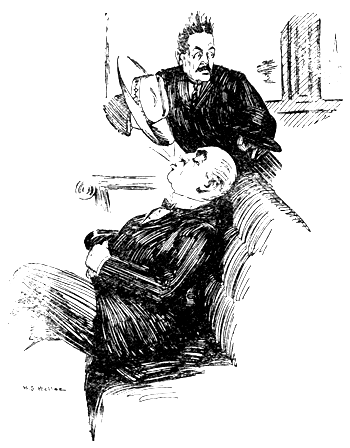
The "funny man" gently lifted the derby from the dozing passenger's head and set his own sombrero in its place
The humorist, who was wearing a wide-brimmed, conspicuous sombrero, ducked into the car, and espying an English tourist dozing and wearing a modest little derby, the "funny man" gently lifted the derby from the dozing passenger's head and set his own sombrero in its place, and sat down 164 two seats back and was nonchalantly looking out of the window as the native raged into the car looking for blood and that fellow with a hat.
There was no mistaking the hat; he spotted his man and was going to eat him alive.
The poor bewildered English tourist didn't know what it was all about. But that didn't go—nothing but blood would answer. It was looking dark for the bewildered Englishman when the rear platform orator stepped up and pacified the native by telling him that the gentleman didn't mean anything—that he wasn't quite right in his head, and in that way blood was averted.
The native got off; the train pulled out, this time for good. After it was fully forty miles from that station, and going sixty miles an hour, the owner of the sombrero stepped across the aisle, and, addressing the bewildered passenger, said: "Excuse me, sir, but I believe you are wearing my hat." B. p. reached for the hat on his head, saw it wasn't his (it was an afternoon of surprises), and handed it to the rightful owner, and, as he was a perfect gentleman, he thanked the man again for his presence of mind in saving him from a beating up. The rear platform humorist, orator, funny man, begged him not to mention it, and the incident was closed. 165
The funny man left the train at Milwaukee at supper time. The bewildered passenger stayed on and sat all night in a brown study—seemed to be trying to solve something. He reached St. Paul in the morning at sun-up, and with the coming of a new day, light dawned and he jumped up, shook his fist in the direction of Milwaukee, and said: "And domned if I didn't thank him twice, when I should 'ave punched his 'ead!"
Well, it's 7 P. M. I should have been two hours on my way to Rangoon. I'll drop this letter in the mail to catch the P. & O. going west, eat my dinner, and retire and get a good night's sleep; and after breakfast tomorrow I'll think till 2:59 P. M. There's no use worrying, for if worry gets you going it will keep you on the run. No matter what the hole you're in, there is a deeper one. I'll get up in the morning and I'll think, and think, and think how I can put that dread official on the blink, blink, blink. But a Singapore official, oh, he's a mighty gun, and this Singapore official he weighs about a ton—I guess. Still, I will not worry, but then, for all of that, I wish that I'd been wearing a great big sombrero hat.
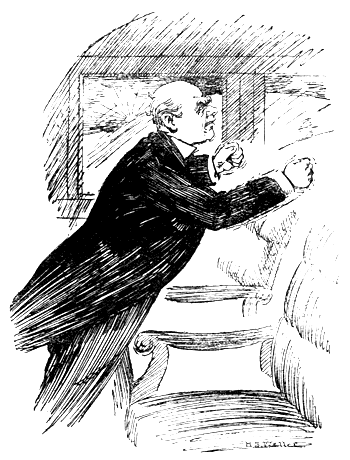
"And domned if I didn't thank him twice when I should 'ave punched his 'ead"
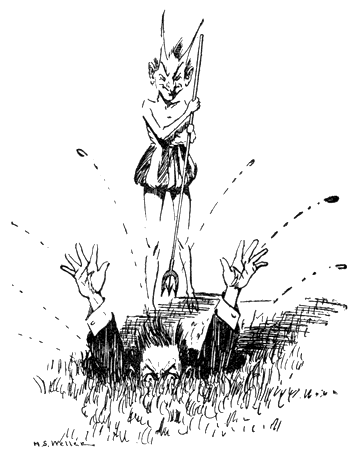
No matter what the hole you're in, there is a deeper one
Last evening I wrote you about my perturbed state of mind regarding quarantine here in Singapore.
After chota hazri this morning I thought for a couple of hours, then ate breakfast, after which I met a Hindu in my hotel (there are thirty thousand Indians in Singapore), who looked at me as if he were desirous of opening a conversation.
I stopped, saluted, and said to him: "Did you wish to speak to me?"
"Only to ask you if you wanted a guide for Singapore today. I can show you all the sights of Singapore and explain them to you in understandable English."
"By jove!" I exclaimed. "I believe you can. You speak English like an educated Englishman. What do you want for your day's services? You look like —— ——." I named an eminent American statesman, and he did look like him, too, except for color. I asked the guide if he knew of this statesman of whom he reminded me.
He said he didn't. 169
"Well," I said, "he is one of the most brilliant men on earth today."
The fellow smiled and showed a splendid set of teeth—a Hindu guide is susceptible to compliments.
"How much do you want for your day's services?" I again asked him.
"Three dollars."
"I'll give you a dollar and a half," I said.
"Pay me anything you like and then you'll pay me more than I am worthy of," he said.
We started off in a gharry, and he surely was a character.
Keen, bright, the most interesting guide I've ever struck—a Hindu.
We talked Hinduism till twelve o'clock, riding around Singapore; and if you think foreign missionaries aren't up against it in their job of converting India from Hinduism, or Brähmanism, you can think again.
He was a great solace to me.
"There are," he told me, "four great tenets to Hinduism:
"First—Don't question the mysteries. No one can solve them.
"Second—Don't worry about the future. No one knows what it has in store." 170
He frankly told me that the other two had slipped his memory, but he had cinched those two.
With me, number two was enough for today, with my job of thinking on hand.
That guide was a wonder. He was intelligent. There is not one Christian in ten thousand who could give a better argument for his faith than that guide gave me for his faith. He was about as refreshing a character as I have ever met.
He took me through a Hindu temple and laughed at Christians' "ignorance" in condemning the Hindus' idols. Hindus didn't worship the idols; but the Great Being the idols were to remind the worshiper of; they were only links between the worshipers and the Great Being.
He expects to be born over again and to answer in his new existence for the sins he has committed in this life; and the great end to be striven for, is to fly off into nothing and nobody.
"Why," I said, "that's Buddhism."
"Buddhism," he scoffed, "Buddhism is only an offshoot from Hinduism, borrowed from Hinduism." There were saints and sages among Hindus, he told me. Saints could die, sages never. He had tried to be a saint, but gave it up. No one was worthy of what they got, he the least of all. Here he was getting $1.50 a day. If I had offered him 171 anything he would have taken it—10c, 20c, and even then he wouldn't be worthy of it.
"Why in blazes didn't you tell me that before we closed for $1.50?" I asked him.
"I told you my price was $3.00, but that I would take anything you offered me. My offer stands," he said; "you offered me $1.50. At $1.50 I am riding around on a cushioned seat with a gentleman for four hours, as a day's work. Out there, digging in the street, in the hot sun, dressed only in a loin cloth, is a sweating, toiling brother Hindu, putting in ten hours a day for thirty cents. He is entitled to $1.50 for his day's work, more than I am entitled to thirty cents for my day's work."
He was a sinner and admitted it. A most unworthy sinner, and expected to get what was coming to him.
I dismissed him at lunch time to eat my lunch and prepare myself for three o'clock.
I want to draw a veil over my exit from Singapore on this trip.
There are some things that are too painful to talk about. What I think of the quarantine arrangements of that sun-blistered port, and what the health officials think of me will form no part of these notes of travel—suffice it to say that I got by the Singapore health officials. I escaped! I got away! Our expressions of endearment would be a new brand of travel stuff, and there are enough different kinds in these letters now.
After Singapore is Penang; and as I sit in my steamer chair, in my pajamas, in the grey of the dawning of a new day, on the freshly washed teak-deck of the steamer, as it sails through the peaceful strait nearing Penang, I can't see as there is a blessed thing to write about—not a blessed thing. A couple of junks float across the peaceful strait, the soft tropical breeze bellying their sails. One solitary bird, not a seagull, much bigger than a gull, lazily wings its way across the peaceful strait, 173 aiming for the opposite shore. I think it's the female of its species, because when it gets nearly over it changes its mind, turns around, and flies back again across the peaceful strait.
The junks—the bird—the ship with its teak-decks freshly washed—the grey of the morning—the soft tropical breeze—the peaceful strait—me in my pajamas in a steamer chair—the low fringe of hills with cocoanut groves to the east—Penang rising out of the peaceful strait—not a blessed thing to write about.
The east reddens, the sun is going to rise over the peaceful strait. It's a peaceful scene. I've mentioned that the straits are peaceful, haven't I? That feature of the scene especially appeals to me after my exit from Singapore.
But the sun is rising! While this is not an exciting or unusual thing—while one doesn't have to come to Penang to see the sun rise—while I feel safe in boldly asserting that this is a matter of daily occurrence both here and at home, the chances are, kind reader, that you have never seen the sun rise. First you see a bright red convex streak, then the slice of a sphere, then more, and more, and more, and more, and more, and then the sun is up to meet the lark.
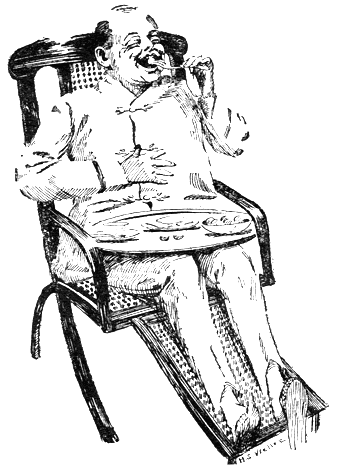
And now there is something to write about—the mangosteen
A Hindu comes with a cup of coffee, some toast, and six mangosteens on a tray, and asks: "Will master have his chota hazri here?" And now there is something to write about—the mangosteen!
The most unprepossessing fruit to look at, the size of a black walnut in its husk; an unlovely dark brown color on the outside. If you didn't know the mangosteen; if a plateful were brought to you for breakfast you'd eye the things askance, and say, "Take 'em away, please; take 'em away." But cut around its circumference through the husk, a quarter of an inch thick, and lift it apart. One of the halves makes a little bowl, its inside the most lovely old rose color, the other half holding a beautiful white pulp. The rich old rose edge of the husk hugs the mound of pulp, the combination making a color scheme to delight an artist's soul.
Insert a fork in the edge of the pulp, lift it out bodily, open your mouth, and—oh, say, after all the other delicious fruits on earth were made and pronounced good by the beneficent Creator, it would seem as if He had said: "Go to, now, let one more fruit be made for man, more delicate in flavor, more delicious than all the rest"—so He made the mangosteen.
And Rangoon is in Burma, a city of some three hundred thousand, the chief commercial city of Burma.
It is located in the south of that country, on one of the numerous mouths of the Irawadi River. Burma forms a part of the narrow Malay Peninsula, broadening out after Rangoon is reached, coming north from Penang, into a country as large as Texas, bounded on the west by India, on the north by Thibet, on the east by Siam, Laos and China, with the Bay of Bengal washing its southern coast.
Burma is the most thoroughly Buddhistic country in the world.
Now Buddha was not a god, never claimed to be, and is not worshiped as one.
But he was a tremendous personage.
He was born in India 2500 years ago, and after that lapse of time his image and teachings live in the hearts of every third man on earth today.
That fact puts Buddha in a class with such personages as Moses and Confucius. 177
These men are three of a kind and hard to beat when it comes to putting one's name over into the minds of men and making it stick. A score or so of other mere men since Adam's time, whose names loom large today, are mere pikers in comparison, and need not be considered in this short sketch.
The exact date of Buddha's birth seems shrouded in mystery, but it is placed during the sixth century, B. C.
He was born in the town of Kapila-Vastu. Since that time the town has changed its name to Kohana, and is located northeast of Benares.
Buddha spent his early boyhood in that region. His father's name was Suddodana, which same is a long, hard name to pronounce, but his mother's name was Maya, and she died when Buddha was seven days old, and his aunt brought him up. Her name was Maha-Prajapati.
There is not much known about his youth and early education, except that he was a promising boy and put over everything he undertook.
He was supposed to be a prince of the Royal blood. He was a Hindu, and was faithful to the demands of that faith.
He was married, and when he was thirty years old there was born to him a son named Rahlu. 178
No one knows how well his family did for him in picking out a wife, but it is of record that he left wife and son and home shortly after the boy was born.
He just left home one day, and when next heard from was at Rajagriha and was leading the life of an ascetic.
Buddha never did things by halves. He was out seeking the way of salvation in rigorous and excessive asceticism, and he went at it with such intense earnestness that he nearly lost his life—he overworked it, and was all played out when he came to the conclusion that he was on the wrong track.
Abandoning asceticism, he gave himself up to a life of thought and meditation, and as a result he gradually evolved his religious and philosophic theory of the general existence of evil, its origin, and its eradication.
He was sitting under a pipal tree in a little village named Buddh-gaya, southeast of Benares, when light dawned upon his soul. As the result of his emancipation of spirit he became a poet.
He became thoroughly convinced that the great end and aim of existence was to attain non-existence: and that the cause of all evil was wanting things. We were here through no fault of our own; that we would continue to be born over and over; 179 and that the next state into which we were born would depend upon how we used our present life.
To illustrate the idea: A tramp or hobo, if he tried to be as good a tramp or hobo as he could, would be born next time to be a roustabout, deck hand, or day laborer.
Continuing to be as good as possible in those callings, the next birth would be a step up, to, say, a bookkeeper, clerk, or possibly a commercial traveler.
The next birth, continuing meritorious in these last named capacities, would be a more desirable existence, and on up, passing the stage of a successful politician with a pull, to still higher and higher existence, until finally, getting out of the trouble and vexation of being any of them, one's individuality would be lost entirely in the great spirit of Nirvana—rest—peace—out of it—finished.
On the other hand, the politician with a pull if he didn't keep his eyes set toward righteousness, would slip down the scale in a future birth, and, continuing bad behavior in new births, run clear down past the hobo to be nothing more than a potato-bug, to end that existence for one even lower than that; unless, perchance, he decided to be an exemplary potato-bug and climb back up again. 180
After Buddha had thoroughly worked out his solution of life's problems, he settled in Benares, gathered five choice spirits who had been companions in his life as an ascetic, imparted to them his discovery of what he believed to be the path of truth, and spent the rest of a long life developing truth as he believed it.
He had to compete with Hinduism in India, and was only measurably successful there, but his theories captured Burma, and overspread Ceylon, China, and Japan, and, judging by results, anyone making a tour of China and Japan must take off their hats to Buddha. His long ministry was marked with a life of purity, gentleness, earnestness, and firm convictions.
He preached his doctrines for forty years and lived to be eighty years of age.
There are twelve million Burmese here in Burma. I told you in my last letter how thoroughly Buddha had, 2500 years ago, captured the Burmese with his doctrines.
For 2400 years Buddha practically had it all his own way. If in that time any other competing religions sought a foothold in Burma, they became discouraged and moved out.
Burma was solid for Buddha.
Buddha had a monopoly and held it against all comers for 2400 years. One hundred and one years ago the Baptists came to contest the field.
They didn't come with a blare of trumpets. One man, a Rev. Adoniram Judson, and his wife started out from Salem, Massachusetts, came to Burma and settled here in Rangoon, to wrest from Buddha his adherents, and add them to the Baptist Church. They worked six years without winning a convert. After one hundred and one years the results are:
| Baptists | 66,000 |
| Buddhists | 10,000,000 |
182 from which figures one must agree with me that Buddha ploughed deep and planted thoroughly. The other Christian denominations have about 66,000 members between them.
There are of baptized Baptists in Burma 66,000, all other Christians about the same number. The Christians claim an adherent, or nominal Christian, for every church member; so baptized and nominal Christians in Burma number 264,000.
This makes 10,264,000 Buddhists and Christians. The balance of the 12,000,000 in Burma are non-Christians or non-Buddhists, and are composed of various peoples, and tribes: the Karens, Chins, Kachins, Musos, etc.
But the Baptists admit that the great majority of their converts were not made from Buddhists, but from the Karens, Chins, Kachins, and Musos, chiefly from the Karens.
To quote from the minutes of the Judson Centennial held here in Rangoon in 1913:
"But what of the Buddhist population, which is so greatly in the majority that out of a total of 12,115,217 dwellers in the land, 10,384,579 are returned as Buddhists? From among the Buddhists only 3,197 are members of our own Baptist churches, and a correspondingly small number are members of other communions. It is thus readily seen that, while 183 the success of our missions in Burma has been very great, those who have professed belief in Christ have come very largely from the non-Buddhist population.
"Of the ten million Buddhists, eight million are Burmans, and of Burman Baptist Christians we find but 2,700. Please bear that fact in mind—2,700 Burmans in our churches and eight million Buddhist Burmans. To each Burman Baptist church member there are 3,000 Burman Buddhists looking us in the face as we turn to our task for the coming century."
The Baptists here are hotly contesting the field; bombarding it with a thoroughly up-to-date publishing plant; with a college, schools, and missionaries. For the first twenty years of work we find them with 2,000 converts to their credit.
After half a century of labor we find them with 12,000 converts, while for the full century we find them with 66,000.
A significant fact stands out clear and forceful: They gained in the last decade of work 20,000 converts, nearly one-third as many as they won in ninety years of struggle.
But still Buddhism stands, and Buddha, its founder, after 2500 years, looks with peaceful, quiet eyes from innumerable images set in temples 184 throughout the land—to me more impressive than the Sphinx with the secrets of the centuries locked in its impassive gaze.
Buddha held back no secrets—with burning zeal he preached what he believed was truth. Today one image of the Sphinx, with its riddle—but countless images of Buddha, many of heroic size.
The most impressive one I've ever seen is the Daibutsu in Kamakura in Japan. A temple built in the form of Buddha of solid bronze and silver, with eyes of gold.
This temple was built centuries ago, to keep alive the name and teachings of a man who taught and wrought a score of centuries before this wonderful temple was built—the mystic past steals over you as you look, and you turn and walk away—wondering, wondering, wondering.
There is a business man here in Rangoon who, to my mind, has put one over on the missionaries, by seeing their game and beating them at it with a sermon—a sermon with more ring and go to it than anything of that kind I've struck in the Orient—or out of it.
They are really a godless lot out here in the Orient, as we look at godliness; or, at least, profess to.
They haven't any more respect for the Sabbath day on this side of the world (except in a few spots where the missionaries have made a dent in the situation) than a lot of crows have for a farmer's rights in a field of growing corn.
Now, this business man I am writing about was born and brought up in England. He had it drilled into him when he was a boy that we should remember the Sabbath day to keep it holy; and the teaching stuck.
He is a character. 186
Between the ages of seventeen and fifty-six he got started in life; got rich; retired; and lost his fortune; and when he was fifty-six years old he was broke—down and out.
He came to Burma, prospected for gold until he was sixty-six years old, and the net result of that ten years of gold prospecting was—still broke.
As he had a character just like Gibraltar, he was able to borrow a few pounds sterling, and with it started life all over again in business here in Rangoon.
He got to going to the good; and at the end of five years, when he was seventy-one years old, he had a name and some fame in his line of trade.
At that time the heir apparent to a mighty throne came through Rangoon, touring Burma with his staff.
He heard of this man, and wanted to buy some of his goods. He decided on a Saturday afternoon, that the next day at eleven o'clock he would call at this man's store and inspect his stock with a view to purchasing.
As this potentate was a mighty gun—none bigger—he prepared the way to his proposed visit by sending one of his numerous staff to this man's store Saturday evening, to inform him that at 187 eleven o'clock of the next day his Royal Highness would be around to buy some goods.
It's right at this point in the narrative that this man got there with his sermon. He said: "Present my compliments to his Royal Highness, but tell him I wouldn't open my store on Sunday to do business even with the King of England."
Get that?
Ever been in London, dear old "Lunnun"? They set great store by selling royalty in England. There's a fellow over there in London doing a smashing business in oysters just because he can put up over his door "Purveyor of Oysters to His Royal Highness, the Prince of Wales."
Well, this little-big sermon got back to England, and the result was that in the next five years this man sold goods to royalty pretty well over the world, and got rich. And he is here today; and he tells me that while he has played the game of business for the love of it, he is eighty years old now and is going to wind up. Being without wife or children, he is going to leave his wealth to orphan asylums.
To come to Rangoon and not go to see the elephants work the teak timber that comes down the Irawadi River would be like going to Venice and not have your picture taken in St. Mark's Square with the doves roosting all over you; or to leave the pyramids without a photograph of yourself with the great pyramid of Cheops for a background.
I plead guilty to the dove picture—it's on our mantle at home—had it taken to please my wife, who was with me on that trip.
The great satisfaction I take in that picture is its proof of my self-sacrificing nature.
Having visited Venice several times before I took my wife there, I knew all about that "picture-with-the-doves" game.
Just before the photograph fiend in Venice, who will photograph an American with the doves for $2.00, an Englishman for $1.00, and a German for 20 cents, made his exposure, I bought my wife a cornucopia of corn that venders sell for a cent, with which to feed the doves.
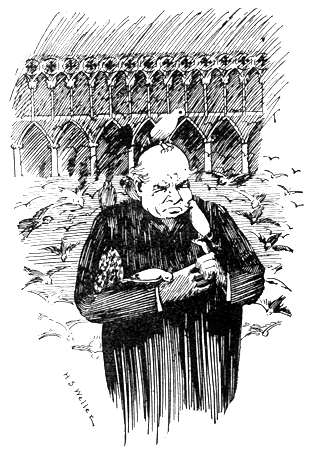
Would be like going to Venice and not having your picture taken with the doves roosting all over you
The woman in the picture behind the cloud of doves is my wife. The man at her side, minus any doves on him to mar his seraphic smile, is myself.
The photograph of me at the pyramids, taken on a former trip, would be a pretty good picture of me, too, if my natural modesty hadn't got the better of me, which modesty prompted me to get behind the pyramid when the photographer made his exposure.
This photographer is on the ground and does a rushing business photographing globe trotters at the pyramids. The pyramid being betwixt me and the camera made a failure of the picture so far as being a good one of me is concerned; but I'm ready to bet good money that I'm the only world tourist who can show a photograph of Cheops without a globe-trotter in the foreground. It's a good photograph of the pyramid.
But really one shouldn't leave Rangoon without seeing the elephants work the teak logs.
The human intelligence of the animals, coupled with their great strength as they push the logs into place, accurately measure distances, walk back and forth to study the problem of how best to place a log, and then roll and put it into place, is one of the sights worth seeing in Rangoon; which, in itself, is a town worth seeing. 191
A city well laid out with wide streets running at right angles, extending several miles along the river front, and a mile inland.
Many beautiful lakes are in the suburbs, and tropical parks abound: and it is the third city in British India.
It's an old, old town. Its chief attraction to draw visitors from the ends of the earth is the great Shwe Dagon Pagoda, the oldest Buddhist temple in the world, the foundation of which was laid 588 B. C.
And Rangoon has trolley cars and water-works, and electric lights, and an ice plant.
And ice is a precious commodity in Rangoon. In fact, ice is a precious commodity in any Oriental city excepting Manila.
In Manila they have caught onto the idea that ice is not a deadly poison or precious stones.
I attribute it to the influence of the white Filipinos living there, who are wonderfully like Americans in taste, habits and general all-around desirableness.
Ask for a glass of ice-water at a hotel in Rangoon, or Hong Kong, or Pekin, or Yokohama, or Calcutta, or Bombay and watch what happens.192
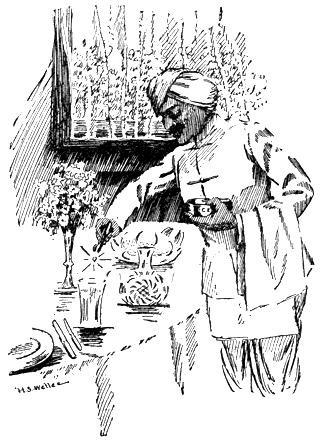
The only thing of note in the whole transaction is the boy's self-satisfied air of having done his whole duty
Your table boy will bring you a high glass of tepid water and drop a piece of ice in it as big as a hickory-nut, and the only thing in the whole transaction 193 worthy of note is the boy's self-satisfied air of having done his whole duty.
I have demoralized the whole running-gear of the best hotel in Rangoon—I'll be known among the hotel fraternity of Rangoon in future as the "ice man" who visited the town in 1914.
Becoming weary of watching that little nugget of ice in a large glass of tepid water, doing its best to chill the water as it rapidly diminished to the size of a two-carat diamond, finally to dissolve entirely in an heroic effort to make good, I called the table boy to me and ordered him to empty the glass and bring me the several receptacles in the dining room that held ice for all the guests. Fishing enough nuggets from the lot to pack the glass full of ice, I ordered it filled with water—looked up at the boy and said: "Savvy? Ice-water!"
I leave town today for Calcutta—that glass of ice water has jarred Rangoon.
Did one of your old readers, kind friend (I think it was McGuffy's Second) way back in childhood days have a little poem in it all about a lot of little girls playing a wishing game? It's over forty years ago that I read that little poem, and I can only remember one little girl's wish.
She said: "I wish I were a flying fish, o'er ocean's sparkling waves to sail, a flying fish, that's what I wish, 'mid Neptune's blue to lave my tail."
Not having read that little poem for over forty years, and not having the book with me out here in Calcutta, I may not have quoted the lines verbatim, but as near as I can recall it, that's what she said.
That little girl didn't know what she was wishing for or she'd sooner have wished to be a devil bug.
The flying fish has got that old saying, "Between the devil and the deep sea," beaten to a frazzle.
The life of a flying fish may look all right to the unsophisticated, but things are rarely what they seem, and a flying fish's life is a hard lot.
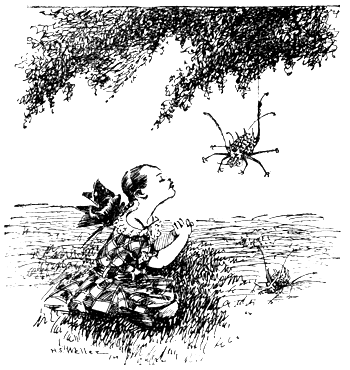
She said: "I wish I were a flying fish, o'er ocean's sparkling waves to sail"
Chased up out of the water to escape the jaws of some horrid sea monster seeking to make a meal off it, it spreads its silvery wings o'er "ocean's sparkling waves," when a seagull comes along, and—good-bye little flying fish.
Now if I'd been one of those little girls playing that wishing game and had known as much as I know now, I'd have wished to be a sacred bull here in Calcutta.
That's one fine job—the life of a Calcutta sacred bull.
I stepped out of my hotel today onto one of Calcutta's best streets, with a pavement twenty feet wide, filled with pedestrians, lined with splendid shops.
Calcutta is a town of one million inhabitants and is the second city in size in the British Empire.
Just at the side of the entrance to a fine jewelry store lay a great big fat and glossy sacred bull, with a garland of roses round his neck, placed there by some devout Hindu.
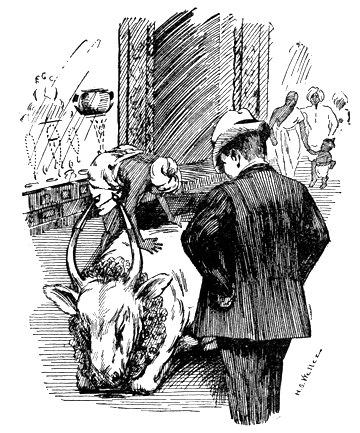
"Twist his tail," I said, "that will start him"
The natives would stop and fondle and brush the flies off him. Stopping to look at the novel sight, and giving the fine old fellow a few gentle strokes, I turned to my guide and asked him to tell the natives who had stopped to witness the foreigner's 198 interest, to make the bull get up. I wanted to see what he would do.
A native pushed him in the flank and ribs, but Mr. Bull only smiled, and as plain as words his actions said, "No, thanks, I'm perfectly comfortable here."
"Twist his tail," I said; "that will start him."
The native gave his tail one twist. The bull looked around with a surprised air and anyone could see that he said, "That's a new kind of a caress," but he didn't get up.
"Twist it harder," I said.
Three turns of the tail brought him to his feet, and he walked leisurely along the crowded thoroughfare, perfectly at home, wearing his garland of roses as naturally as a girl would wear a string of beads, receiving a gentle pat from the native passersby—even an English girl put out her hand and gave him a stroke in passing.
He was a great big, glossy, docile pet, expecting and getting a wealth of love.
I am told that when he is hungry he goes to a green grocer's store and makes a meal off the grocer's cabbage, with no protest from the grocer, after which he goes to a confectioner's shop for a dessert—and gets it.
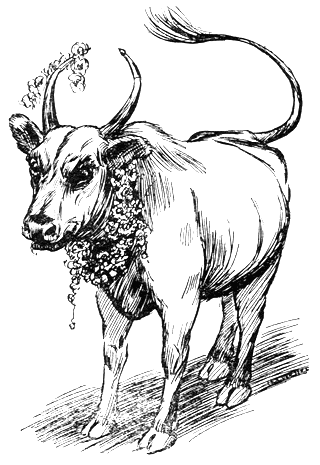
"You stay where you belong. I'll do the sacred bull business around this neck of the woods"
There are scores of sacred bulls in Calcutta. They have their special stamping ground. Let one bull poach on another one's preserve and there is a bullfight then and there. Not a Spanish "bullfight"—seven or eight trained athletes against one bull, with death for the bull a foregone conclusion—but a real, genuine, interesting bullfight, with the victor's tail in the air.
And it's a dull person who can't understand that that bull is saying to the vanquished one: "You stay where you belong. I'll do the sacred bull business around this neck of the woods."
I call him Lal.
The rest of his name is too long for week-day use. He is my interpreter, my guide, my servant, my counselor, and my friend.
I have hired him for a two weeks' trip across India. He is considerable of an erudite gentleman—speaks several languages.
I speak only one, and I do queer things to that one lots of times.
But Lal doesn't try to impress me with his superiority just because he knows a lot more than I do—quite the reverse.
His wages are a rupee a day, out of which he feeds himself. That was his own price. I'm paying him all he asks. I've been told that I'm paying him too much, that he has stung me. A rupee is thirty-two cents!
But he is a superior guide. He admits it himself. To prove it he showed me a sheaf of recommendations from American globe-trotters whom he has guided across India in days gone by. 202
A good many of those recommendations are frayed at the edges through much showing, but I wouldn't mind having some of those names on a blank check, with privilege to write the rest of the check myself.
Lal tells me he is the "Professor" of the guides.
I hired him yesterday. He calls me "Master." That's regular. All servants and guides in India call their employers "Master."
With a two weeks' trip to plan across India, with a map of India, hotel guides and railroad time-tables, pencil and paper spread out before me in my room this afternoon, I said: "Draw up a chair, Lal, and sit down. Here is a two hours' job before us."
"Excuse me, 'Master'," Lal said, "but if 'Master' will excuse me I will not sit in 'Master's' presence."
Get that?
Royalty, don't you know?
Lal got "Master" in only three times in that sentence. I've known him to bring it in four times in a shorter one.
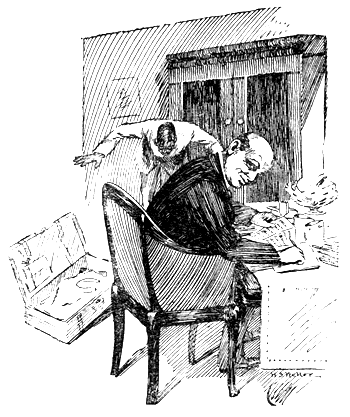
Get that? Royalty, don't you know
In addition to Lal's numerous duties—standing between me and the natives, brushing my clothes, looking after my laundry, making my bed in sleeping cars, and watching my goods and chattels while I take my meals in the dining car, and a score of 204 other such duties, Lal was looking after "Master's" dignity.
Lal, old boy, after that gentle reminder, I'll know my place.
If there's nothing else to do, I'll let Lal fan me. I believe it's one of the prerogatives of Royalty to be fanned by vassals.
These Indian guides are a class by themselves. Many of them have traveled far.
Picked up by travelers for a tour across India, they are frequently taken to England and through Europe. For instance, Lal has been to England and Boston. In speaking of India he says: "My India," "my Calcutta," "my Bombay," and there isn't much about India he doesn't know.
They travel third-class, which is ridiculously cheap in India. The tourist, of course, pays his servant's railroad fare and must land him back to point of hiring him.
Lal's home is in Calcutta. I will have finished with him at Bombay and will have to send him back to Calcutta, across India, fifteen hundred miles, and that item of expense will be sixteen rupees six annas—all of five dollars and twenty cents.
It's hard lines to pour out money in this way on Lal—but Royalty is expensive anyway.
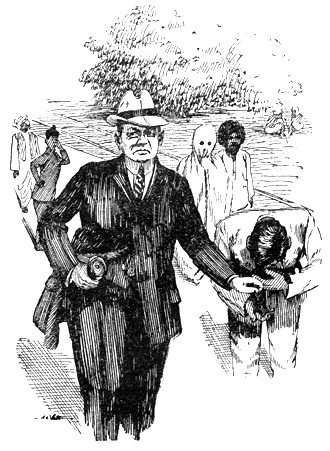
It's hard lines to pour out money in this way on Lal—but Royalty is expensive anyway
To go across India from Calcutta one of the necessary things to consider is a railroad ticket.
After my vassal and I had planned an itinerary we called a victoria, or rather Lal flagged a Hindu driving a team hitched to one.
It was rigged for a footman at the rear. The footman was there, too, ready to open the door for "Master" when he wished to enter or alight.
This truly regal, royal outfit cost twelve annas for an hour's drive, and that's twenty-four cents.
You can work the Royalty racket in Calcutta cheaper than you can hang over a lunch counter and eat baked beans in America.
Now Cook's tourist agency has booked me from Hong Kong to New York via steamer, first-class, over the Peninsular and Oriental line, P. & O., for short.
That means steamer from Hong Kong to Calcutta via Singapore, Penang and Rangoon.
I have to pay my railroad fare across India to Bombay, and from that port privilege of P. & O. 207 direct to London, via Aden, Port Said, Gibraltar and Marseilles, and home from London via any American or British line I choose from London.
Cook's take care of a traveler they book in this way, and their representatives look out for you on arrival and departure from ports.
In my role of Royalty I bade my vassal, Lal, to hoist himself up on the driver's seat, and to tell the driver to go to Cook's.
Laying my itinerary before a booking clerk at Cook's I said: "Please book me to Bombay over this route."
As I was traveling first-class by water, which they knew all about, and as I preserved my regal tread from my carriage door right up to Cook's counter, the clerk said: "Of course you want first-class, Mr. Allen?"
"Of course I don't," I came back at him; "you stung me last trip across India for first-class, and you know the only difference between first and second here in India is the price, just double second, and the number on the door of the compartment. You'll book me second, please."
This Royalty act is all right here in India, but you want to know where to draw the line when it affects your pocketbook with nothing to show for it.
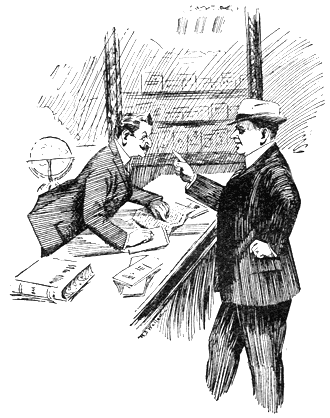
"Of course I don't," I came back at him. "You stung me the last trip across India"
The man saw I was wise, grinned, and issued me a second-class ticket, and third-class for my servant; and the evening of that same day saw me starting for the railroad station in another victoria, Lal and the driver up front, footman on behind, the lord my duke (meaning me) in the "tonneau" with bedding, grips, steamer trunk, camera, coats, etc., etc., all royally placed in the same vehicle.
When a traveler starts out from Calcutta to take the train for a night's journey, if it don't look as if he was breaking up housekeeping and going somewhere, I've never asked for bacon and eggs in the woolly West and heard the shirt-sleeved waiter yell: "Two clucks and a grunt," and then collect more for the viands than it costs to be moved across the second city in the British Empire in royal entourage.
The seasoned traveler in India, planning a night's journey, don't arrive at a station a minute or two before his train leaves, as we do in plebeian America. Rush and hurry should form no part of Royal journeys.
It isn't dignified.
You should get there at least half an hour before the train starts, especially if you are playing Royalty on a second-class ticket.
As your equipage draws up to the station your footman alights and swings open the carriage door, your guide descends from the driver's seat and summons low-caste vassals who load your impedimenta on their heads.
The cavalcade starts with you bringing up the rear.
You find the station-master, the string of your menials now following on behind.
Locate your station-master, or at least an official who will answer the same purpose, and tip him a 211 wink, not forgetting to accompany it with half a rupee, and tell him you want a car for Benares.
This man is a Hindu who can write but can't read—I am quite certain he can't read.
He leads "Master" with his string of retainers to a car of four compartments, four berths in each compartment, the berths running with the train, with a toilet room for each compartment. He opens a door. Lal tells the string of porters to put "Master's" baggage into the compartment—no matter how much, put it all in, boxes, bags, bedding and trunks.
Then this functionary who has been the recipient of a wink and half a rupee (don't forget the coin when working the combination), who can write but who cannot read, fills in a placard which is hanging outside the compartment. This placard, before the recipient of the wink and half rupee begins to toy with it, is a blank which reads:
Lower Right Berth reserved for ——
Upper Right Berth reserved for ——
Lower Left Berth reserved for ——
Upper Left Berth reserved for ——
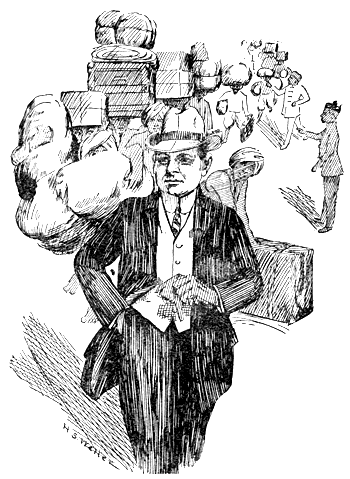
Lal tells the string of porters to put "Master's" baggage into the compartment—no matter how much, put it all in, boxes, bags, bedding, and trunks
This official who has received a wink and half a rupee—never, never forget the half rupee, because half a rupee is sixteen cents—fills in the blanks 213 on the placard which now, in its completed state, reads:
Lower Right Berth reserved for Mr. Allen.
Upper Right Berth reserved for Mr. Jones.
Lower Left Berth reserved for Mr. White.
Upper Left Berth reserved for Mr. Brown.
He hangs up the placard outside of the compartment, wishes "Master" a pleasant journey up to Benares, and closes the door.
Lal starts the electric fan, makes "Master's" bed, lays out "Master's" pajamas, and arranges "Master's" belongings promiscuously over Jones', White's and Brown's berths—Lal, a seasoned guide, is onto his job.
These last-named gentlemen get left—yes, sir, they get left. The train pulls out before they get around, and I am deprived of the pleasure of their company.
But if there is one place where a fellow can dispense with company it's on a hot night's run in a railroad carriage through India.
It's when I step out of the car at Benares the next morning that I learned that the fellow back in Calcutta couldn't read, for, blessed if the outside of that compartment I have occupied all night isn't labeled No. 1 instead of No. 2.
But that really makes no difference. 214
The compartment labeled No. 2, when you get inside, is just like compartment labeled No. 1, on the other side of the partition in the same car.
I conscientiously told that fellow I held a second-class ticket, and if he could read, Royalty is so cheap in Calcutta that you can buy a whole night of it with sixteen cents, and the number on the outside of the car, and the price charged for it, is all the difference between Royalty and Plebeian in India—and Plebeians have the laugh on Royalty—they have always had it on them for that matter.
In my home town I was once asked to give a travel talk in a large stone church, the occasion being a rally for the Christian Endeavor Society.
It had been announced that there would be no charge for admission; furthermore, it had been thoroughly advertised that the young ladies of the church would furnish a delectable spread to the audience in the church parlors just as soon as I got through talking.
The town turned out en masse.
As the parson was leading me to the rostrum, the lights went out and there was Egyptian darkness.
After an anxious wait of five minutes, it being a hard stunt to get such a fine audience together in the classic, intellectual center in which I live, even with a chromo offer, the parson, fearing it would leave, made a little speech in the direction where he hoped the audience was—he couldn't see it—it was an act of faith.
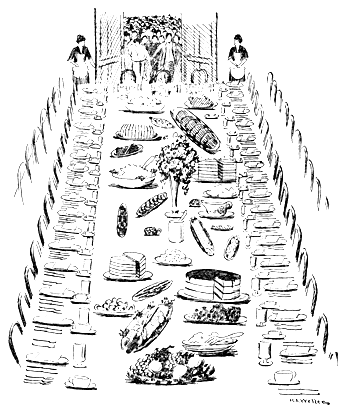
The town turned out en masse to hear me talk
He begged our good people to be patient under the trying circumstances, explained that the burned-out fuse would soon be replaced, that an electrician was even now on his way to the church, and told them that a good thing was in store for them—he assured them, "Mr. Allen is still with us."
Five more minutes passed and darkness still brooded.
Again the parson gave the audience, which he hoped was still there, the same little speech, assuring them again, "Mr. Allen is still with us—there's a good thing coming."
At the end of fifteen minutes he repeated it again, assuring them a good thing was coming—the coffee began to boil in the church kitchen, the aroma floating through the auditorium—the lights came on and there hadn't one guilty man escaped. The audience was still there.
Kind reader, you'd never guess what I was thinking about during that trying fifteen minutes.
Well, I was trying to think of an appropriate story to open my speech with, to illustrate the situation—something about where the lights went out.
I thought, and thought, and THOUGHT, but could not fetch it, but the next morning I thought of a corker—I am descended from the English.
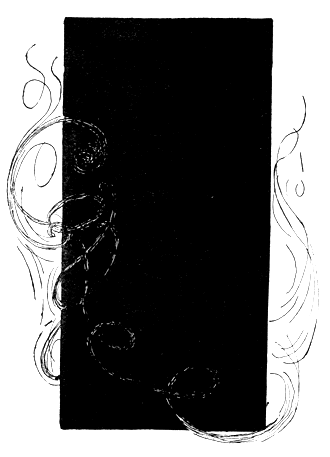
The coffee began to boil in the church kitchen, the aroma floated through the auditorium
All my ancestors came from England and settled in New England. New England was chiefly inhabited by Indians at the time, but, I suppose, there still lurks a trace of English in me.
That old joke about the English being slow is no joke—it's a sad fact.
If further proof than my inability to corral that illustration inside of fifteen minutes were necessary, I've demonstrated it coming through India this trip.
The universal way of washing clothes in India is for a native, they call him a dobe, to take his clothes to the bank of a stream, conveniently near a large stone.
The larger the stone the better. One weighing from one to three tons is an ideal size.
The dobe picks up a garment, souses it in the water, and flails the stone with it.
The dobe is a particularly vigorous man. The average Indian is of a lymphatic nature, excepting the dobe. He is animated with a strenuousness entirely lacking in all other callings.
Mark Twain, passing through India some fifteen years ago, noting the strange sights, remarked that all over India he had seen the natives trying to break huge stones with a shirt; but, he added, he hadn't, in a single instance, seen one succeed.
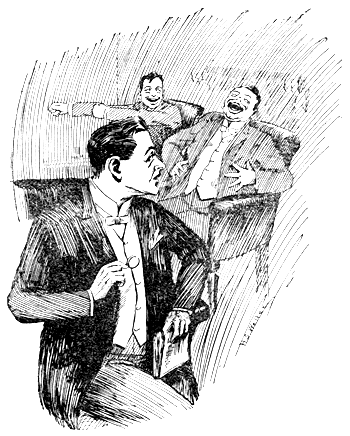
That old joke about the English being slow is no joke—it's a sad fact
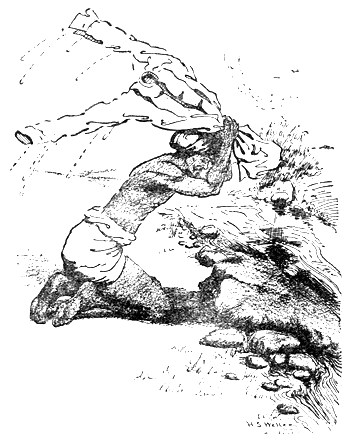
And every time the Englishman has explained to me that he wasn't trying to break the stone
Just to see whether our English cousins over here in India had caught that joke yet, when our train crossed a stream I would draw a chance English traveler's attention to the ubiquitous dobe flailing a stone, and wonderingly ask: "Why does the man try to break the stone that way?"—and every time the Englishman has explained to me that he wasn't trying to break the stone; and he would further kindly explain, "That's the way the Indians do their washing," and he would invariably add: "Beastly stupid, don't you know, isn't it?"
And every time I've sadly admitted that it was.
Benares is located on the Ganges River and is right in the center of things for devout Hindus—Benares bearing the same relation to Hinduism that Jerusalem does to Christianity.
Benares is the Hindus' sacred city, and the sacred Ganges River is lined with temples and bathing and burning ghats.
Hindus come from afar to die at Benares, where their bodies may be burned and their ashes consigned to the sacred waters of the Ganges. And after Benares, by easy stages, Lal and I reached Delhi, the old capital of India, until the seat of government was shifted to Calcutta, to be again brought back to Delhi three years ago. And here is some English "as she is spoke" in Delhi, handed out by an enterprising shopkeeper to both Royalty and Plebeian:
"Useful value, Save Your Money
(Defy Competition)
"We have much pleasure to inform the Ladies and Gentlemen, Officers and visitors and prince and 224 the public in general who have always been our customers or who wished to make the shopping they must not use the Hotel and traveling guides and Hotel Carriages at the purchasing time because they always Carried the visitors to those places where they getting 25 per cent Commission, now it is a great point to think that when they will get so High Commission from the shop keepers then the visitors cannot get the things worth of a rupee only they will be extorted and will get the things 4 ans. worth in a rupee, now it is useful advice for them that the visitors should not make any purchases without having inspected our prices and charges, as we are not going to any Hotel to distribute our cards and never use to give them any Commission that is why we are ready to sell our articles at comparatively prices, our firm oldest and reliable has been established in 1860 in Chandni Chowk now we have shifted our shop from there to here near the Jama Masjid No. 1 for the convenience of our customers.
"No use to get the money from your pocket and to give these guides and Ghari-walas."
We are nearing Aden in Arabia, en route from Bombay.
Bombay was all stirred up over the war and my itinerary is knocked into a cocked hat.
I had planned to go through Palestine to Constantinople and cross Europe to London, but I can't get my passport viseed—I'm no war correspondent, anyway. I'm strictly a man of peace.
When Lal and I reached Bombay war was on, and Bombay was about two-thirds of my way around the world, and home loomed large in my mind—I wanted to get home. This English P. & O. mail liner was ready to sail direct for London—and this was my ship.
For a strictly peaceful man this was not a good boat to sail on, I was advised, numerously, and from many sources.
All banks in India since war was declared had shut down paying out gold. This ship was going to carry four million pounds sterling to London, which, in round numbers, is twenty million dollars.
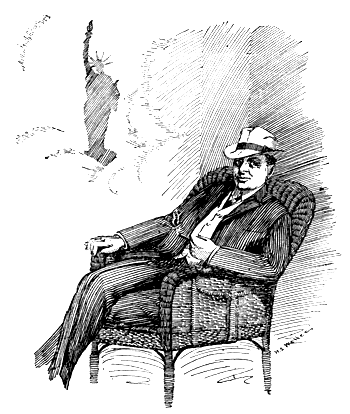
Home loomed large in my mind—I wanted to go home
She would be a prize for the German gunboats in the Arabian Sea. Aden would be her first stop, a five days' sail from Bombay. The Germans knew her schedule and her route and knew she would carry Indian gold to London. She would have no chance at all to make Aden with all that gold on board. The Germans would get her.
Then, from there up through the Red Sea to Suez she wouldn't be out of danger—there were German gunboats in the Red Sea. She might get through the Suez Canal all right, if she ever got so far as Suez. The trip through the canal might possibly be a peaceful one, but, ye gods! look out when she strikes Port Said at the other end of the canal, if she ever gets that far, was the word passed out.
Port Said would be a hot point. Nothing but submarines would be safe around Port Said about her due date there, it would be such a seething hot-bed of naval engagements.
From there her course through the Mediterranean to Gibraltar would be one trying ordeal for a man of peace, not used to, looking for, nor wanting war's alarms. Italy was hanging in the balance as a neutral power. She would probably be in it before the ship could reach the Mediterranean at Port Said—if she ever reached Port Said. 228
To sail on this ship through the Mediterranean under present conditions would be, for a rank civilian, just like committing suicide. Of course for a soldier, whose job is war, it would be all right—all in the day's business—justifiable.
Then after she reached Gibraltar (of course this was supposing the improbable chance of her ever getting so far as Gibraltar) she would have to sail out into the Atlantic through the Bay of Biscay, and up the Thames, and the telegraph said the Germans had slipped over and mined the mouth of the Thames—for a man anxious to get home this was a bad ship to sail on. That was the encouragement held out to book for passage on this ship.
I met a man at the Taj Mahal Hotel in Bombay (I'd met this man two weeks previously at Calcutta)—an American, a machinery salesman from the United States.
He told me he was on his way home, had crossed India to Bombay to connect with this P. & O. liner, but none of this ship for him.
He had been filled as full, if not fuller, than myself of the dire disasters that would, in all probability, overtake this ship.
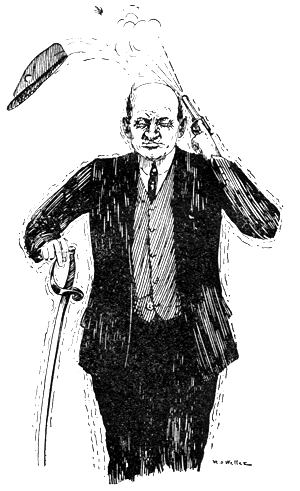
Just like committing suicide
"Why, Mr. Allen," he said, "that ship will have about as much chance to get to London as a celluloid dog would have to catch an asbestos cat racing 231 through——" "Oh, say, my friend," I said, "don't say it.
"Aside from that illustration having gray whiskers, it makes me nervous and discourages me, because I want to get home, and that is the ship I ought to sail on. But let's go and see our Consul; he may be able to throw a little optimism on the situation."
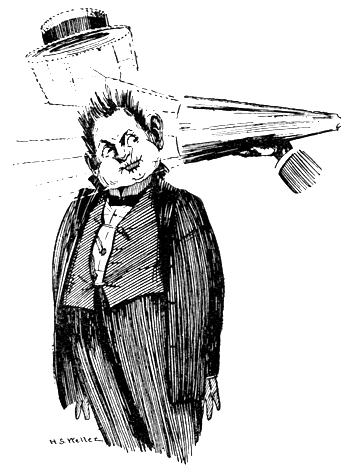
He had been filled as full, if not fuller, than myself
The Consul took an even more gloomy view of it than my friend from Calcutta. Aside from the above cheerful opinions, all of which he shared, he had the air of a man who knew something worse but was not at liberty to tell.
That settled my friend from Calcutta.
He wanted to get home as bad as any man could, but he was going to retrace his steps and go home via Japan.
Our Consul advised me if I really wanted to get home that I had better go that way too. On the other hand, he advised, if I really enjoyed the sensation of momentarily living in expectation of being sunk, shot to pieces, or blown up, that this P. & O. liner was an ideal ship to sail on.
As I had just come from Japan, as my contract is to write travel stuff around the world—not two-thirds around and back over the same ground—and as I had picked up numerous cases of stuff 232 coming across India, all of which were under consular invoice, said invoice reciting the fact that the goods it described were to leave India on this same ship, for entry at New York (it being a requirement of our tariff laws to name the ship, port of departure, and port of arrival of goods for entry into United States), I told our Consul and my Calcutta friend that I was going to take a chance and sail on this ship.
To write that invoice all over again for another ship, for entry into San Francisco en route from Japan—to get out of that was the determining factor.
Anyone who knows anything about the details of a consular invoice will understand.
So I boarded this ship with a handful of passengers booked for London. The tender steamed away and left us in Bombay Harbor, ready to weigh anchor and sail at 3 P. M. Saturday, the advertised hour for sailing.
But we didn't weigh—not at 3 P. M. that day, or the next. The next day, Sunday, all first and second-cabin passengers—the P. & O. carry no steerage—were shoved up forward, and British troops, homeward bound, were taken on aft—and I wondered if the Consul knew.
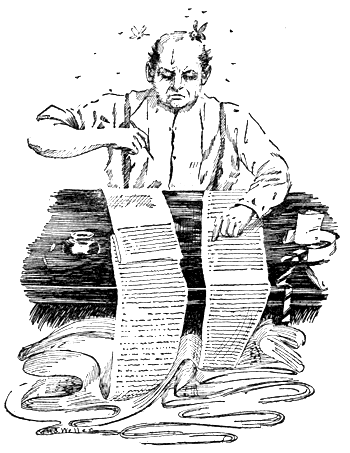
To write that invoice all over again * * * to get out of that was the determining factor
Sailing on a British ship with British troops, to say nothing of twenty million dollars in gold, with England and Germany at War, was no good place for a man of my peaceful proclivities.
I wasn't alone in these sentiments.
The purser, on that peaceful Sabbath day, put this question to the passengers: "Do you want to sail on this ship or go ashore?"
We might sail at our own risk. Anyone sailing was a belligerent. That question thinned the passenger list down to about a score. The most timid ones stampeded to leave the ship. I won first place at the ladder, but remembered that consular invoice and turned back, and one of our preacher passengers beat me to it and was the first one down the ladder.
He had spent his life preaching that Heaven was a desirable place, but he proposed to go there in God's good time. The purser, thinking he had missed me, put the question to me the second time.
With my teeth chattering with valor and my face blanched with the war spirit, to hide my real feelings I made reply: "P-p-please start your tank. I want to go home—I want to get there as soon as possible—I want to go home, I tell you."
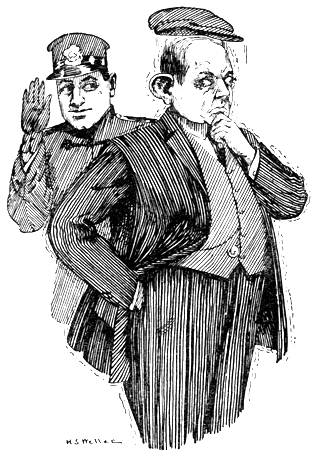
With my teeth chattering with valor
But I don't like this war game, and I decided right then and there if they sprung another one, if 236 they added another war risk to the ship for this voyage, I would shake it and go home via Japan.
We stayed in Bombay Harbor until next day at noon, to throw the Germans off her schedule, and she sailed out of her regular course to throw them off her route.
Nights we sail in darkness—her lights out and her wireless out of commission; sailing phantom-like, with no lights to betray her to lurking German cruisers, and by the same token, no lights to warn a ship sailing north and south from ramming her.
I had fully intended to write some travel stuff coming across from Bombay, but shucks! I haven't felt like writing travel stuff—couldn't seem to get down to it.
A speck on the horizon would knock any travel stuff out of my mind—that speck might grow into a German cruiser, and England at war with Germany, and no guns aboard to shoot with! Just a merchant mail ship with twenty million dollars in gold and British troops aboard.
From all the accounts we had been getting of German atrocities, if a German gunboat met with us, she would snitch that twenty million first, help herself to our coal second, and, third, sink us. 237
That was the consensus of opinion of the handful of English and French passengers aboard. The Arabian Sea is full of sharks, terrible, ferocious, man-eating sharks; and what with anxiously watching specks on the horizon, speculating as to whether those specks would develop into German cruisers, and wondering how salt water tasted, and whether a shark would get me on the way down, with these pleasant thoughts a man of my peculiar temperament couldn't write travel stuff.
I tried, I honestly tried, but only one measly little poem was all I could accomplish on this five days' passage coming across from Bombay to Aden.
I never attempt poetry unless my soul is stirred with deep emotions.
Eight verses were wrenched out of me, when a smudge of smoke was visible on the horizon, and the bets were ninety to one that a German cruiser had sighted us.
The first two verses of that poem went:
Your scribe he is a soldier nit,
Nor used to war's alarms;
He never died, or bled, or fit,
Save bugs upon his farms.
And when at last he went to war
On a big P. & O.,
He went to war, just only for
To get home quick, you know.
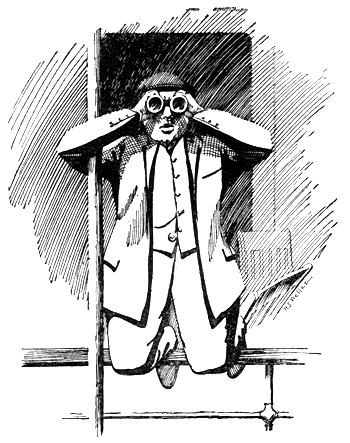
Anxiously watching specks on the horizon
And the next six verses were even worse than those two.
The smudge turned out to be an English merchantman, eastbound, as scared of the Germans as we were. There isn't a speck on the horizon in any direction, and with Aden almost in sight, in exuberance of spirit I wrote one more verse:
So whoop, hurrah, don't look askance,
He's sailing o'er the sea;
Doggone a man who'll take no chance,
"A chance for me," quoth he.
We will land at Tilbury (London) in an hour, and I have beaten the game with one shirt.
The English are great in many respects, but in nothing do they excel more thoroughly than in dressing for dinner. Now we, of the great American "proletariat," are not strangers to the dress-suit. We do, on occasions, don it.
At evening weddings we put it on.
When a town magnate gives an evening reception, those of us who are counted among the elect and get an invitation, put on a dress-suit.
Occasions of this kind may happen three or four times a year, and, to make sure that everything is in order, after the invitations are out and we have received ours, our wives, who are more solicitous about this thing than we men, dig up hubby's dress suit and give it an airing.
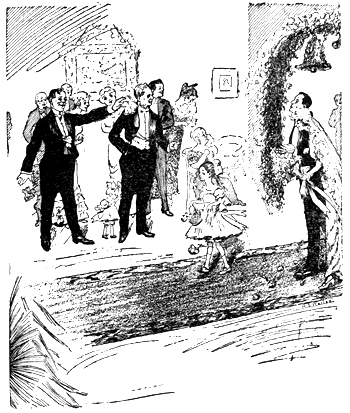
We do, on occasions, don it
Our dress shirt is sent to the laundry so as to have it fresh for the occasion, and a day or two before the event hubby gets into the spirit of the game, and at the earnest solicitation of the female portion of the house, submits to a dress rehearsal 242 to make sure that shirt, studs, special collar, tie and all the toggery appertaining to the deal will be in order at the last moment prior to the final plunge.
Now our English cousin's familiarity with the dress-suit breeds contempt—that is, contempt for any exhilaration incident to getting into the thing on state occasions.
While it is not a criminal offense not to dress for dinner, it is something in the nature of a misdemeanor, and a rigid rule prescribes the dress-suit for dinner.
Nowhere on earth is this rigid rule more thoroughly observed than on the P. & O.
I was not a stranger to this rule—the P. & O. and I are not strangers. Nor am I a stranger to the customs of the Far East.
As the years have gone by I have added to the dress shirt a sufficient number to take care of the situations one meets with on world tours.
When I got to Bombay I found that the strenuous dobes had practically annihilated all but one of my dress shirts, so I presented those wrecked shirts to Lal, along with my bedding purchased in Calcutta, for which I had no further use, to take back to Calcutta with him.
If Mark Twain were alive today I'd be willing to bet him dollars to doughnuts that the dobes had 243 succeeded in breaking stones clear across India with my dress shirts.
I had many things to do to get ready to sail on this ship, and one would have been enough—that consular invoice.
To lay in a bale of dress shirts was one of the items that should have been attended to, as I knew I was in for a twenty-two days' sail on a P. & O. to London; if all went well after boarding her.
But somehow, other things pressed more heavily.
I thought of the dress shirts several times, but I seemed to have a vague sort of an idea that dress-suits wouldn't cut much ice this trip, so I dismissed dress shirts with the idea that I had one, and the gloomy outlook was such that I must have decided that one shirt would last two days—three on a pinch—and that we were due to be sunk by that time, and if we were, a dress-suit would be of secondary importance to me—anyway I got aboard with only one dress shirt.
After clearing from Bombay for Aden, along about ten o'clock in the forenoon, the day slipped by without my realizing that I had started on a twenty-two days' voyage on a crack P. & O. liner with only one dress shirt.
The careful reader who has followed me in these travel letters will have gathered in my last that 244 dress shirts were not weighing as heavily on my mind as some other things.
It was a doughty lot of Englishmen, with a sprinkling of Frenchmen, that made up the passenger list, about a score of men. You might say it was a picked lot—sifted, as it were—English colonials going home to England for a holiday. Judges seemed to predominate—an especially good lot of fellows—and brave.
After tea that day (by the way, I've attended twenty-two "he" tea parties on this voyage, the Englishman's tea and his dress-suit are twin brothers), shortly after tea the bell rang to dress for dinner.
I had a hazy idea that the ceremony might be waived on this voyage.
I couldn't see any occasion to put on the glad rags—a handful of men, probably sailing to their doom—to get into gala attire seemed almost sacrilegious.
But every last man ducked for his cabin to get into his dress-suit.
Under the circumstances the Frenchmen wouldn't kick, no matter how they felt about it—they all ducked too.
I had no enthusiasm to dress for dinner.
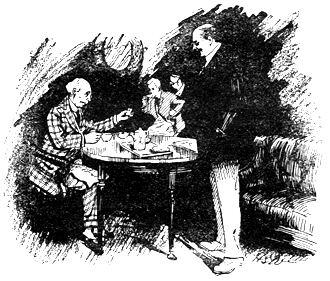
I've attended twenty-two "he" tea parties on this voyage
I felt, unless we were sunk, I couldn't play the game right more than three or four days with one shirt.
But I decided to be game and not cross a bridge till I came to it. I could hold out with my one shirt for three or four days and not be thrown overboard, and by that time we would all go down together.
After four days that shirt looked passe, not to say soiled.
No German gunboat had come to the rescue up to the time of the gong sounding to dress for dinner on the fifth day.
When the bell rang to dress that day I ducked with the rest of the boys.
I sadly looked at that dress shirt, shook my head, and took a turn up and down the deck.
No use, there wasn't a speck on the horizon; no hope of being sunk before dinner.
I went back to my cabin and turned that shirt around, and blossomed out with it hind side fore.
I was a little nervous at first, until after soup, but it went. Didn't occasion any remark or flutter, and I felt that I was good for four days more.
At the end of the second four days, eight days out from Bombay, we had passed Aden.
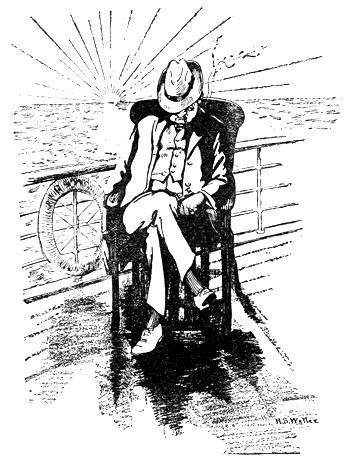
No hope of being sunk before dinner
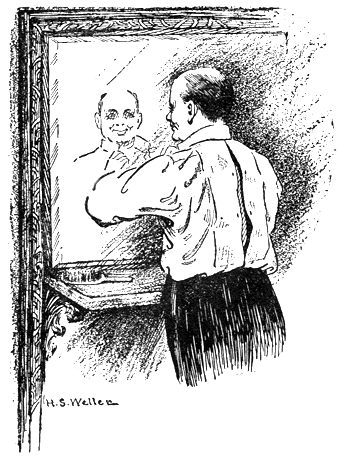
I turned that shirt around
We stopped there a few hours of a Saturday afternoon.
Everything was shut up—couldn't buy a shirt for love or money.
We were now in the Red Sea and no German gunboats had found us, as yet. By this time it wasn't the fear of German gunboats that was causing me anxiety. To dress for dinner with that bunch of Englishmen had gotten to be a mania with me, and there were five days more to Port Said before I could buy some dress shirts. My shirt would go one more time hind side to, but after that something would have to be done.
On the ninth day for dinner I turned that shirt inside out—and got by.
A mighty load was lifted from my soul. On a pinch she would last eight more days that way, four days inside out front to, four days inside out back to.
Safe for eight days more and we'd make Port Said in five!
We made Port Said all right—slipped past in the night; not so much as a fire-cracker to wake me up.
We were now in the Mediterranean, and Gibraltar our next stop—six days away. 250
Italy was still neutral. But I had got where I didn't give a tinker's dam about the neutrality of Italy—what I wanted was some clean dress shirts.
I'm ashamed to chronicle it, but all interest in the war seemed to dwindle with me. I was obsessed with one idea, one ambition—to make that shirt stand me until we could make Gibraltar.
Eighteen days from Bombay to Gibraltar, and I'd got by with sixteen of them. Two days more and we would be at Gibraltar, where I could get some dress shirts. There was no hope of being sunk, and getting out of it that way. The Mediterranean was as quiet as a duck pond.
I had found out by this time that the English would stand for anything in the shirt front, if the conventional dress-suit was on for dinner. So I contemplated that shirt fore and aft, inside and out, and used the best sides.
I was a good fellow and one of the boys. I had managed to dress every day for dinner, and while I felt like a thief in that shirt, it went, and I was accepted, and we got to Gibraltar.
But just before we anchored in the harbor at Gibraltar this notice was posted: "Only British subjects allowed ashore," and there were four more days to London!
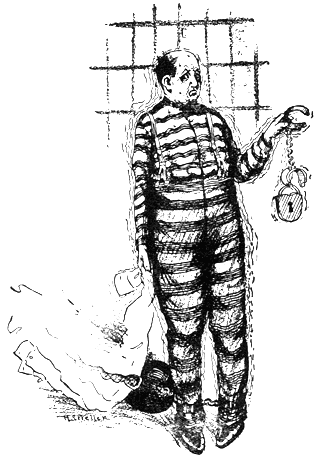
I felt like a thief in that shirt
I entreated the commander, I entreated the purser to give me a pass to go ashore.
They were adamant. The rules of war couldn't be broken. Only British subjects would be allowed ashore at Gibraltar.
I didn't wait for the gong to sound for dinner after leaving Gibraltar that day. Immediately after lunch I repaired to my cabin to consider my dress shirt.
Positively I didn't dare to risk it again. I was absolutely certain it wouldn't go another time on any of the four sides, and I was also just as absolutely certain that I was going to play the game right up to London.
Not dress for dinner the next four days on the P. & O. with my English friends? The spirit of Bunker Hill, Lexington, Cambridge, Ticonderoga, and the battle of the Oriskany fired my soul. With my jack-knife to rip, and some puckering strings, I went at it, right after lunch. I turned that shirt upside down—don't ask me how I managed. You can't stump a resolute man. I worked it—I won out.
We got up the Thames without striking a mine—I had no thought of mines.
I "dressed" for dinner the last day on board!
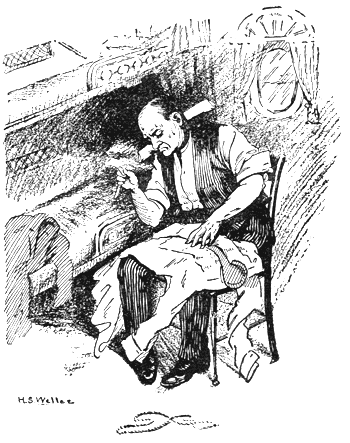
With my jack-knife to rip and some puckering strings I went at it
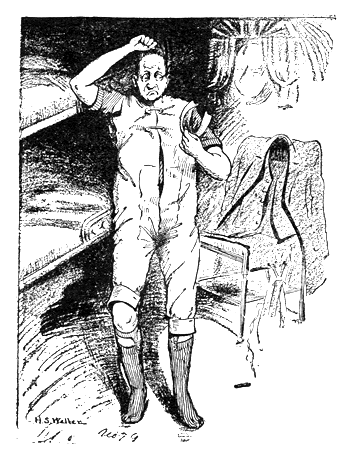
I turned that shirt upside down
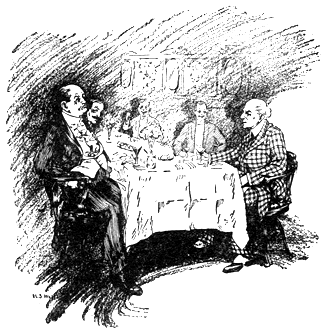
Also, I finally accepted his apology
A judge, an elderly Englishman who had sat opposite me all the way from Bombay, and who wasn't in rugged health, neglected to dress for that last dinner. He apologized profusely for coming to dinner "not dressed." Owing to it being the last day, his age and indisposition, his apology was accepted by the Englishmen at table.
Also I finally accepted his apology, but I never want to have an apology accepted in just quite the frigid manner in which I overlooked the judge's lapse.
Here, then, is the final travel letter I shall write on this world-girdling tour.
It is a woeful ending for the "sparkling gems" of travel stuff which have gone before.
It will record the sad contrast between my start from my native land, gaily sailing out of the Golden Gate, a de luxe first-class passenger, and winding up my joy-ride around the world by coming through Hell Gate steerage, barely escaping being condemned as a criminal and executed on the high seas, chucked overboard and fed to the sharks.
The lights and shadows of this wicked world are something fierce.
I am glad I made good my promise to try to write a little poetry before I came to this letter. I would surely never try to put it over in this one—it would be too great a strain.
Coming through Hell Gate steerage—
The next line might have to end with "peerage," and steerage and peerage don't mix worth a cent.
My first errand upon arrival in London was to lay in a stock of dress shirts. 258
But I didn't need any dress shirts coming across the Atlantic.
Indeed I didn't. What I needed was a good stout hickory shirt—a pair of overalls and double-bitted axe.
I don't suppose a writer of travel stuff on a debonair trip around the world ever had so much trouble as I have had the last eight days.
As I have already explained in letter XXVII, I held an order for a first-class passage on any American or British ship I might choose from England to New York.
With two dozen dress shirts, latest approved "Lunnon" style, safely cinched—I didn't propose to take any chances the balance of my trip, so I bought two dozen—I went to get that order changed for passage home.
"Why," the man told me, "we can't book you first cabin on anything sailing for America for six weeks. We can send you to New York steerage, on a ship sailing the day after tomorrow, if you speak quick. There are a couple of vacancies left. But you need not be afraid of steerage at this time. Owing to the war, the flower of America are going home steerage. The truly refined, the got-rich-quick, high-brows of the deepest dye, prize-fighters, captains of 259 industry, and card-sharps are all traveling steerage these days.
"Why, Mr. Allen," he said, "traveling steerage is a picnic now. Owing to the class of people who are patronizing it, everything is done by the ship's management to make the steerage journey home a pleasurable experience."
As I have never been able to get enough picnics—I am a fiend for picnics—I spoke quick. I said: "Book me now."
"And," the man told me, "there will be a rebate coming to you. The fare, steerage, is only seven pounds. You hold a twenty pound order."
"Sure," I said, "thirteen pounds coming my way."
"Oh, no, not thirteen pounds; but there will be something. Come around this evening and I will tell you how much of a rebate you will be allowed."
"Why not thirteen pounds?" I asked. "Over on our side the difference between seven and twenty is thirteen."
"Oh, yes," he said, "but the P. & O. won't stand for such an adjustment; but I'll do the best I can for you."
When I went to get my rebate I was offered one pound eleven shillings.
I told them to keep it; that nothing but a rebate of thirteen pounds looked good to me. "Furthermore," 260 I said, "if the line slips a cog this trip across and forgets to make steerage passage home one continual round of pleasure, if, perchance, I should feel like shaking steerage before we get across, I'll try to work the purser to let me eat first and sleep in the steerage. Coming home from Naples in the rush season, holding a first cabin ticket, I once had to accept second cabin berth, but was allowed to eat in first cabin."
I was willing to shake steerage at Liverpool before ever boarding the ship. A madder lot of Americans I never met, of whom there were about seven hundred, mixed in with about three hundred immigrants. Hours were consumed to get that thousand steerage passengers aboard the tender. No effort was made to separate them. The great majority being Americans with passports to be examined, immigrants and Americans were all held standing for hours in a hot, broiling sun, a congested herd of humanity, while the tedious task of examining the passports was carried on at the gang-plank—a task that could have been done in comfort in a large and commodious room on the wharf, where there were the accommodations for at least our women and children to be seated while immigrants and Americans were separated; after which both bodies could have passed on board in comfort and with dispatch. 261
But when we reached the ship, wow! a howl went up. We had consumed the biggest part of the day in getting from the wharf to the ship via tender, and we struck it at supper-time. Seven hundred Americans who had been told that steerage home would be a picnic!
Gur-r-r—"picnic!"
Filth! Stench! Vermin! Our illusion was dispelled.
Now there is a streak of yellow in almost everyone. Once in a while a noble, self-sacrificing character is born who had rather suffer with his kind than be delivered, like Daniel, and Joseph, and Moses, and who, by persistently sticking to exalted ideals, win out, so that all ages ring with extolling their characters.
But most of that kind die young.
There are moments when I feel that I'd like to be grand, and good, and noble, like Daniel, and Joseph, and Moses. Then the temptations of the world, the flesh, and the devil get in between and I slip back. Every time after slipping back from those noble aspirations and high aims a particular and special brand of hard luck strikes me. My heart beat in sympathy with that crowd of seven hundred Americans traveling steerage with whom I had cast my lot; but after the first meal I decided 262 that I'd try to shake them. So I went up first to ask the purser to let me at least eat first cabin.
"Purser," I said, "I am booked to travel home steerage—"—that haughty individual interrupted me with: "You're a third-class passenger, then, on this ship," and he looked at me as if I were an angleworm.
"Even so," I said; "but——" and I was reaching into my pocket to get at the document to prove to him that I had paid for a first-class passage.
He evidently thought that I was reaching to get my card, because he snapped out, "I don't care who you are, you're a third-class passenger on this ship."
"Yes, purser," I said, "but this"—handing him my document—"will show you that while I am booked steerage, I paid for first; and couldn't arrangements be made for me to sleep in the steerage and eat at the first table? You know, purser, it's just a little rocky back there in the steerage—and you see I paid for first-cabin passage."
There is no doubt but what that fellow could read, but he seemed so horrified at a steerage passenger invading the holy precincts of first cabin that he wouldn't attempt to read anything that had been contaminated by being in the possession of a steerage passenger. 263
Anyway, he handed it back to me without reading it, with the remark: "I've only got your word for that."
"Um huh, purser," I said, "and when it comes to a plain statement of facts, my word is good for even more than that."
"You're a third-class passenger on this ship, and you'll have to eat third-class where you belong," and further conversation with me seemed to give him a pain.
After that unsatisfactory interview with the purser, the high and holy self-sacrificing sentiments that I had had just prior to my desire to try and shake that bunch of steerage passengers—that part of my better nature that made me feel for the misfortunes of my kind returned, and I went back to the steerage, "where I belonged," to share their lot—it was either that or jump overboard.
There was just one topic of conversation back in steerage—the rotten treatment we were getting; and it was the voice of our little democracy that we ought to try and do something. I told you in letter II that one can make better time getting acquainted on shipboard than anywhere else, but you may have missed that wheat grain of information in the surrounding chaff. But it is there, and already there were those aboard who had learned 265 that I was doing newspaper work, so they wished the job of trying onto me.
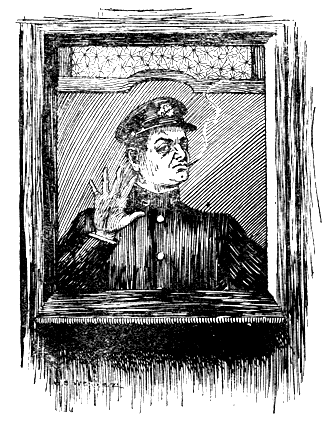
"You're a third-class passenger on this ship"—and further conversation with me seemed to give him a pain
If a protest and a petition for an effort to try and make things better, signed by a goodly number of us from the underworld who were American citizens, were sent up to the captain, it might mend matters, and wouldn't I draft it?
After my encounter with that purser—the purser standing high in the management of a passenger ship at sea—I had a fear that any petition we might make wouldn't be received with favor by the management, but my election for the job was so unanimous, spontaneous and hearty that I buckled to it and wrote a petition, in which I told the management what we American steerage passengers thought of what was being handed to us on our passage home. I told them we were steerage passengers not from choice, but owing to the fortunes of war, and instead of trying to emphasize the fact that we were steerage passengers, wouldn't they see what they could do to make us forget it? Furthermore, I asked in the petition if they wouldn't at least see that the stewards who served us our food put on clean clothes: that the white suits they wore were filthy when we left Liverpool, and that they were still wearing the same filthy suits. And also wouldn't they see that the dishes were given 266 an occasional bath—that the knives and forks they were handing us turned our stomachs. And couldn't we have ice water to drink? Even had the temerity to suggest that they give us napkins—qualified the suggestion of napkins by telling them paper ones would be counted a boon.
I read my petition to the crowd and it was loudly acclaimed a choice bit of literature, right to the point, and exactly fitted the case; and they crowded around to sign it, and wanted me to get it into the captain's hands as quick as I could. I went up to first cabin to hunt for the captain and ran into the purser. When he saw me coming he looked even more aggrieved than when he told me to stay where I belonged. But I told him this time I came with a petition, signed by several hundred American citizens, and that I wanted to give it to the captain.
"We're in a fog now and captain is on the bridge; I'll give your petition to him when he comes off the bridge," the purser said.
"All right, purser," I said; "and you needn't return the petition to me. I've got a copy of it and a copy of all the names of the signers." And I went back to steerage, from choice now. I fear that I've always set too great a store on ease and luxury—asceticism has never appealed to me as a personal practice; but it would have taken a roll of money 267 to have hired me to shake steerage now. My better nature, or something, had triumphed, and my lot was cast with that down-trodden, forsaken, and hopeless crowd of steerage travelers. A revulsion of feeling for first-class on that ship had filled my soul. They couldn't have hired me to travel first-class now. When I got back "amongst my own people" I was the recipient of so many tales of woe—I was so filled up with steerage passengers' grievances, that if my interior had been analyzed it would have looked just like the bureau for the amelioration of troubles at San Francisco after the earthquake.
Shake that bunch? Nay, nay. In my contrition of spirit I concluded that what I was getting was just retribution for ever trying to do such a thing; and I feared if I should let go and make another attempt to do it, something worse might come to me—although I couldn't figure out just what it could be. Besides, after that petition reached the throne, I'd be in bad with the ship's management, and another attempt to get away from steerage would be futile.
My-o! but that was a forlorn lot of passengers traveling steerage.
Our chief aversion was "Beef," chief steward of steerage (he was dubbed "Beef" by the sufferers an hour after we got aboard). He was big, beefy, 268 brass-buttoned and shoulder-strapped, evidently hired by the line for his ability to drive over-worked stewards and handle immigrant passengers.
Almost immediately after boarding the ship he had earned the indignation of the Americans by insulting one of our country-women, a woman of refinement and culture, who was traveling alone—the wife of a banker. When she protested at the deplorable condition of the dishes, he stormed up to her and asked her what was wrong. "Why," she said, "you don't expect us to eat our meals off such dirty dishes, do you?"
"You're no better than immigrants, and you'll be handled as such," "Beef" said. And when she told him she would report him to the captain he bellowed out most insultingly: "Go ahead and report; we aren't afraid."
Subsequent events proved that "Beef" had no cause to fear the captain.
It was not a nice way for a servant of a transportation line to talk to any patron, immigrant or otherwise, voicing a just protest, and especially not to an unprotected lady traveling alone, subject to the care and courtesy of the transportation company she was traveling with.
Indignant? Oh my! I should say so. 269
If indignation could sink a ship, we'd never have got across.
As Chairman of the Protest and Indignation Committee, all that indignation was poured into me. I didn't know I could hold so much. And still it came. One woman wanted to sue the company when she got home for a million dollars, and she came and asked my advice about it. I told her I wasn't a lawyer, but being Chairman of the Committee on Protest and Indignation, I told her to state her case. She said she was going down a darkened stairway to the noisome, filthy quarters where they had to sleep; the stairway wasn't lighted and in consequence she fell down stairs and was picked up for dead, jarred, bruised, broken and bleeding profusely. The ship's doctor attended her injuries and charged her two dollars, and she wanted her two dollars back and a million on top of it.
Speaking from underneath the load of other people's woes I had aboard, to say nothing of those of my own, I told her she had, in my opinion, a just claim. To sue the company when she got home—this last advice I threw over my shoulder at her, as another woman was dragging me off to investigate the "awful condition" below deck where they were herded to spend the nights. 270
And still the indignation grew and grew. Our petition hadn't bettered matters.
We were steerage passengers—just that and nothing more, and if there wasn't some new, fresh, sensational bit of steerage news to tell there was always "Beef" and his insults to discuss.
One evening as curfew rule was being enforced (it seems there is a law that demands that female immigrants en route to the United States shall be ordered below deck at 9 o'clock), as this rule was being applied to our steerage passengers, both Americans and immigrants, and as they were being driven to the filth and stench and vermin below, indignation boiled over again.
One young fellow whose wife was driven from his side, swore like a pirate, but had to submit—we were steerage passengers.
"Beef" was boss of the steerage, and as he was standing near, to voice our indignation, I said to the men who were allowed to stay on deck: "Men, if any of us catch an officer on this ship insulting a woman, whether she is American or an immigrant, no matter how many shoulder straps or brass buttons he wears, I propose we knock him down, and if he is too big to handle with our fists, take a club." That little speech was for "Beef's" benefit—but things didn't mend.
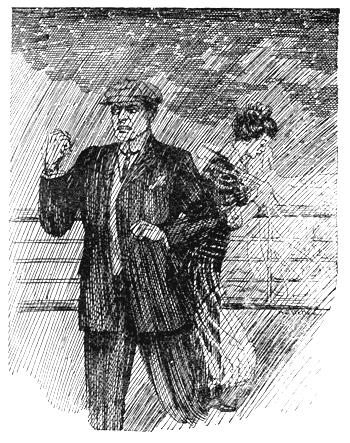
He swore like a pirate
The well deck was the outdoor privilege for steerage passengers, set nine feet down in the hull of the ship, forward the poop deck and aft second cabin promenade deck, with a railing across the latter to prevent cabin passengers falling off into the well deck. All view available for steerage passengers on the well deck was up into the sky—whence we might look and pray for deliverance. We could sit on the bulkheads that formed a part of the floor and lean our backs against the wall, which our women folk did.
Cabin passengers up top side would lean on that rail and spit on us! And they complained to me about it—of course they did—to whom else should they tell their troubles?—wasn't I Chairman of Committee on Complaints? I was, and it was another case of "Let George do it." There was no one to appeal to but "Beef." Captain and purser held aloof and wouldn't answer our petition.
I didn't have much hope in approaching "Beef" after my proposition of the night before at curfew—"Beef" knew I was driving at him—but I thought of Moses and how he had to appeal to Pharaoh, of the stony heart—what little I knew of the career of Moses was especially comforting to me—but since I'd been purged of the streak of yellow in me that prompted me to try and shake my steerage 273 friends I was willing to do anything; so I went to "Beef" and said: "Say, those low-brow cabin passengers along the rail up top side are spittin' on the ladies and gentlemen down here in the steerage!"
The enormity of the outrage didn't faze "Beef." Cabin passengers had the privilege to spit on steerage. He wouldn't do anything. All the attention he paid to the complaint was to look at me and say: "I don't consider you're a gentleman."
And I told him if in his opinion I was a gentleman I'd go and hang myself.
And the indignation grew and grew.
All the comfort there was on hand was to lodge complaints with me and to express the hope that I'd do justice to the situation when I got home.
"Don't forget to tell about the rats, Allen," a man from Maryland piped up.
"Yes, touch up the rats," a man from Iowa admonished me, while a man from Kentucky said he had become so innured to hardship he didn't mind the rats so much, he could stand their running over his face nights, if they would only hurry across.
"Yes," a man from Massachusetts plaintively wailed, "it is hard when they loiter, isn't it?" While a man from Florida said that he didn't mind their feet so much—it was the dragging their tails across his face that got onto his nerves.
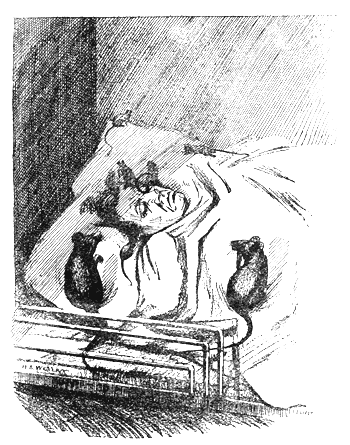
"It is hard when they loiter, isn't it?"
"And don't forget to tell how they served us those little, pithy oranges that day, Allen," a man from California broke in.
This was hardly worthy. The man who lodged that complaint ought to have been ashamed of himself, and his ingenuity for finding things to kick about was of a low order—he was straining at a gnat and swallowing camels.
It's true the stewards brought them on in their dirty aprons and pitched them at us—not the stewards' fault, they were doing the best they could with the tools furnished them—but steerage passengers ought to be grateful for any kind of oranges, served in any shape. While it's quite true, in my adolescent years, as a boy on the farm I have fed apples to hogs with the same courtesy, the complaint was too trivial to be spread on the minutes of the meeting. But it was voted to spread it, hence the mention.
Before the meeting adjourned, under the head of "New Business," a portly judge advised that the petition sent to the captain be rewritten and signed again with the home addresses of all signers opposite their names, and that I take the resigned petition home with me. Some of the ship's letterheads were pasted together until we had a sheet nearly five feet long on which to rewrite the petition, and 276 on both sides of the paper there was not enough space to hold the signers' names, and an overflow sheet had to be supplied.
The next day all steerage passengers were subjected to a medical examination. Americans examined on deck—immigrants in the dining saloon.
A brother-in-tribulation, "New York," and I, after we were released from the examination, started down a noisome alleyway to go to our cabins, and we had to pass through the dining-room, where immigrants were being examined. We were in "New York's" cabin when a dining-room steward came to us and told us he had been sent to tell us to go on deck; that we were holding up the medical examination. No steerage passengers were allowed in the cabins until medical examinations were completed, he told us, and that he was ordered to tell us to go on deck.
We had gotten so used to being ordered up and down and in and out that we obeyed like dumb driven cattle. As we were about to pass through a companionway to get on deck, dining-room stewards guarded it and told us we couldn't go on deck. "New York" was ahead, and paid no attention to the contradictory order. They let him pass, but when I followed, one of the guards took hold of my arm to stop me, and I brushed past him. He fell 277 down and began to howl before he struck the deck. I joined "New York" on deck and told him I suspected a frame-up, and that I would hear of it later.
Sure enough, in about half an hour "Beef" hove in sight and told me the captain wanted to see me in the purser's room.
"Glory be, 'New York'," I said, "let's shake the nether regions and go up first and see the captain. I've an invitation to meet him in the purser's room. We've been wanting to see that fellow ever since we left Liverpool, and I invite you to go with me as my guest."
"Only Mr. Allen is wanted," "Beef" vouchsafed, but "New York" didn't pay any more attention to him than if he'd been a toadstool—I was going to say mushroom, but I like mushrooms—and together we went to pay our respects to his nibs, the captain, "Beef" following on behind.
As we neared the purser's room we passed the entrance to first-cabin dining-saloon, and as we saw the luscious fruits and viands prepared, and took in the luxurious surroundings, we clasped our hands and simultaneously exclaimed: "Is this heaven?"
I was ushered into the purser's room, "New York" sticking to me closer than a brother. There sat his nibs, the captain, togged out with enough 278 gold braid to scare a horse. The purser stood at his side, and "Beef" came in. There were some chairs in the room.
My! but those chairs did look good to "New York" and me. Neither of us had sat on anything soft for nearly a week.
An irresistible impulse to sit down on something soft seized us, and, unabashed in the presence of all that gold braid confronting us, we were about to sink into their luxurious depths when his royal gazooks, with an imperious wave of his hand, bade us remain standing in his presence. It was really an awful break on our part—we should have waited for him to have invited his guests to take a seat, but we were so dazzled and dazed by the sudden transition from steerage to first that we were momentarily shy a few buttons on the niceties—and besides, we wanted to sit on a cushioned chair—we ached to sit on a cushioned chair, I'm telling you, but we didn't—I thought of Lal and stood.
It was up to me to stand—I was up for trial before the most absolute monarch in the world, the commander of a ship at sea.
He asked me my name, and I told him.
"You are charged with assaulting an officer in the discharge of his duty," he said. "What have you to say for yourself?"
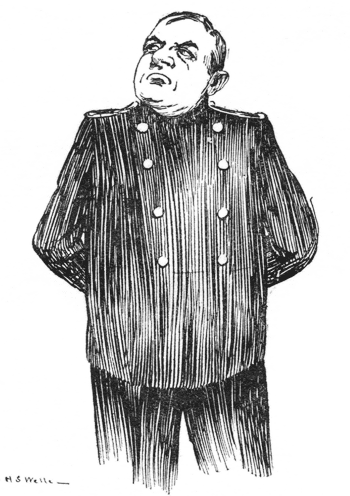
And "Beef" came in
I told him the circumstances, "And, captain," I said, "that chap fell down mighty easy, and began to howl before he struck the deck."
The captain ordered the damaged steward to be produced.
The purser and "Beef" had him on tap, around the corner somewhere, and "Beef" led him in limping and sniveling.
"Did this man assault you?" the captain asked, pointing to me.
"Yes, sir, captain, 'e did, sir, thank you, sir. Hi was guardin' a door accordin' to horders, sir, and 'e pushed me over and I got an awful bruise, sir, thank you, sir."
According to the evidence, I was the one to thank, but I guess he got his thanks bestowed where they belonged, all right.
"Beef" explained that the man was badly hurt and under the doctor's care, and he turned him tenderly around so the captain could see where his pants had come in contact with the deck.
And those pants did look bad, there was no doubt about that.
"Yes, yes," the captain said, in a commiserating tone, "the man is undoubtedly severely injured."
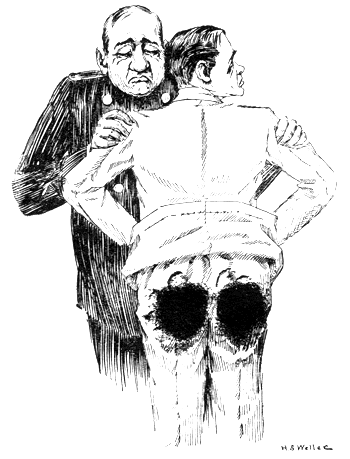
And those pants did look bad. There was no doubt about that
"Yes, captain," "Beef" said, "and the other night at curfew, out on the well deck, Mr. Allen made a 282 speech and advised a lot of steerage passengers to knock down officers on the ship, no matter how many shoulder straps they wore."
This was a serious charge—mutiny on shipboard—and punishable, I am informed, with instant death.
With a shuddering gasp at the enormity of my crime—or was it ghoulish glee at having sufficient evidence to have me drawn and quartered—I credit him with the latter sentiment—a human being who would keep two free-born American citizens standing in his presence—men whom he knew had been living steerage on his ship for nearly a week—with those chairs standing tantalizingly, invitingly empty—the wearer of all that gold braid, lolling luxuriously in an easy chair, filled with such viands as "New York" and I had seen coming through—I'll never believe that man would shudder at crime. Rather, I think he was gloating over my ignoble end, and devising ways of still more horrible torture—that's the kind of a man I think that captain was, and I'll bet on it.
But according to the rules he didn't dare pass sentence without giving me a hearing. While he was judge, jury and prosecuting attorney, he had to give me a chance to clear myself, so he asked me what answer I had to make to the charge. 283
"Well, captain," I said, "'Bee—'—I mean your chief of steerage, hasn't got the story straight. At an indignation meeting out on the well deck the other night, as he has insulted women on this voyage, after he had ordered the women below decks at what you call your curfew time, I voiced the sentiments of the male portion of your steerage passengers by advising that if any of them caught an officer of the ship insulting a woman, whether she was an immigrant or an American, no matter how many brass buttons or shoulder straps he wore, to knock him down; and if he was too big to handle with the fist, to use a club."
"Beef" jumped up and shook his fist at me and bellowed: "If Mr. Allen says I've insulted women, he's a liar."
Right here is where "New York" shone.
"I would like a word here, captain," he said. "Mr. Allen is stating facts. Your chief of steerage has insulted women on this voyage."
That "impartial" judge, that embellished emblem of authority, said he had known "Beef" for a good many years, and he knew he wouldn't do such a thing, so, according to "Beef" and the captain, "New York" and I were both liars.
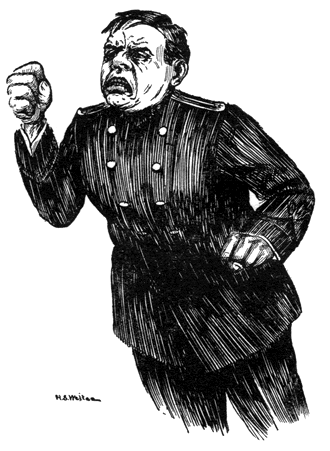
"If Mr. Allen says I have insulted women, he's a liar"
Then that bedizened judge turned on "New York" and said: "You look like a clean-cut, up-standing 285 man" (this last was the unkindest cut of all; it's a compliment to have some men call you a liar, but he needn't have used that word "up-standing"; Lord knows, "New York" didn't want to stand up)—"how do you explain your associating with such a person as this man Allen?"
And then "New York" shone some more. He told the captain that he had found Mr. Allen a most agreeable and congenial companion on this voyage.
Oh, my! How this story does string out. I suppose "New York" saved my life. With "New York's" testimony the captain didn't pass the death sentence—he dismissed us with a magnificent wave of his embroidered coat-sleeve—the steward didn't die, but peeled potatoes, and I'm in New York, and Clinton only five hours away.
The End